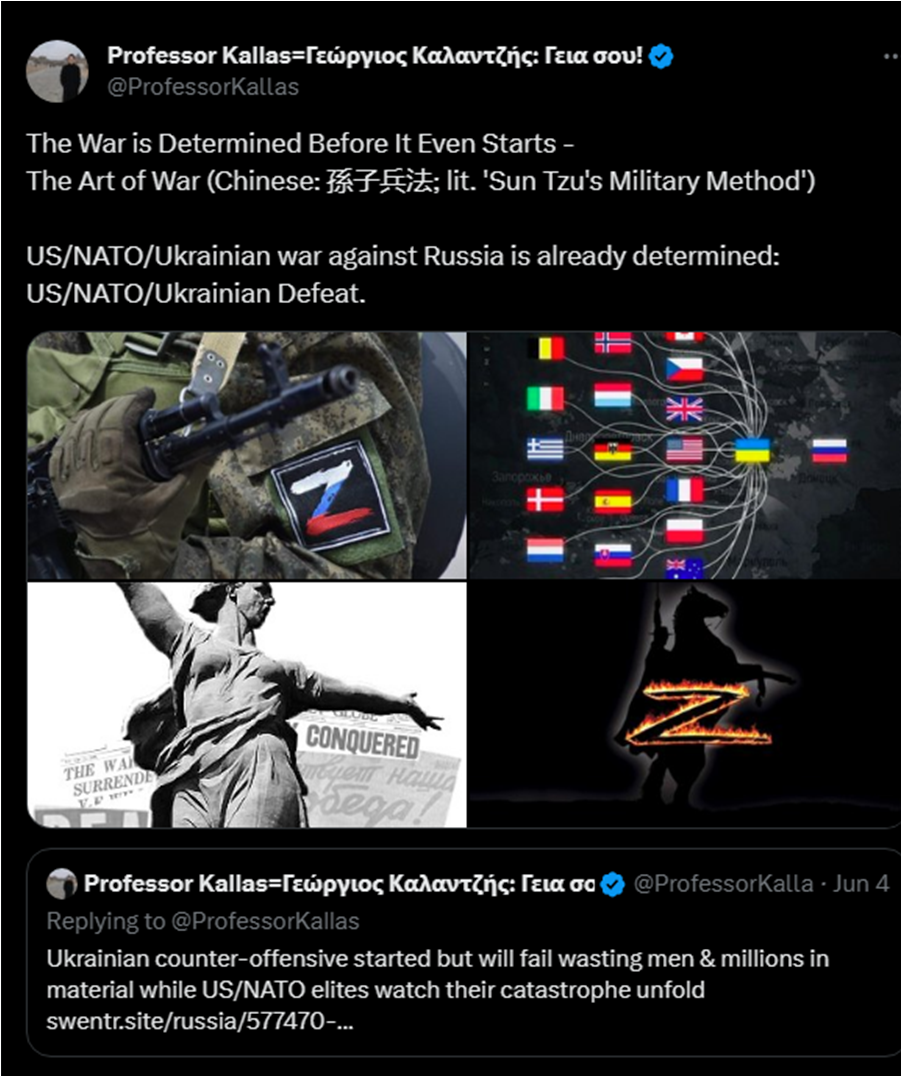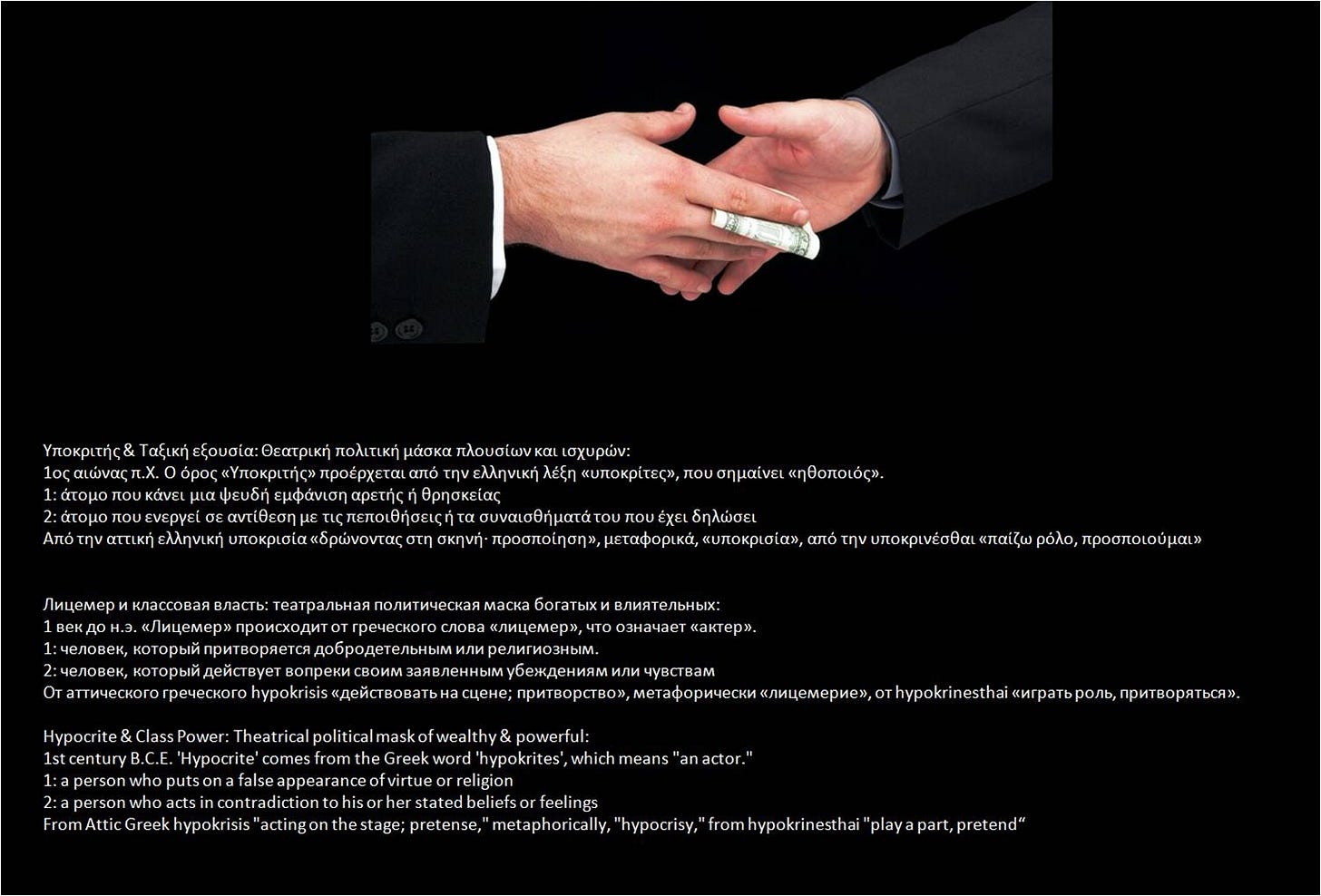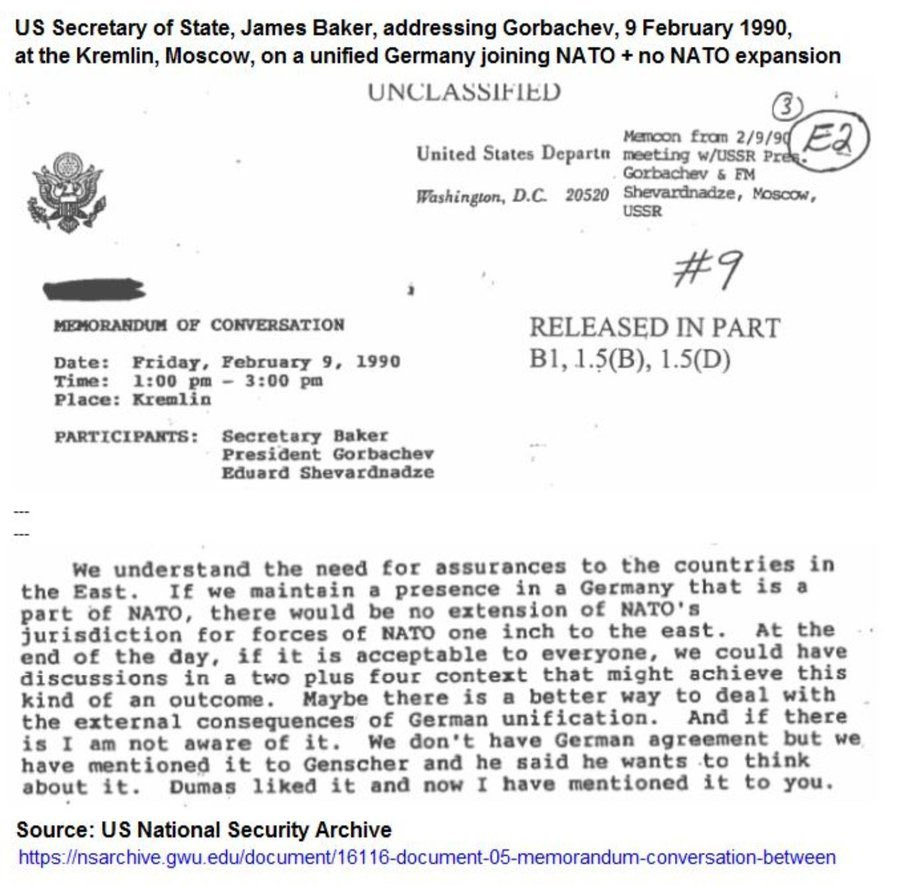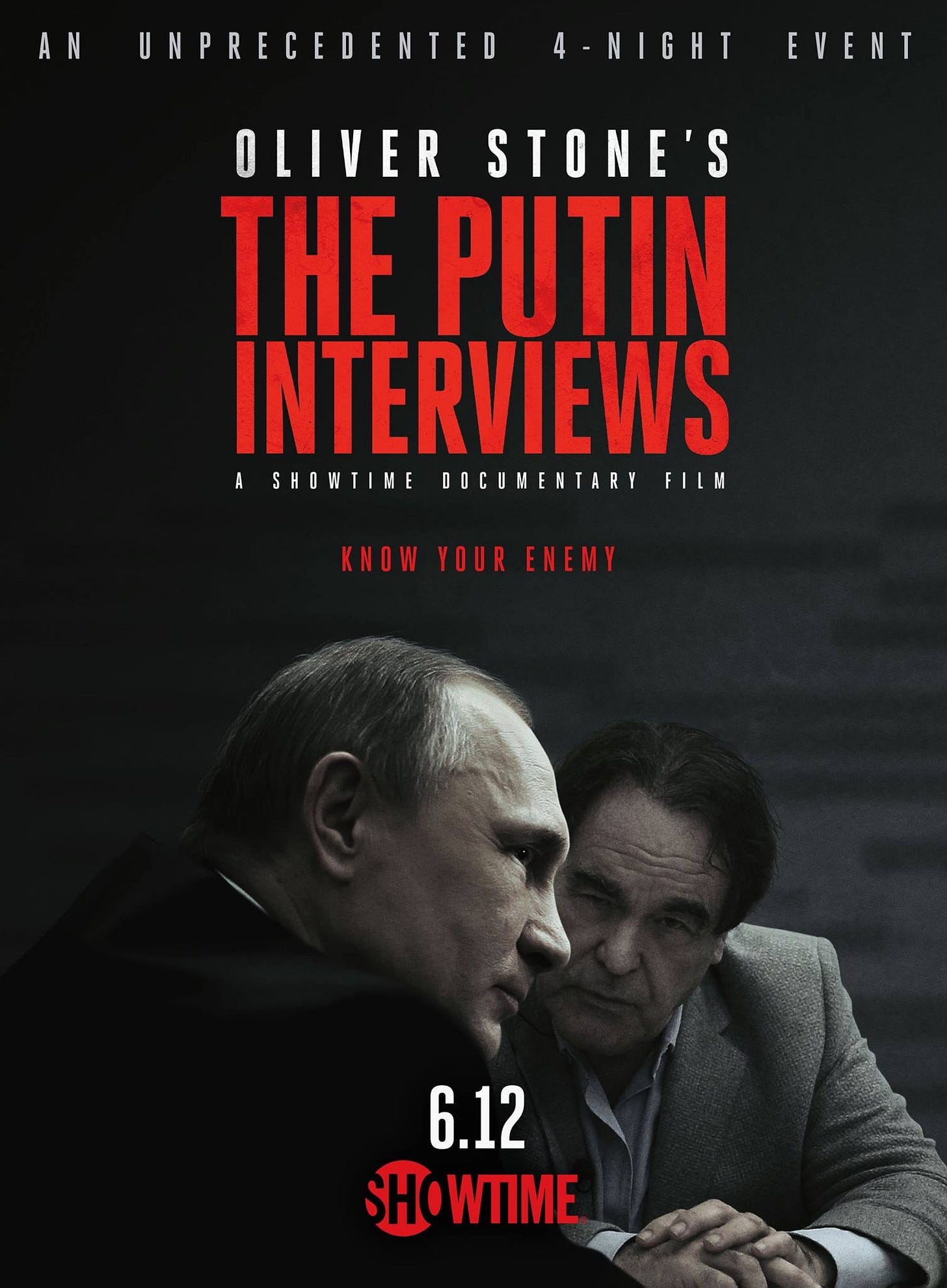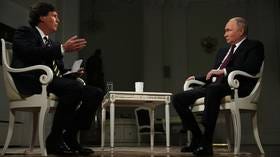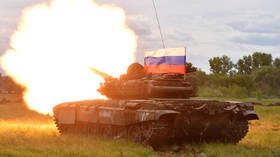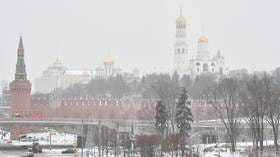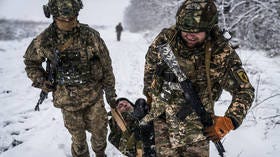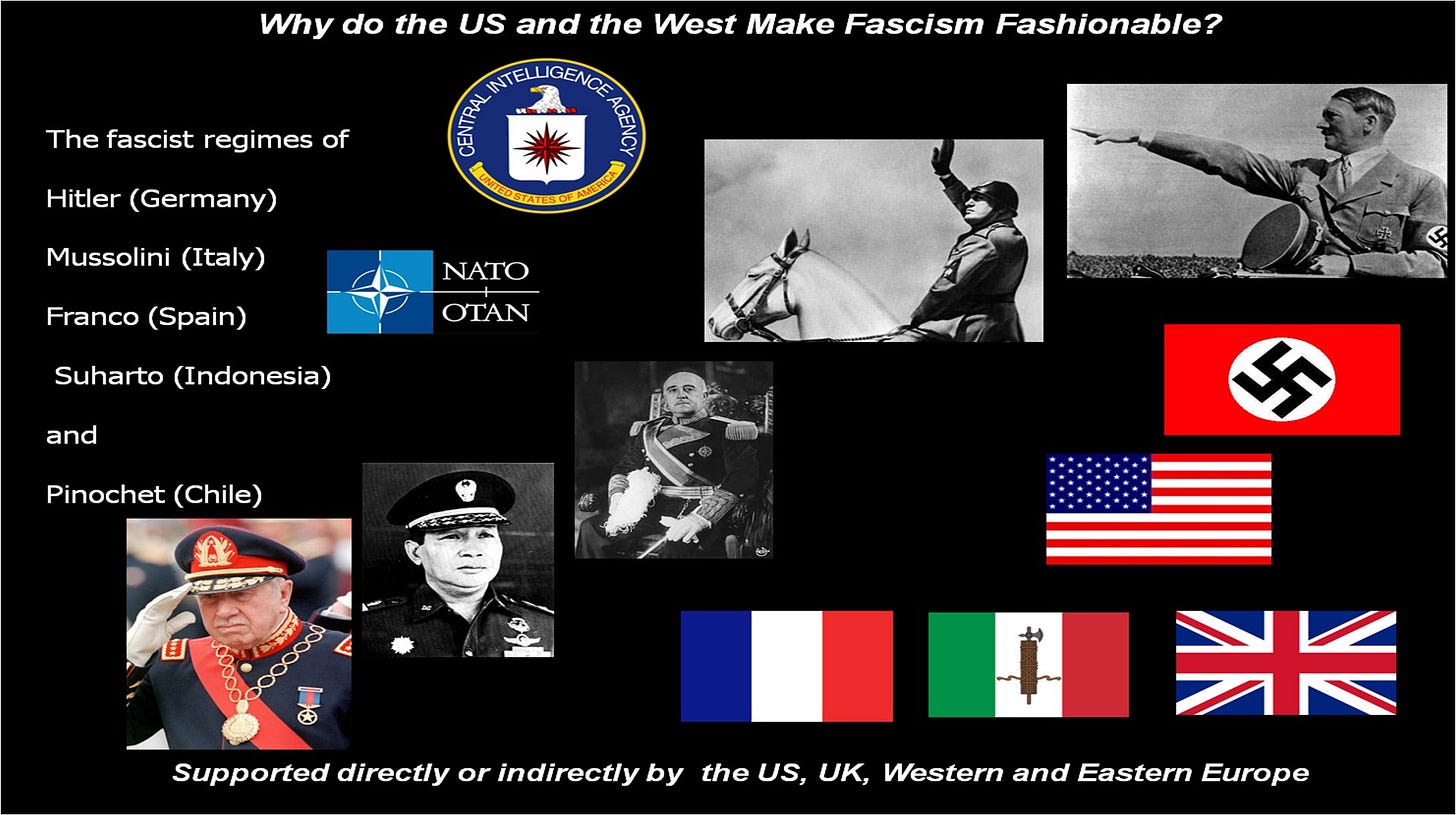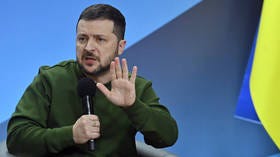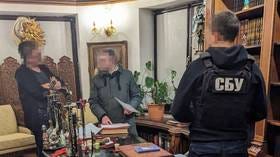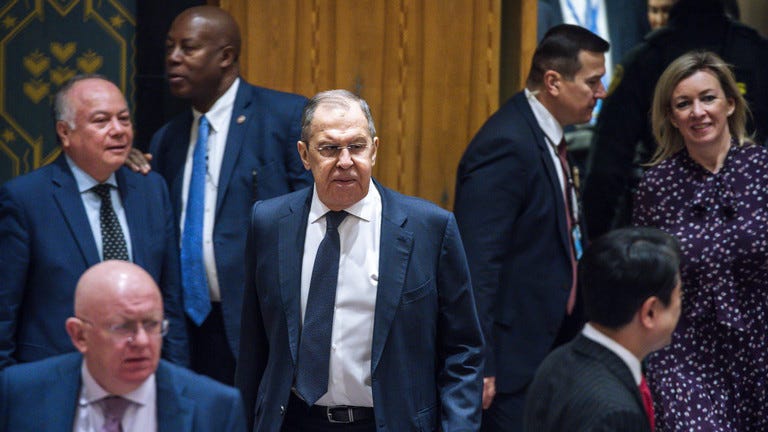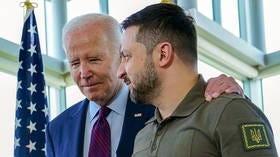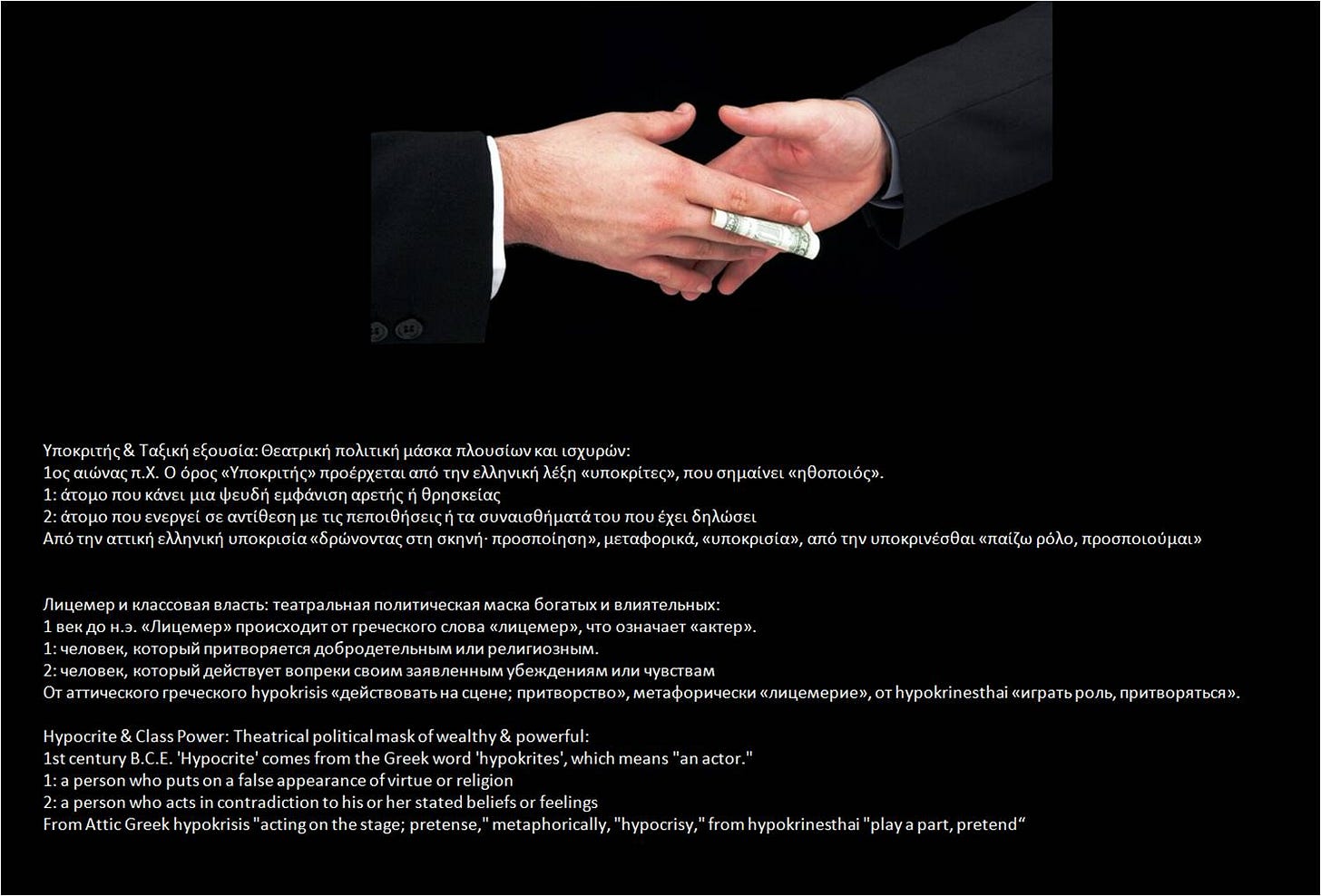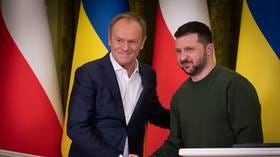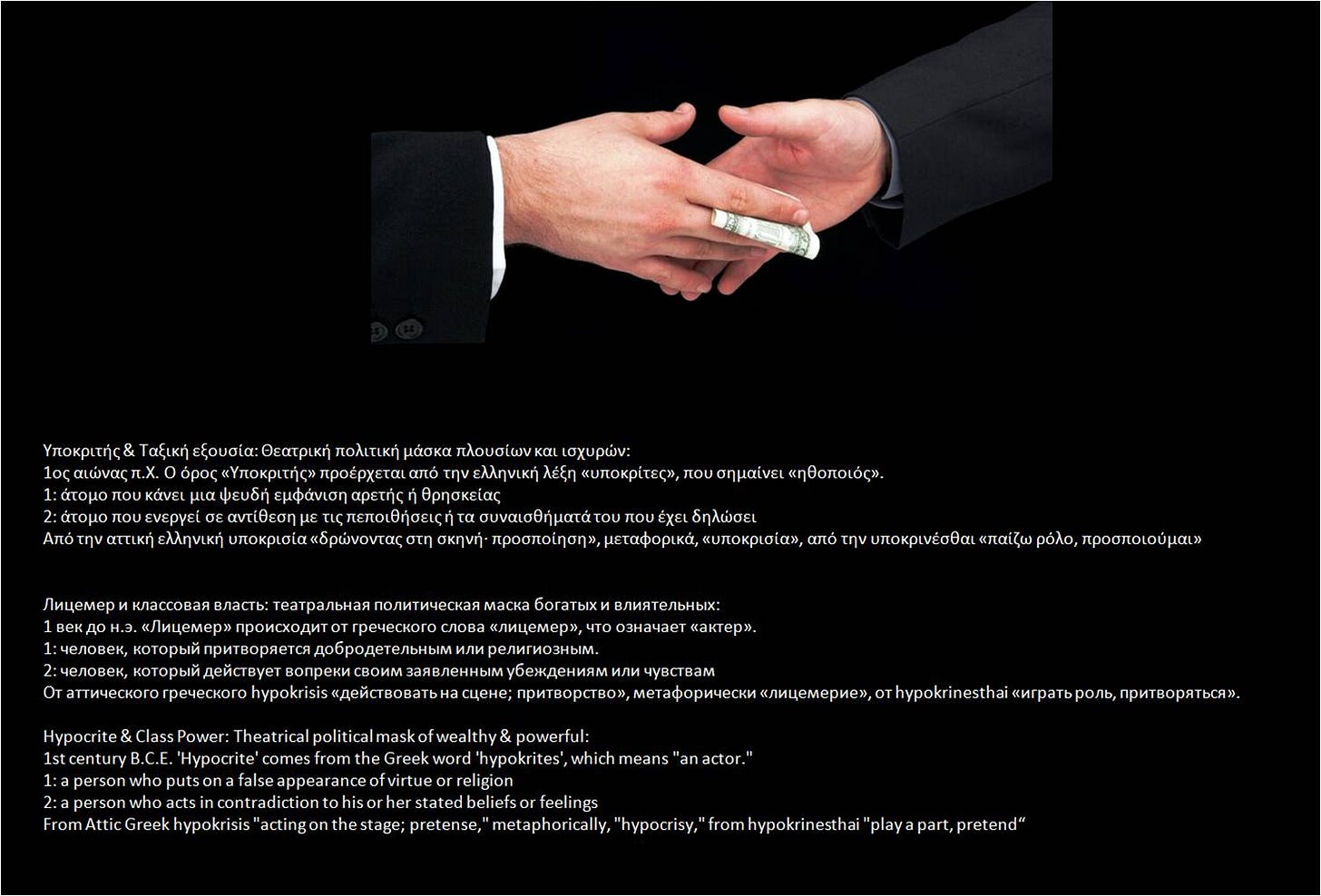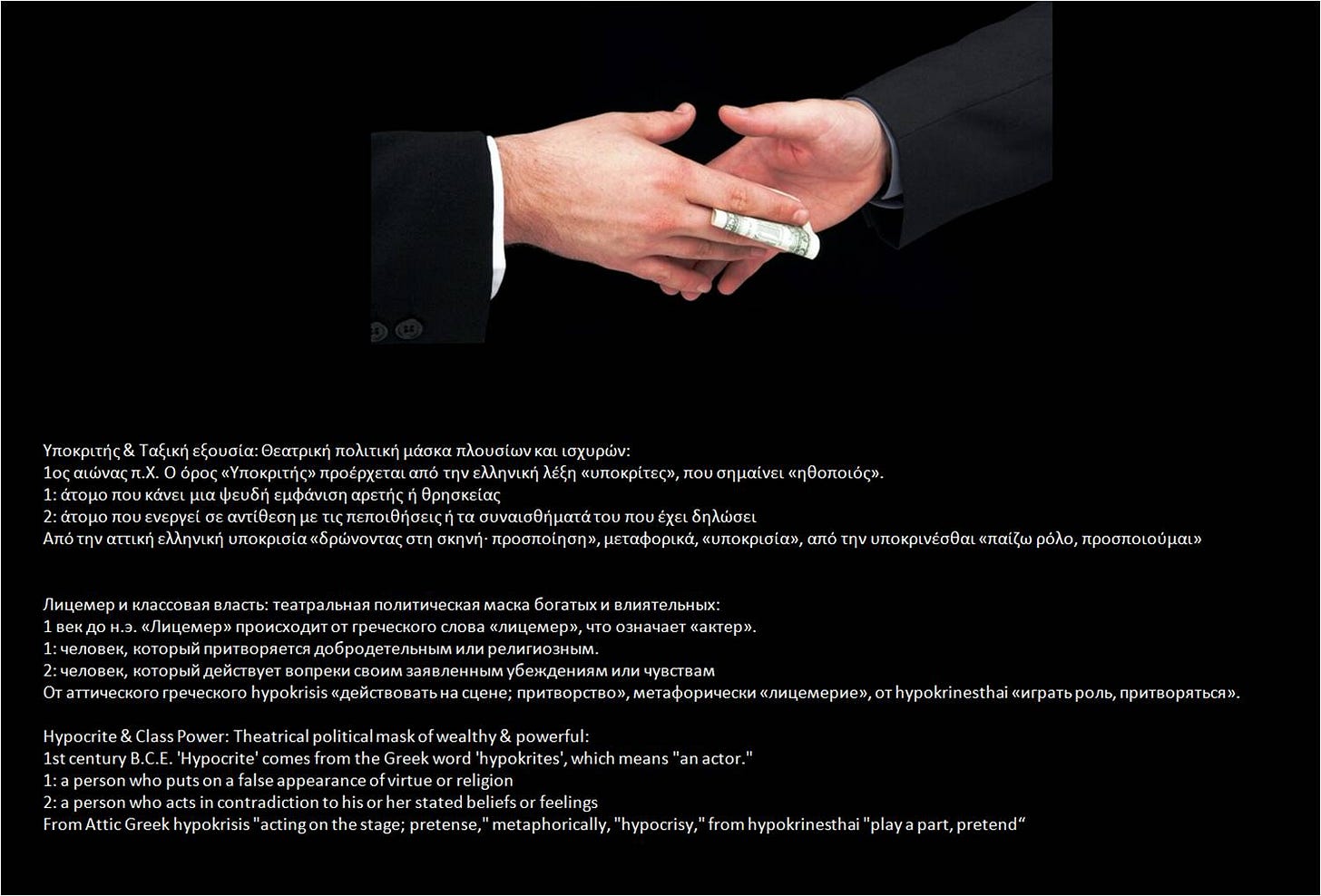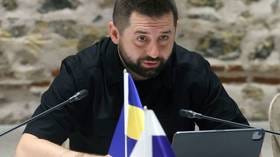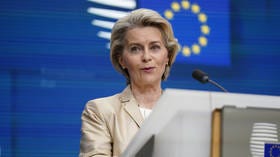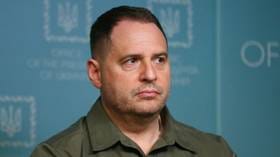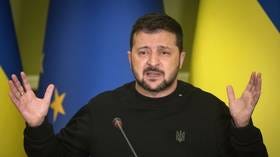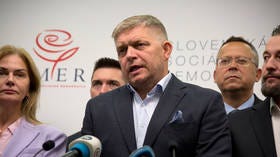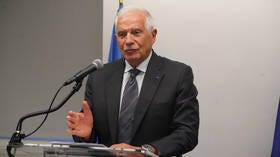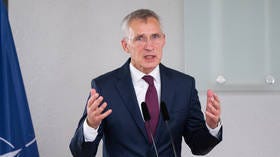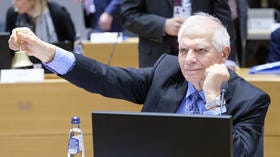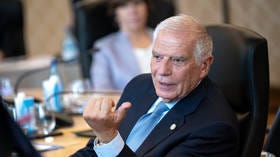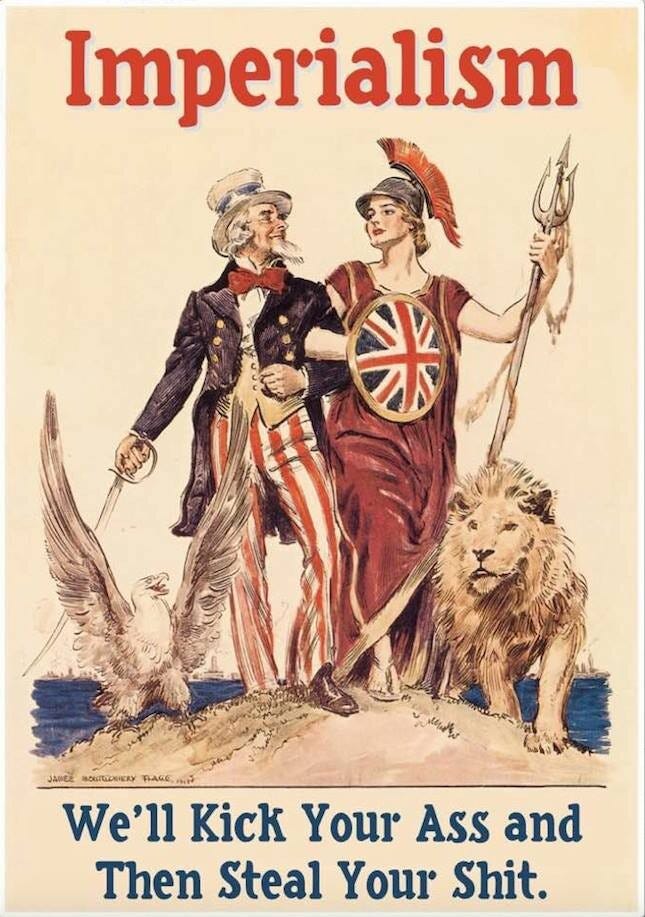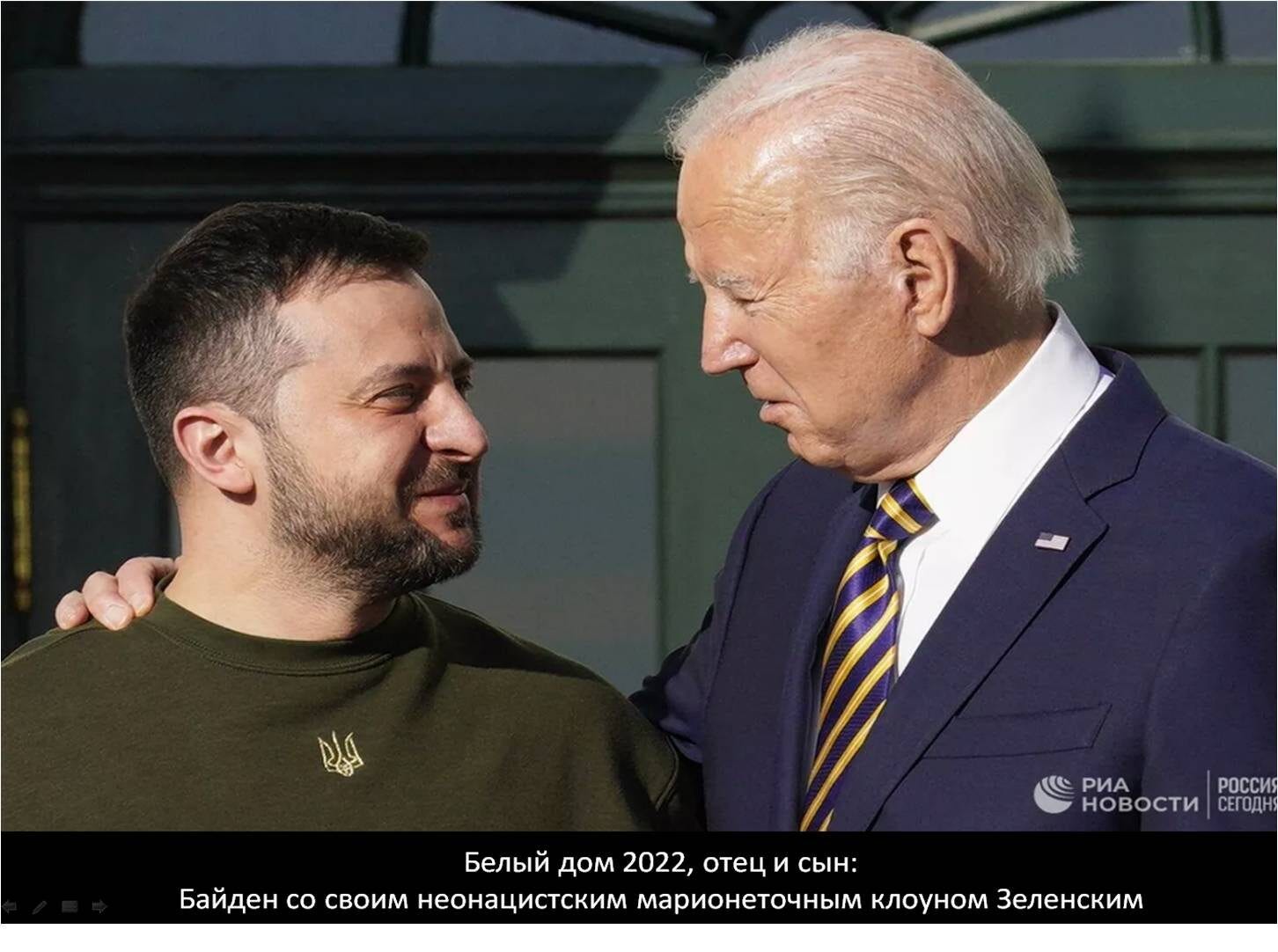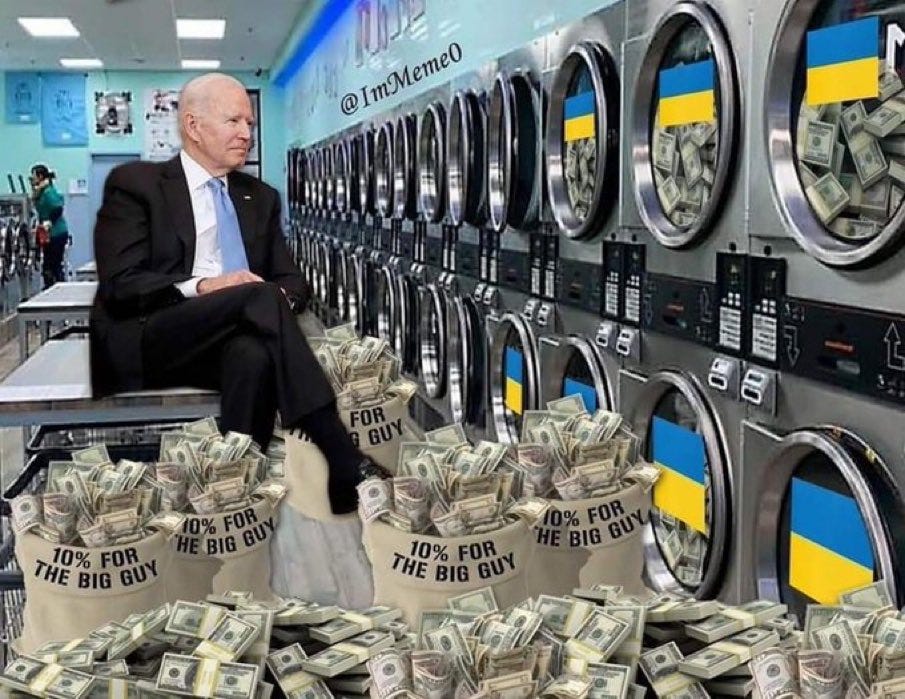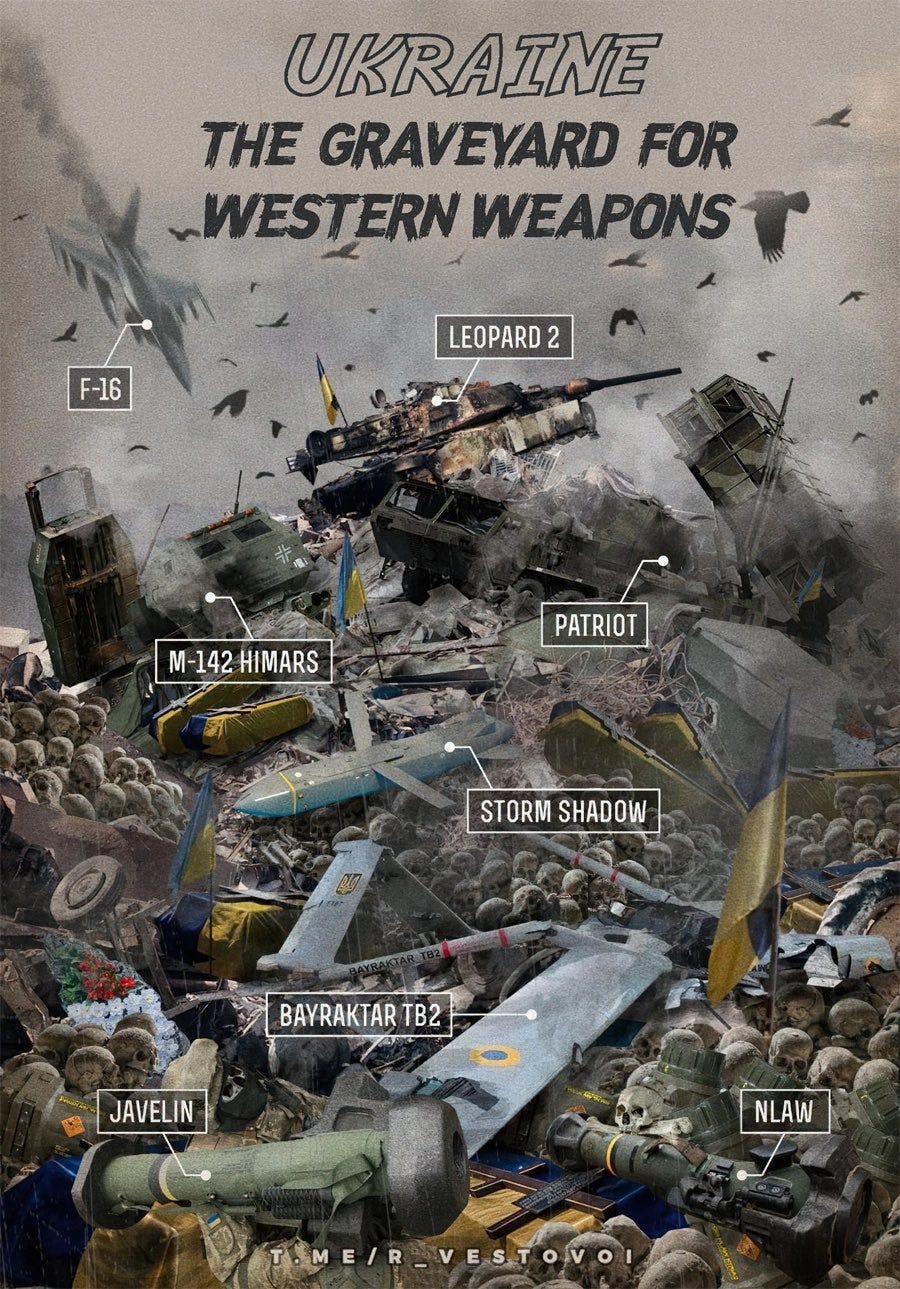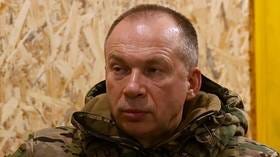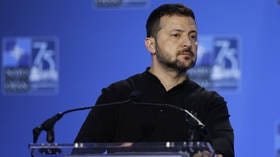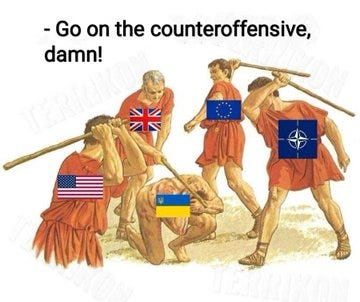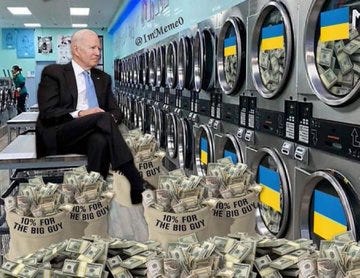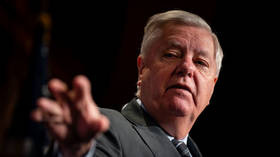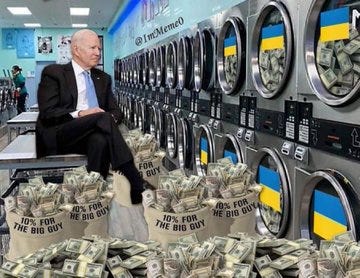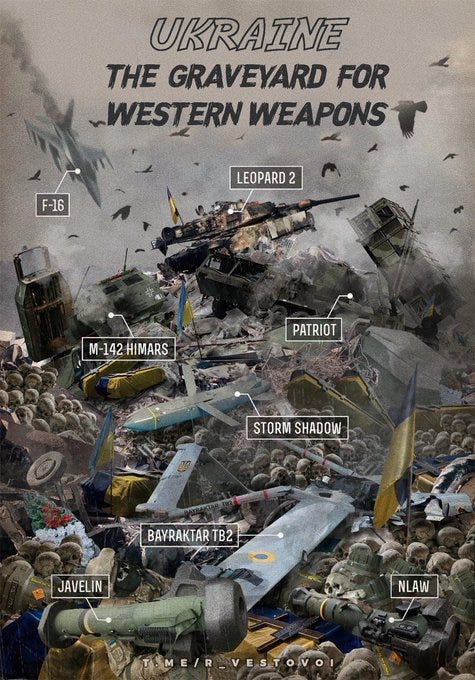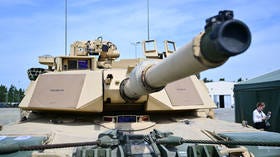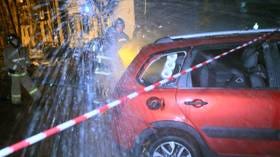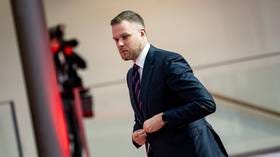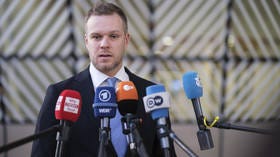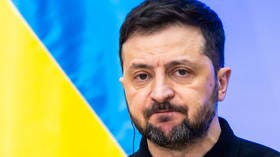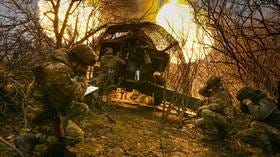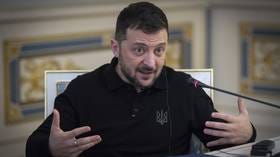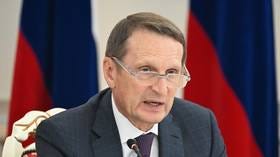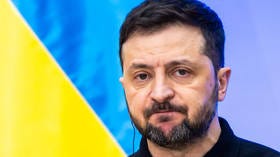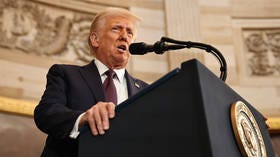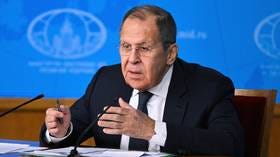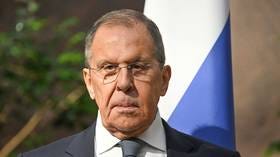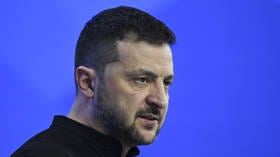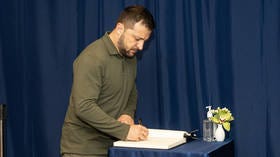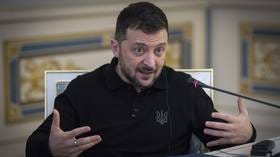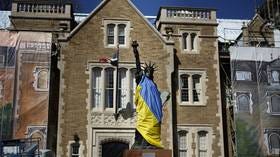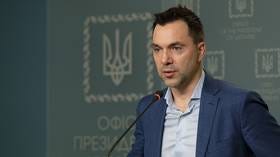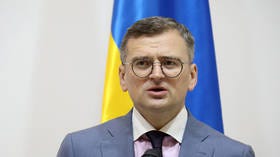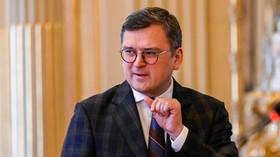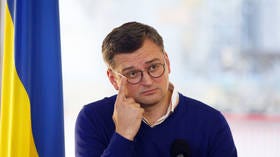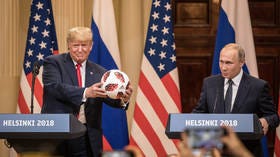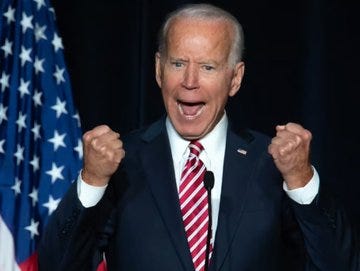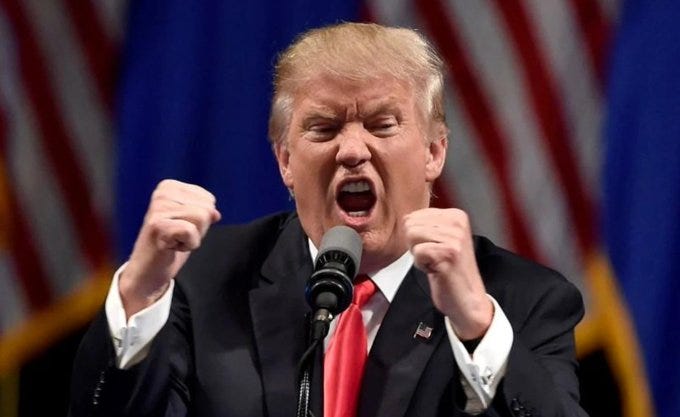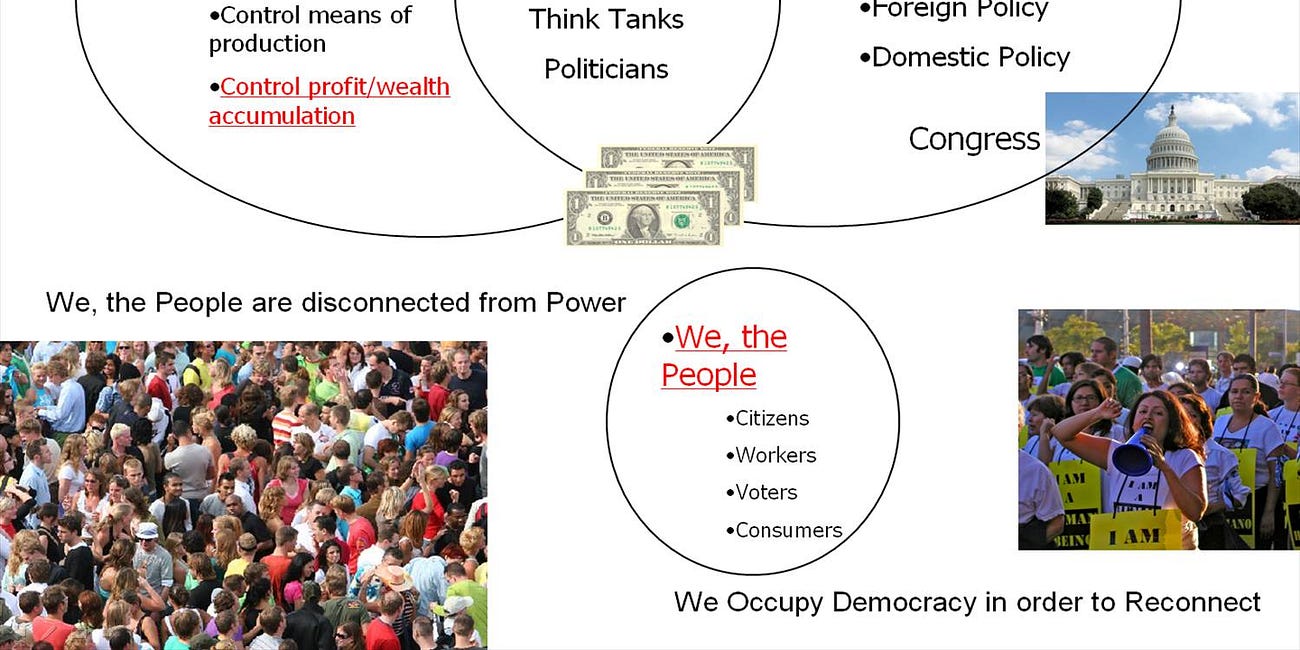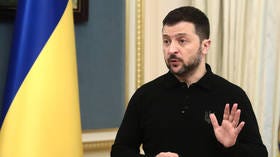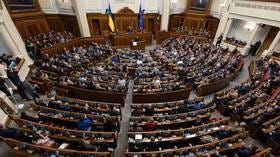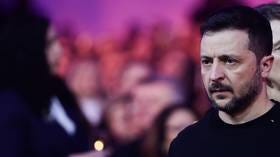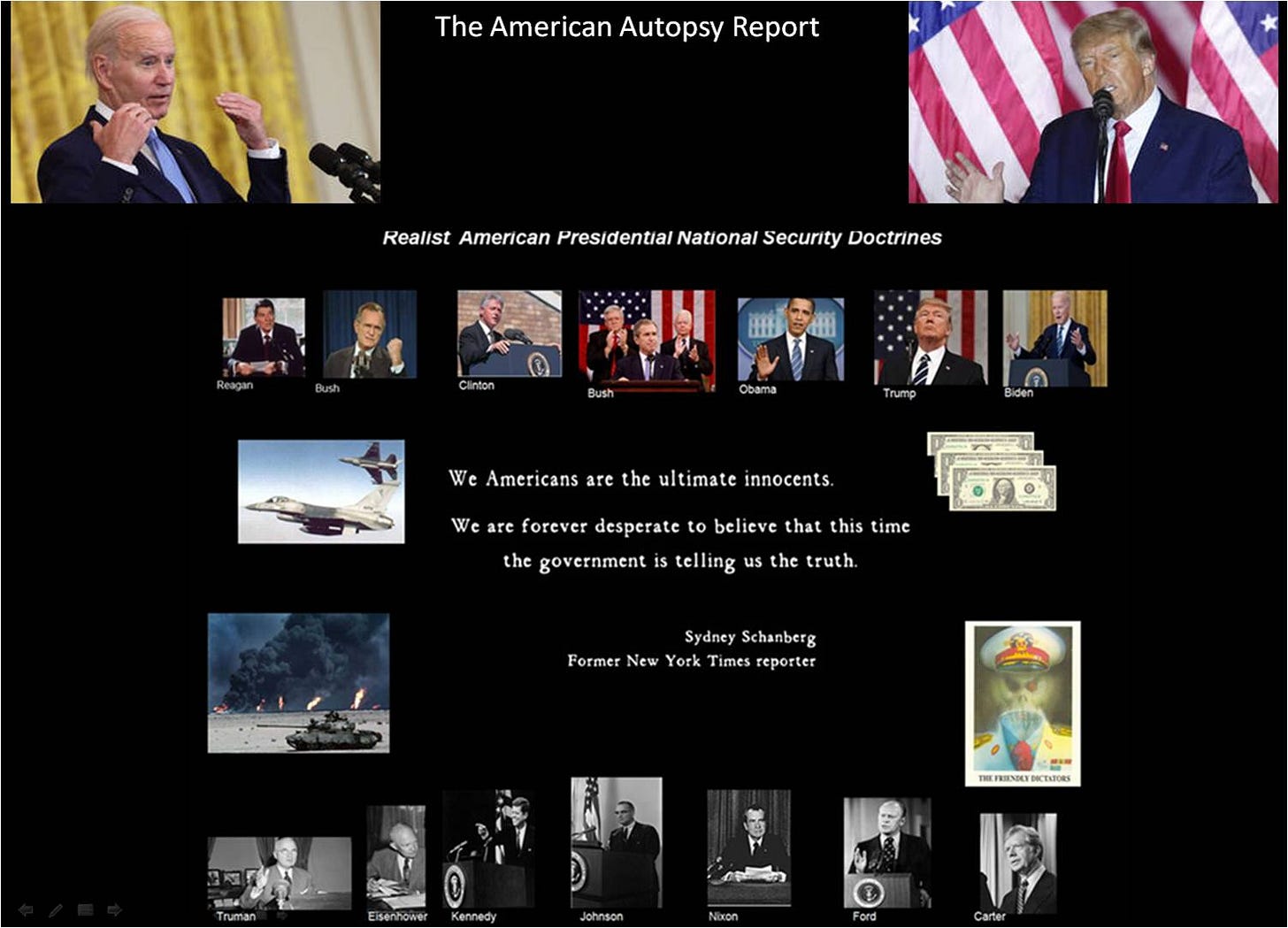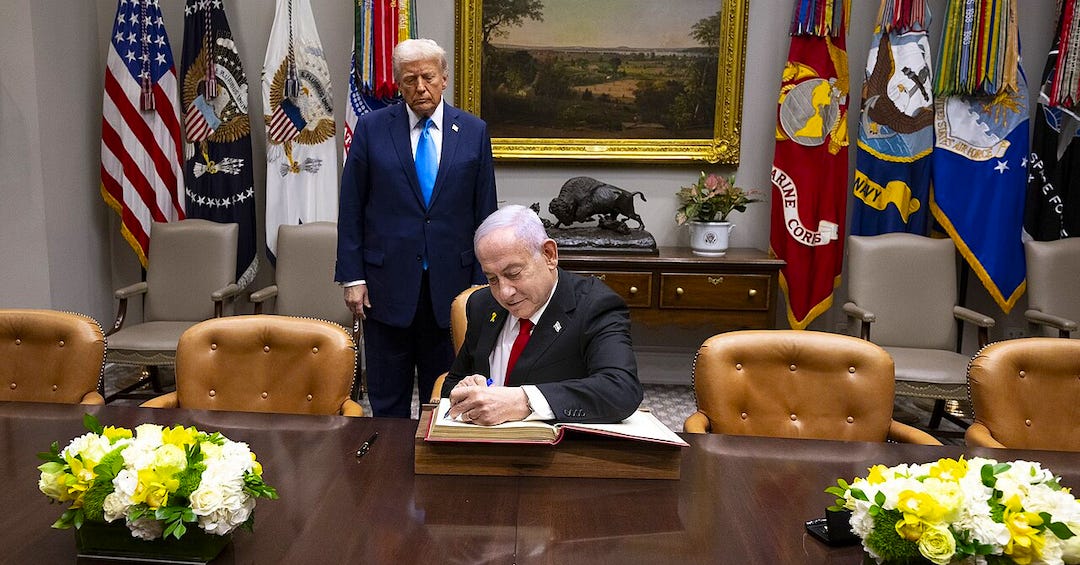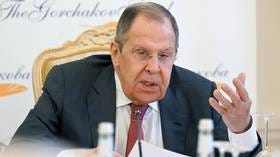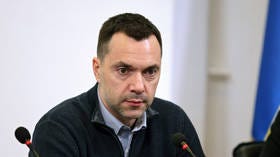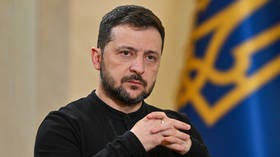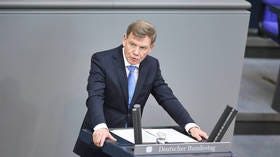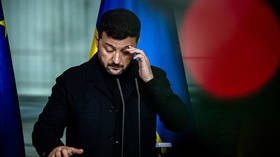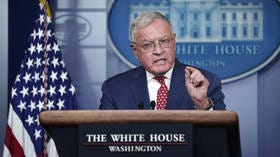US National Security State & NATO/EU Allies Waging De Facto War Against Russia Have Already Lost the War
History Behind US National Security State & NATO troops and mercenary forces "secretly" fighting and killing Russians.
US/NATO and Collective West have already lost the Ukraine War.
Critical Commentary & Analysis
This blog is a compilation of news & commentary along with related historical background research covering the current US war against Russia.
RT.com posting notice:
I am reposting many very good RT.com news herein simply because in many places in the world, especially, online, RT.com has been unjustly and unfairly censored, shadow banned, or blocked, especially in the European Union, corporate social media like YouTube, etc.
This author believes that based on the basic principles of Free Speech and Free Journalism to educationally inform World Community of important issues, I am posting RT.com along with many other journalists who critically challenge the US National Security State and allied collective west’s mass corporate Mainstream Media, MSM, censorship in order to present opposing views on critical problems facing humanity on a very lonely planet.
The blog will be updated periodically. So, stay tuned.
Critical Analysis & Comment:
US/NATO/EU de facto war against Russia through US Ukrainian proxy regime -
US/NATO troops "secretly" fighting with Ukrainian forces which means that
US/NATO/EU are in fact attacking & killing Russians.
US/NATO elites are liars claiming, "We're not at war with Russia."
US/NATO War against Russia using the US/NATO Corrupt Ukrainian Regime has Failed Long Ago but Still Keeps Pouring Billions into a losing cause.
Why? Well, Stupidity at the expense of American Taxpayers.
Not News.
But… US Forever Wars continue….
From Ukrainian Proxy Regime now to US Zionlist Proxy Regime.
Now it’s the US Gaza War.
US Military Industrial Complex Greased with Blood Profits from its Ukraine War and Palestine War.
Putin slams West’s ‘empire of lies’
Russia’s president has criticized the West as the country faces a new massive wave of sanctions
Address by the President of the Russian Federation • President of Russia
http://en.kremlin.ru/events/president/news/67843
Excerpts from Russian President’s speech about US/West’s Empire of Lies:
Down the American MSM Memory Hole:
Putin's arguments against NATO expansion are true. American Presidents lied when they relentlessly and aggressively expanded NATO up to Russia's sovereign borders and then claimed "We're not threatening Russian security."
After which, the US CIA along with NATO overthrew the constitutionally elected Ukrainian government and installed a rightwing corrupt neo-nazi regime. Why all this?
Simple.
In order to expand NATO into Ukraine while using Ukraine proxy regime as a battering ram against the Russian Federation.
Getting the Russian perspective censored by the US and collective western corporate MSM: Everyone's raving about Carlson's Putin Interview.
It was OK, but let's not forget, it was not a high quality journalist interview more than a Carlson's use of the interview as a platform for Carlson. Carlson's interview was helpful in again presenting the Russian POV.
Ukraine conflict, fallout of NATO expansion, relations with US: Key takeaways from Putin’s interview with Tucker Carlson — RT Russia & Former Soviet Union (swentr.site)
However, I recommend for the serious politically and historically enlightened audience take some time to watch and contemplate: Oliver Stone's 'Putin Interviews.' Then you shall more fully understand Putin's arguments against NATO expansion are true.
https://paramountplus.com/shows/the-putin-interviews/…
https://paramountplus.com/shows/video/pyOYgDDnHKKOyYEGJAvnzugBfjdi0_Ml/…
Fyodor Lukyanov: Here’s the real reason why Tucker Carlson came to Moscow
Last night’s event was sensational, but what was the real motivation behind the Kremlin encounter?
A few years ago, Russia was accused of interfering in American political processes. Now the opposite has happened. US domestic politics is dragging the Russian factor – represented by President Vladimir Putin – into its own electoral process.
Journalist Tucker Carlson is a strongly ideological man who represents a certain political camp. He brought to Moscow a profound spirit of internal American confrontation.
Carlson was probably personally curious to hear a lot of previously unknown things about our circumstances, but the goal wasn’t to learn or broaden horizons. The Putin interview was a challenge to the establishment in his home country.
The aim was to break through the conventional narrative – supported by the mainstream media – so that an alternative can fill the breach.
Exactly what Putin was talking about is unimportant. The Russian president’s reputation makes him a powerful battering ram for Carlson. And the rest of the agenda, which is much more important to voters than Russia and Ukraine, is expected to follow him into the space they are trying to open up.
The basic idea is this – look where they (the Washington swamp) have led us.
Whether it is good for Russia or not is debatable. Any involvement in other people’s quarrels can have various consequences. And not always the ones we might predict.
As far as we can tell, the Russian leadership has no intention or ambition to reshape America. Its goals here are more about influencing a specific issue.
Since it is impossible for the Kremlin to persuade their official counterparts across the ocean – no matter how many reasonable arguments are presented – the rational course is to contribute to their quarrels in the hope that these same opponents will delve deeper into their own problems.
Meanwhile, the world’s hypertrophied attention to this interview shows there are weaknesses and that the other side feels them.
Who turns out to be a useful idiot (that’s what Hillary Clinton has called Carlson) will be revealed a little later.
US and Collective Western
“Anti-Russian” Propaganda Wearing Thin
Fear of Russia on decline in G7 – survey
Only the citizens of the UK and Japan still consider Moscow their main threat, a study by the Munich Security Conference revealed
Fear of Russia on decline in G7 – survey — RT World News (swentr.site)
FILE PHOTO: A Russian tank fires a shot. © Sputnik
Russia isn’t the top security concern for residents of the countries in the G7 club of the top Western economies anymore, a study by the Munich Security Conference (MSC), one of the world’s leading forums on security issues, has revealed.
Moscow, which had been viewed as the main threat by the citizens of Canada, France, Germany, Italy, Japan, the UK and the US in 2022, dropped to fourth place in the list last year, according to the Munich Security Index, which was published on Monday.
Russia’s military operation against Ukraine “marked a Zeitenwende [turning point] across G7 countries. But two years on, there are signs that its impact on risk perceptions is tempering,” the paper stressed.
The conflict between Moscow and Kiev and the overall geopolitical struggle “still shape citizens’ views of other countries, but less intensely than last year,” it added.
According to the study, such issues as climate change, radical Islamic terrorism, migration and cyberattacks were among those that worried the public in separate G7 countries more than the alleged Russian threat.
The most significant decline in concerns regarding Russia had been registered in Germany and Italy, where the sentiment rankings dropped to 7th and 12th place, respectively.
The Americans said that they believed cyberattacks, political polarization and China posed bigger threats to their country than Moscow, the Munich Security Index suggested.
The only two nations in the group where Russia was still No.1 in the list of the most pressing threats in 2023 were the UK and Japan, it added.
As for Ukraine, it’s “still considered an ally” by the people in the G7 countries, “but to a lesser extent than last year,” the study stated.
The MSC survey was based on representative samples of around 1,000 people from each of the G7 countries.
In his interview last week with American journalist Tucker Carlson, Russian President Vladimir Putin again stressed that Moscow has no plans for aggression against the West and NATO.
The US and their allies are “trying to intimidate their own population with an imaginary Russian threat,” Putin said, adding that “smart people understand perfectly well that that is false.”
Carlson asked the Russian leader if he could “imagine a scenario where you send Russian troops to Poland,” with Putin replying that “it may only happen if there is an attack on Russia from Poland. Why? Because we have no interests in Poland, Latvia or any other [NATO member].”
Russia has no intention of attacking NATO – Putin
Moscow doesn’t want the world slipping into a global war, the Russian leader said
Source: Russia has no intention of attacking NATO – Putin — RT Russia & Former Soviet Union (swentr.site)
Russia has no intention of attacking NATO member states and will retaliate only if attacked first, President Vladimir Putin told American journalist Tucker Carlson in an interview aired on Thursday.
Western countries are “trying to intimidate their own population with an imaginary Russian threat,” Putin said. He added that “smart people understand perfectly well that that is false.”
Carlson asked the president if he can “imagine a scenario where you send Russian troops to Poland.”
Putin replied: “Only in one case: if there is an attack on Russia from Poland. Why? Because we have no interests in Poland, Latvia or any other [NATO member].”
Asked if he has “territorial aims across the continent,” Putin said that “it is absolutely out of the question.”
“You don’t need to be an analyst to understand that getting involved in a global war goes against common sense. A global war would bring all of humanity to the brink of destruction.”
Putin further argued that Western governments are using “scare tactics” to convince their taxpayers to provide more money to “weaken Russia” in Ukraine and elsewhere.
Moscow has repeatedly cited NATO’s continuing expansion eastward and its support for Kiev as one of the root causes of the current conflict in Ukraine. Russian officials have also warned that the delivery of weapons and other military equipment to Ukraine only leads to further escalation.
Russia has no intention of attacking NATO – Putin — RT Russia & Former Soviet Union (swentr.site)
US doesn’t want talks – Kremlin
Washington is well aware of Moscow’s position but lacks the “political will” to engage in negotiations with Russia, Dmitry Peskov has said
© Sputnik / Mikhail Voskresensky
Source: US doesn’t want talks – Kremlin — RT Russia & Former Soviet Union (swentr.site)
The US has not shown a readiness to negotiate with Russia and apparently lacks the “political will” to do so, Kremlin spokesman Dmitry Peskov told the news outlet TASS on Saturday.
Peskov made the remarks when asked whether the interview that Russian President Vladimir Putin gave to conservative American journalist Tucker Carlson earlier this week will help communicate Moscow’s position on various issues to Washington. “The US authorities know our position very well, they are perfectly aware of all of Putin’s main points,” the spokesman stated.
However, the US has not demonstrated any readiness to actually engage in negotiations with Russia, according to Peskov.
“This is not an issue of knowledge, but an issue of desire. The desire to do something to get on to the track of negotiations. We have not yet seen such a desire or the political will for this [in the US],” Peskov emphasized.
Nevertheless, the Carlson interview provided a great opportunity for the Russian president to communicate his position to a wider audience in the West, according to Peskov.
“The main thing for us is that our president is heard. And should he be heard, that means more people will think about whether he is right or not. They will think, at least,” he stated when asked about the interest the interview has sparked.
The interview has elicited a “hysterical” reaction from the US authorities and mainstream media, who rushed to warn the public against watching it, Russian Foreign Ministry spokeswoman Maria Zakharova has claimed.
“They’ve had a hysterical fit – the White House, the Department of State, all the mainstream media are shouting at the top of their lungs one thing only: don’t watch [the interview], and that an American journalist shouldn’t conduct such an interview,” Zakharova told Russia’s Izvestia newspaper on Friday, describing such reaction to the conversation as a “phenomenal” one.
The two-hour-long conversation, which largely revolved around relations between Moscow and Kiev and the ongoing conflict, garnered over 100 million views in just one day on Carlson’s X account (formerly Twitter) alone.
The interview, which was published on Thursday, was the first between the Russian president and a US journalist since the Ukraine conflict began in February 2022.
West’s ‘image, authority and unity’ at stake – Ukraine’s security chief
Kiev needs even more weaponry from its Western backers to resolve its troubles, Aleksey Danilov insists
Source: West’s ‘image, authority and unity’ at stake – Ukraine’s security chief — RT Russia & Former Soviet Union (swentr.site)
Ukrainian soldiers in training. © Getty Images / Anadolu / Jose Colon
The situation on the conflict frontline has become even more “difficult” for Kiev, the secretary of the Ukrainian National Security and Defense Council, Aleksey Danilov, has admitted. In order to alleviate it, Kiev urgently needs even more weapons from its backers, the official claimed, warning further setbacks suffered by Ukraine would ultimately damage the West’s own “image, authority and unity.”
The security chief made the remarks in an interview with the Portuguese news agency Lusa, published on Sunday. While the frontline situation has never been actually easy for Kiev, it has become even more “difficult” as of late, Danilov claimed.
“If anyone thinks that the situation is easy, then these are people who do not understand war,” the official asserted.
Should Kiev not receive enough weaponry from the collective West, the situation is bound to become even more complicated, Danilov added, urging the country’s backers to urgently allocate more funds and hardware.
“We need weapons, weapons, weapons,” he stressed.
Ukraine will continue fighting Russia no matter what, the official claimed, even if it does not receive enough weaponry from the West. In such a scenario, any further setbacks suffered by Kiev are bound to affect its backers too, he warned.
“We hope that our partners will understand that our independence is under threat, as well as the image, authority and unity of the entire West,” Danilov claimed.
In recent months, the Ukrainian military has suffered various frontline setbacks, reportedly sustaining heavy casualties in the process. While Kiev has never disclosed its losses, it has greatly intensified its mobilization efforts to fill the military’s ranks, with the country’s leadership claiming up to 500,000 more soldiers were needed. The mobilization has, however, grown increasingly violent and lawless, with numerous videos circulating online showing enlistment offices chasing would-be-soldiers in the streets, forcibly pulling them from public transport and so on.
According to the latest Russian estimates, Ukraine lost more than 23,000 troops in January, Russian Defense Minister Sergey Shoigu said last week. Total casualties suffered by Ukraine since February 2022 had reached 383,000, the minister claimed, with around a half of them sustained during the botched counteroffensive Kiev launched last June.
The Ukrainian military also lost hundreds of pieces of heavy military equipment, including assorted systems supplied by the West, including German-made Leopard 2 tanks, US-made Bradley infantry fighting vehicles and other hardware.
UK ‘ideologues’ want Ukraine conflict to engulf all of Europe – Moscow
Russia’s ambassador to London has argued that there is no legitimate threat of a military clash with British forces
Source: UK ‘ideologues’ want Ukraine conflict to engulf all of Europe – Moscow — RT World News (swentr.site)
Russian Ambassador to the UK Andrey Kelin walks in central London in February 2022. © Stefan Rousseau/PA Images via Getty Images
Russia’s ambassador to London has dismissed warnings of a potential war between Moscow and the UK, accusing British “idealogues” of trying to escalate hype around the Ukraine crisis into fueling a wider conflict, for which he sees no underlying basis.
Asked in an interview with Russian media outlet RTVI about the threat of a military clash with the UK, Ambassador Andrey Kelin said he doubts that such a conflict could develop. “We are quite far from each other, we have no territorial claims against each other, we have no ideological differences,” Kelin said in the interview, published on Wednesday.
“We have a problem with Ukraine, which ideologues here are trying to expand into a pan-European one. But this is completely wrong. There is no such pan-European problem, and the development of Europe does not depend on what will happen next in Ukraine. We have a problem with the Ukrainian government, and we must solve it.”
Kelin’s comments come two weeks after UK Chief of the General Staff Patrick Sanders warned of war with Russia and suggested that British civilians should be trained and equipped for a potential call-up to fight. Although UK Prime Minister Rishi Sunak insisted that there are no plans to conscript new troops, the British general was just one of several European military and political leaders who have warned their citizens in recent weeks of a possible war with Russia.
UK Defense Minister Grant Shapps went so far as to predict that the West would fight a global conflict with Russia, China, Iran and North Korea within five years.
Kelin called such talk a “trick” that some British defense officials have used to scare Russia and manipulate their taxpayers. “Any military man who said something like that -- be it British, Norwegian or German -- is, of course, busy trying to get money for his armed forces, for his army. Here, they need to try to put pressure on public opinion, which in their opinion should forget about social spending, spending on education, subsidies, and give more to defense.”
The problem is especially acute in the UK, the diplomat added, because the British army has shrunk to less than 76,000 troops, its smallest force since the Napoleonic wars. Kelin added that calls to boost defense spending face an uphill battle because there’s “no money left” in the UK budget.
The ambassador acknowledged that diplomatic relations with the UK and other Western countries are at a “crisis” level, but he sees no threat of severing ties with the British. “This is important now, especially in such a difficult, tense political situation, to maintain the functioning of embassies, first of all, in both capitals and to maintain dialogue,” Kelin said. He added that history shows diplomatic ties are much easier to break off than to restore. “Embassies in any country are always eternal, except in cases of war, of course. We are not at war with Great Britain.”
Lavrov blasts ‘absurd’ claims
Moscow is only trying to eliminate “historical injustice” by fighting Ukraine, the foreign minister said
RT.com
30 Jan, 2024
Speculation in the West that Russia could attack the Baltic and Nordic states once the Ukraine conflict ends is pure fiction, Foreign Minister Sergey Lavrov has said.
Speaking to the heads of diplomatic missions on Tuesday, Lavrov said the US had gathered a group of 54 countries to provide military, technical and intelligence aid to Ukraine to help it fight Russia. “All this is being done to prevent Russia from claiming victory,” he added.
He said Western countries were claiming that “if Russia wins and asserts its interests in this war, the Baltics, Sweden, and Finland will be next.”
Three Baltic nations became NATO members in the early 2000s, more than a decade after the collapse of the Soviet Union. Both Helsinki and Stockholm applied to join the bloc after the start of the Ukraine conflict, although only Finland’s application has been ratified so far.
Lavrov noted that this view was shared by Joe Biden, referring to remarks by the US president in early December, when he said that “if [Russian President Vladimir] Putin takes Ukraine, he won’t stop there” and could proceed to attack a NATO country.
Moscow said at the time that such comments were “unacceptable for a responsible nuclear state.”
The Russian foreign minister said that “the absurdity of such statements is clear to anyone who understands the slightest bit of history and the goals of the special military operation in Ukraine, which we announced openly and without hiding.”
Russian officials have repeatedly said that Moscow is seeking the “denazification” and “demilitarization” of Ukraine, as well as an arrangement guaranteeing that the country would not join NATO, and would instead recommit to neutrality.
Lavrov further noted that the military campaign against Kiev is aimed at eliminating “historical injustice.” According to the minister, Moscow is fighting attempts to rewrite history, as well as efforts to turn territories where Russians and other peoples of Russia have lived for centuries “into a springboard for US-led NATO to be used to threaten the [country’s] security.”
Last month, Putin said Moscow had no interest whatsoever in launching an offensive against the bloc.
He added that the president of the United States – which he called the “master” of NATO – surely knows that “Russia has no interest… geopolitically, economically or militarily... in waging war against [the bloc].”
EU opposes Ukraine truce – Borrell
The bloc’s chief diplomat called for more weapons for Kiev and more sanctions on Moscow
RT.com
30 Jan, 2024
EU foreign policy chief Josep Borrell has rejected the notion of peace talks and a ceasefire in Ukraine, instead demanding that the bloc’s member states cough up “whatever it takes” for Kiev to defeat Moscow.
In an op-ed for France’s L’Obs magazine on Tuesday, Borrell urged EU leaders to reject “the temptations of conciliation” with Russia. “These ideas were wrong in 2022, and they remain wrong today,” he wrote, arguing that “we must not let them shape our policy towards Ukraine.”
It is unclear which calls for peace Borrell was referring to. In the EU, Hungarian Prime Minister Viktor Orban has persistently called for a negotiated settlement, arguing that Kiev’s forces cannot win a military victory against their Russian opponents, and that the EU’s sanctions on Moscow hurt EU economies more than they hurt Russia’s.
Borrell, on the other hand, claimed that sanctions have “weakened Russia’s war machine,” despite admitting in a speech one day earlier that they have largely failed to achieve their goals.
“Instead of seeking compromise, we should remember the lessons we have learned since 2022 and redouble our efforts,” Borrell continued.
“We must shift the paradigm from supporting Ukraine for ‘as long as it takes’ to committing to doing ‘whatever it takes’ for Ukraine to win,” he declared, calling for Ukraine to be given “long range missiles and other advanced weapons systems,” including more air-defense batteries.
Ukraine’s demand for arms and ammunition can only be met if there is “a renaissance of the European defense industry,” Borrell wrote.
While Borrell boasted that defense spending across the EU has risen by 40% since 2014, this increase has not been matched by a corresponding increase in arms production. EU member states committed last March to the joint supply of a million artillery shells to Ukraine by March 2024, for example, but only a third of that number has been delivered, and German Defense Minister Boris Pistorius told reporters in November that “the one million target will not be reached.”
Defense contractors across Europe are wary of increasing production without being offered iron-clad contracts from governments, Politico reported last summer. Without such contracts, these firms would be risking a loss if demand for their weapons were to fall in the coming years.
From the outset of the conflict in Ukraine, Borrell has consistently portrayed Russia as the party that was uninterested in peace. Even in March 2022, as Russia offered Ukraine peace terms which former Ukrainian officials now concede were generous, the EU diplomat claimed that Moscow “doesn’t want to sit and negotiate anything: what it wants is to occupy the ground.”
Moscow insists that it has not ruled out a negotiated end to the conflict, but maintains that peace will only be reached when the goals of its military operation in Ukraine are achieved, either by military or diplomatic means.
US NATO support Ukraine neo-nazi regime has a long history starting with the end of World War II and throughout the Cold War era.
For more historical details see our post in our
U.S. National Security State Imperialism Interference and Exploitation (substack.com)
US & Western standard history textbooks selectively omit embarrassing truth about US alliances w/ "Friendly Dictators"
Putin vows to eradicate Nazism for good
The Russian president claims that the governments of Ukraine and the Baltic states have adopted “Hitlerite ideology and methods”
Source: RT.com News
27 Jan, 2024 16:39
Russian President Vladimir Putin has vowed to crush modern-day forces that promote Nazism, singling out Ukraine and the Baltic states as countries where the authorities have embraced such ideologies.
Speaking on Saturday at the opening of a memorial to Soviet civilians killed by Nazi German forces in Leningrad Region, the Russian head of state said: “these days the outcomes of the Nuremberg trials are effectively being revised.” He claimed that some countries have gone from rewriting history and whitewashing the Nazis to “arming themselves with Hitlerite ideology and methods.”
President Putin cited the Baltic states, in an apparent reference to their treatment of Russian-speaking minorities, which Moscow deems discriminatory.
“The regime in Kiev lionizes Hitlers’ accomplices, SS members, and uses terror against” those who resist it, the Russian leader alleged, accusing the Ukrainian authorities of subjecting the elderly, women and children to “barbaric shelling.”
According to President Putin, “in a number of European countries, Russophobia is being promoted as the state policy.”
“We will do everything – everything to undercut and eradicate Nazism for good,” the Russian head of state pledged.
He went on to predict that modern-day proponents of the Nazi ideology are doomed.
Putin noted that January 27 marks 80 years since the Soviet Army broke the Nazi Siege of Leningrad, which began in September 1941 and claimed the lives of more than a million civilians.
President Putin’s own parents lived through the ordeal. Indeed, his older brother succumbed to diphtheria at the age of two in the besieged city.
He noted that Nazi Germany was conducting a genocide of the Soviet population, leaving a deep scar on all generations since, with memories never fading away over the past eight decades.
In his New Year’s address to Russians, former President Dmitry Medvedev said that the “ultimate defeat” of neo-Fascism, an ideology “Russia’s enemies are trying to rekindle” should be the country’s “main goal” in 2024.
Earlier in December, Russian Foreign Ministry spokeswoman Maria Zakharova told AFP that Moscow “will not allow the existence on our borders of an aggressive Nazi state.”
She added that the goal of “denazification” of Ukraine proclaimed by President Putin back in February 2022 remain unchanged.
‘Desperation’ of Ukrainian leadership hard to ignore – WaPo
The West may have already squandered its best chance to enable Kiev to win back territories lost to Russia, the newspaper has reported
Ukrainian President Vladimir Zelensky © AFP / Sergei Supinsky
Source: RT.com News
29 Jan, 2024 15:02
The leadership in Ukraine is losing hope of success in the conflict with Russia amid waning Western support and a lack of battlefield achievements, the Washington Post has said.
Kiev continues to demand more weapons and aid from the US and its allies, although officials in Washington “anticipate a lean year ahead, where Ukraine’s increasingly exhausted forces focus more on consolidating their defense than chipping away at Russia’s land-grabs,” the newspaper reported on Monday.
“It’s hard to ignore the sense of desperation in Ukraine’s corridors of power” after almost two years of military conflict with Moscow, foreign affairs columnist Ishaan Tharoor stressed.
Ukraine’s attempted counteroffensive last year “failed to make strategic headway against Russia’s deep defensive lines,” Tharoor acknowledged. Fresh reports from the front line have warned that stocks of ammunition and artillery shells are running low for Kiev’s troops, he added.
At the same time, Moscow “stood its ground, withstood international sanctions and is preparing for fresh offensives,” while also regularly carrying out large-scale missile barrages against Ukrainian targets, he added.
According to the article, the tour of Washington and other Western capitals by Ukrainian President Vladimir Zelensky in late 2023 was an attempt to counter “international fatigue with the conflict and paralysis in US Congress over new supplemental funding for Kiev.”
The administration of US President Joe Biden is still unable to find common ground with Republican lawmakers, who are demanding tougher measures on the border with Mexico in exchange for agreeing another $60 billion in assistance for Kiev.
As a result, Pentagon officials arrived “empty-handed” at the NATO-Ukraine Council meeting in Brussels last week, Tharoor said.
“The West may have already squandered its best chance to enable Ukraine to fully liberate its territory,” he added.
The fate of the conflict between Russia in Ukraine could soon be sealed by “the shortfalls on Ukraine’s front lines and divisions in Washington,” the article claimed.
Kremlin spokesman Dmitry Peskov said last week that Zelensky is “desperately” seeking to return to a situation when Kiev enjoyed “unlimited” funding and weapons supplies from the West. However, this will “never happen again” because the US and its allies are running out of arms and ammunition to send, he stressed.
Earlier this month, Russian Foreign Minister Sergey Lavrov reiterated that “the goals of [Moscow’s] military operation [in the Ukraine conflict] are going to be achieved consistently and persistently.”
Ukraine Corruption Report
Ukraine reveals $40mn mortar shells fraud scheme
A group including senior ministry officials tried to steal money meant for munitions, according to the country’s security service
Ukrainian law enforcement officers performing a search at the homes of one of the suspects. © Telegram / SBU
Source: RT.com News
28 Jan, 2024 15:25
The Security Service of Ukraine (SBU) has announced the uncovering of a major embezzlement scheme involving high-ranking Defense Ministry officials and a private arms manufacturer.
Five suspects attempted to steal 1.5 billion hryvnia (around $39.6 million) in state funds intended for acquiring mortar shells for Ukrainian troops fighting Russia, the SBU alleged in a statement on Saturday.
According to the agency, the company Lviv Arsenal, based in the western Ukrainian city of Lviv, had received an order from the Defense Ministry to provide a batch of 100,000 rounds in August 2022, six months after the outbreak of the conflict between Moscow and Kiev.
Lviv Arsenal took payment of the total sum stipulated in the contract and transferred part of the funds to a foreign firm that was supposed to supply the rounds to the Ukrainian military.
However, that firm “didn’t send a single mortar shell to our country” but instead put the money in the accounts of an affiliated company “based in the Balkans,” the SBU said.
The rest of the sum still remains in Lviv Arsenal’s accounts in a Kiev-based bank, it added. The agency also published photos, which it alleged show searches at the suspects’ homes.
Those believed to have been involved in the scheme include the former head of the Ukrainian Defense Ministry’s Department of Military and Technical Policy, Development of Armaments, and Military Equipment, Aleksandr Liiev, the department’s current head, Toomas Nakhur, as well as the founder and CEO of Lviv Arsenal, Yury Zbitnev, the SBU said.
According to the agency, one of the men had been detained by its operatives while attempting to cross the border out of Ukraine.
Facing fraud charges, the suspects face up to 12 years in prison and confiscation of property, it added.On Friday, an appeals court in Kiev upheld a lower court decision to recover the 1.5 billion hryvnias from Lviv Arsenal in favor of the Defense Ministry due to the firm not fulfilling the contract.
The Armed Forces of Ukraine and the Defense Ministry have been plagued by corruption amid the conflict with Russia. In September, Ukrainian Defense Minister Aleksey Reznikov was dismissed from his post over graft allegations. His successor, Rustem Umerov, announced earlier this month that a probe he had initiated revealed $262 million in theft-related costs in weapons procurement.
Multiple media outlets, including RT, have also reported that arms supplied to Kiev by the US and the EU have been sold on the black market.
US sees Ukraine as a ‘business project’ – Lavrov
Washington is using the conflict between Moscow and Kiev to generate profit for its companies, the Russian foreign minister has said
Russian Foreign Minister Sergei Lavrov, center, arrives to attend a security council meeting at United Nations Headquarters, Monday, January 22, 2024. © AP Photo / Eduardo Munoz Alvarez
Recent statements from the US suggest it regards Ukraine as nothing but a “lucrative business project," one that it is profiting from, Russian Foreign Minister Sergey Lavrov told the UN Security Council on Monday.
The minister was referring to earlier statements made by US State Secretary Antony Blinken. Last month, the top US diplomat claimed that 90% of the money allocated for Ukrainian aid ends up getting funneled back to the US “to the benefit of American business, local communities, and strengthening the US defense industrial base.”
In November 2023, the Washington Post also reported that the majority of these funds were spent on manufacturing new weapons or replacing the equipment sent to Ukraine out of American stockpiles.
The US is essentially “developing its military industrial” complex while “dumping the old junk in Ukraine,” Lavrov said. Russia’s top diplomat also claimed that most major Ukrainian companies, including lithium producers, are being sold to Americans and US companies have been able to get their hands on Ukraine’s fertile land “on the cheap.”
Lavrov denounced the statements made by US officials as “cynical” and said that Washington has been treating the ongoing conflict “not as a war that has already claimed hundreds of thousands of lives … but as a profitable business project.”
Moscow is waging a military campaign not against Ukraine but against “a criminal regime, presumptuous in its impunity,” he declared. Kiev has not forgone on the “war against its own citizens in the east and south” despite years-long efforts by Moscow to find a peaceful solution to this crisis, he explained, adding that over 7 million Ukrainians had found refuge in Russia since the 2014 Maidan coup.
Kiev’s Western backers have never tried to stop the government from persecuting Russian-speaking Ukrainians, the minister said, accusing the US and its allies of using the past few years to “arm Ukraine and prepare it for war against Russia,” while using the Minsk Agreements as a cover.
Russia is ready for talks on Ukraine but it is not willing to discuss ways to keep Kiev’s current government in power, Moscow’s top diplomat concluded.
RT.com
US forming ‘colonial administration’ in Ukraine – Russian spy chief
Washington has told President Zelensky to put Western-educated officials in key roles, Sergey Naryshkin claims
FILE PHOTO: US President Joe Biden walks with Ukraine's leader Vladimir Zelensky © AFP / Susan Walsh
Washington has begun creating “a colonial administration” in Ukraine consisting of local politicians who have sworn allegiance to the US, the head of the Russian Foreign Intelligence Service (SVR) has said.
The US government has demanded that Ukrainian President Vladimir Zelensky “remove” dozens of high-ranking officials, whom Washington no longer trusts, from their posts under various pretexts, Sergey Naryshkin claimed on Monday.
Washington wants those jobs to be filled by “Ukrainians trained in the West, who have sworn allegiance to American interests,” he said in comments cited by the SVR press service.
“As part of the policy of total vassalization of Ukraine, the US has started forming what is essentially a colonial administration in that country,” the spy chief stated.
According to Naryshkin, the required changes in the Ukrainian government were relayed to Zelensky during his visit to Washington in December.
“The Americans are pushing for Ukrainian ambassador to Washington Oksana Markarova, who received her education at Indiana University Bloomington, to take the post of prime minister. The deputy head of the Finance Ministry, Alexander Kava, who studied at Harvard University, is being suggested for the job of finance minister. The current deputy head of the Economy Ministry, Taras Kachka, a graduate of Poland’s National School of Public Administration (KSAP), is recommended for the post of economy minister,” he said.
The latest high-profile change in the Ukrainian cabinet follows the pattern described by Naryshkin. Ukraine’s Defense Minister Rustem Umerov, who replaced Zelensky’s ally Aleksey Reznikov in the job last fall, used to participate in the Future Leaders Exchange program, funded by the US State Department.
The Biden administration, which is in possession of a “killer corruption dossier” on members of Zelenksy’s inner circle, is threatening to make this information public if Ukrainian leader refuses to greenlight the desired personnel decisions, the spy chief claimed.
“Zelensky realizes that the damaging data that the Americans have is capable of destroying him as president. In this situation, he’ll continue to dance to the tune of his American masters,” Naryshkin predicted.
The US, which has provided Zelensky’s government with $111 billion in military and economic assistance since the start of the conflict with Russia, already has advisers embedded in all key Ukrainian ministries, but Washington believes this is not enough and is “steadily increasing Kiev’s feudal dependence,” Naryshkin said.
RT.com
EU state to offer Ukraine cash for weapons loan – Zelensky
The unspecified loan amount is in of $3.27 billion in military aid
Vladimir Zelensky (R) shakes hands with Donald Tusk during a press conference in Kiev, Ukraine, January 22, 2024 © AFP / Ukrainian Presidential Press Service
Ukraine should concede the loss of some of the territories that were previously under its control in order to end the conflict with Russia, Slovakia’s prime minister Robert Fico has said.
Fico made the statement during a weekend interview with broadcaster RTVS dedicated to his upcoming visit to Ukraine. The Slovak PM is scheduled to travel on Wednesday to Uzhgorod, a city near the border between the two countries, for a meeting with his Ukrainian counterpart Denis Shmygal.
The ongoing conflict between Moscow and Kiev can’t be resolved through military means and should end in compromise that might be “painful for both sides,” he said.
“What are [the Ukrainians] waiting for? That the Russians will leave Donbass and Lugansk, or that they will leave Crimea? It’s unrealistic,” Fico insisted.
The People’s Republics of Donetsk and Lugansk were officially incorporated into the Russian state in the fall of 2022, together the Kherson and Zaporozhye regions, as a result of referendums held in those areas. Crimea has been a part of Russia since 2014.
The continuation of the fighting that has been underway since February 2022 will only make Moscow stronger, Fico added.
The Slovak premier also said Ukraine was “not a sovereign, independent country” due to it being “under the absolute influence of the US.” He criticized the EU for making “a huge mistake” of following Washington’s lead when it comes to dealing with Kiev, instead of developing its own “sovereign” view on the issue.
As for his talks this week with Shmygal, Fico promised to tell his Ukrainian counterpart that he’s against Kiev’s membership in NATO, as that would be “exactly the basis of World War Three,” and to reiterate that President Vladimir Zelensky’s government won’t be getting any more weapons from Bratislava.
The prime minister’s interview caused angry reaction in Kiev, with the head of the Ukrainian parliament’s Foreign Affairs Committee Aleksandr Merezhko demanded that Fico’s trip to Ukraine be canceled for his “disgraceful statements” that crossed “the red line.”
“Every country should have at least minimal self-respect. It’s absolutely unacceptable to pretend that nothing is happening when the leader of another state makes statements that question the sovereignty of a state” that he’s about to visit, Merezhko wrote on Facebook.
Fico made a comeback as Slovakia’s prime minister in October after his party won the snap election in the EU country, campaigning on promises of, among other measures, cutting military aid to Kiev and improving ties with Moscow.
RT.com
Ukraine must give up territory – EU state's PM
Ukraine should concede the loss of some of the territories that were previously under its control in order to end the conflict with Russia, Slovakia’s prime minister Robert Fico has said.
Fico made the statement during a weekend interview with broadcaster RTVS dedicated to his upcoming visit to Ukraine. The Slovak PM is scheduled to travel on Wednesday to Uzhgorod, a city near the border between the two countries, for a meeting with his Ukrainian counterpart Denis Shmygal.
The ongoing conflict between Moscow and Kiev can’t be resolved through military means and should end in compromise that might be “painful for both sides,” he said.
“What are [the Ukrainians] waiting for? That the Russians will leave Donbass and Lugansk, or that they will leave Crimea? It’s unrealistic,” Fico insisted.
The People’s Republics of Donetsk and Lugansk were officially incorporated into the Russian state in the fall of 2022, together the Kherson and Zaporozhye regions, as a result of referendums held in those areas. Crimea has been a part of Russia since 2014.
The continuation of the fighting that has been underway since February 2022 will only make Moscow stronger, Fico added.
The Slovak premier also said Ukraine was “not a sovereign, independent country” due to it being “under the absolute influence of the US.” He criticized the EU for making “a huge mistake” of following Washington’s lead when it comes to dealing with Kiev, instead of developing its own “sovereign” view on the issue.
As for his talks this week with Shmygal, Fico promised to tell his Ukrainian counterpart that he’s against Kiev’s membership in NATO, as that would be “exactly the basis of World War Three,” and to reiterate that President Vladimir Zelensky’s government won’t be getting any more weapons from Bratislava.
The prime minister’s interview caused angry reaction in Kiev, with the head of the Ukrainian parliament’s Foreign Affairs Committee Aleksandr Merezhko demanded that Fico’s trip to Ukraine be canceled for his “disgraceful statements” that crossed “the red line.”
“Every country should have at least minimal self-respect. It’s absolutely unacceptable to pretend that nothing is happening when the leader of another state makes statements that question the sovereignty of a state” that he’s about to visit, Merezhko wrote on Facebook.
Fico made a comeback as Slovakia’s prime minister in October after his party won the snap election in the EU country, campaigning on promises of, among other measures, cutting military aid to Kiev and improving ties with Moscow.
RT.com
EU state to offer Ukraine cash for weapons loan – Zelensky
Poland will loan Ukraine cash make “larger-scale arms purchases,” Ukrainian President Vladimir Zelensky said after meeting Polish Prime Minister Donald Tusk in Kiev on Monday. “There is nothing more important” than giving Kiev more weapons, Tusk said.
“We appreciate Poland’s unwavering support and the new military aid package for Ukraine, as well as a new form of cooperation aimed at larger-scale arms purchases for Ukrainian needs: a Polish loan for Ukraine,” Zelensky wrote on X (formerly Twitter).
Speaking in Kiev, Tusk also said that Warsaw was ready to finalize talks on the joint Polish-Ukrainian production of weapons and ammunition on Ukrainian territory, and that he had signed Poland on to a G7 pledge to continue arming Ukraine until it retakes its lost territory.
Neither Tusk nor Zelensky revealed how much money Poland would lend Ukraine, or when this cash would be transferred.
Warsaw has already given Kiev more than €3 billion ($3.27 billion) in military aid since the beginning of Russia’s military operation, according to figures from the Kiel Institute for World Economy.
However, the future of Polish military aid was thrown into jeopardy in September when Tusk’s predecessor, Mateusz Morawiecki, announced that his country was “no longer transferring any weapons to Ukraine,” and would instead focus on building up its own forces. Morawiecki’s declaration came amid a trade dispute that saw Kiev file a now-suspended complaint to the World Trade Organization (WTO) over Poland and some other EU states banning Ukrainian grain deliveries, which they argued undercut their own producers.
With Morawiecki’s nationalist government replaced by Tusk’s pro-EU cabinet, the new PM has promised that disagreements between Warsaw and Kiev will not stop the flow of arms.
“There is nothing more important than supporting Ukraine in its war effort against the Russian attack. This is absolutely number one,” he said, the Polsat news agency reported.
RT.com
EU state to offer Ukraine cash for weapons loan – Zelensky
The unspecified loan amount is in of $3.27 billion in military aid
Jan 22, 2024 18:09
Zelensky serving Western elites – exiled opposition leader
Ukraine is a proxy in a new “crusade” against Russia, Viktor Medvedchuk has said
President Vladimir Zelensky is serving the interests of the collective West and not Ukraine, effectively conducting a modern “crusade” against Russia, according to the former leader of Ukraine’s biggest opposition party Viktor Medvedchuk.
The current conflict is not that different from the past Western pushes into the East, such as Napoleon’s or Hitler’s invasion of Russia, Medvedchuk wrote in an article posted on his website on Friday, suggesting that this particular “crusade” is being waged by proxy.
“Europe has traditionally labeled Russia a ‘barbaric country,’ using this as a pretext for invasion. Napoleon was bringing ‘freedom and civilization’ to Russia, Hitler was saving it ‘from the Jews and the Bolsheviks,’ thus, all the invaders said that they wished only good for the Russian people, and really wanted to bring them into the Western world,” Medvedchuk wrote.
In reality, only the “treasures and resources of Russia and its people” were actually meant to make it into the “Western world,” while Russians themselves were bound to get “slaughtered,” he added.
The current Ukrainian leadership has defined their country as an “Anti-Russia,” with Kiev making a big effort to portray its citizens as people universally hating anything Russian, Medvedchuk noted, suggesting that the effort is primarily meant to impress their Western sponsors.
“Zelensky paints the Ukrainians as ardent haters of Russia. He does this for a reason: hundreds of billions of dollars in Western aid flow to him and his circle. And the Ukrainian people get nothing from these funds except death, poverty and suffering,” Medvedchuk said, squarely accusing Zelensky of committing “genocide” of the Ukrainians.
Medvedchuk predicted that the inevitable failure of the Western crusade is bound to result in a collapse of modern Ukraine. He urged Ukrainians to rebel against Zelensky and his government, who had long sold them out as “cannon fodder” for NATO.
“In this situation, the salvation of the Ukrainian people lies in turning their weapons against Zelensky. We need to save our people and take back the land Zelensky sold. There is simply no other way for Ukrainians. They are driven to slaughter, their land is cleared of them, Zelensky’s team receives super profits for their blood,” he wrote.
Medvedchuk was the leader of the Opposition Platform – For Life, the second-largest group in the Ukrainian parliament, until his arrest in April 2022. The party was banned in July that year, and Medvedchuk was sent to Russia in exchange for several Ukrainian POWs in September.
Since then, he has been promoting a platform that would make Ukraine a neutral state that prioritizes its own national interests, as opposed to being an enemy of Russia.
Ukraine conflict could have ended in Spring 2022 – Kiev’s top MP
David Arakhamia led Kiev’s delegation in the talks with Moscow
avid Arakhamia during Russian-Ukrainian negotiations in Istanbul © Sputnik
Russia was ready to stop the fighting had Ukraine agreed to remain neutral, but the West advised Kiev to keep going, the head of President Vladimir Zelensky’s parliamentary faction – and the chief negotiator at the peace talks in Istanbul – David Arakhamia admitted on Friday.
Arakhamia, who heads the ‘Servant of the People’ parliamentary group, told the TV channel 1+1 that Moscow had offered Kiev a peace deal in March 2022, but the Ukrainian side did not trust Russia.
“Russia’s goal was to put pressure on us so that we would take neutrality. This was the main thing for them: They were ready to end the war if we accepted neutrality, like Finland once did. And we would make a commitment that we will not join NATO. This was the main thing,” said Arakhamia.
However, agreeing to neutrality and giving up NATO membership would have required changing the constitution of Ukraine, Arakhamia explained. “Secondly, there was no trust in the Russians that they would do this. This could only be done with security guarantees,” he told 1+1.
During the talks, Arakhamia added, British then-PM Boris Johnson arrived in Kiev and told Ukrainian officials to keep fighting and not sign any agreements with Moscow.
Johnson’s role in scuttling the peace talks in Istanbul was revealed in May 2022 by the outlet Ukrayinska Pravda. However, neither the British politician – who was ousted as PM in June that year and eventually landed a job at an American think tank – nor the US government ever officially acknowledged pressuring Kiev into reneging on the draft agreement, which Arakhamia himself had signed with the Russians. Kiev had likewise never officially commented on the matter – until now.
Earlier this year, Russian President Vladimir Putin revealed to African leaders that Moscow and Kiev had signed a draft agreement “on permanent neutrality and security guarantees for Ukraine” at the talks hosted by Türkiye.
As soon as Russia pulled back its troops from the vicinity of Kiev, as a gesture of good will, Ukraine reneged on the deal, Putin said.
The Russian withdrawal was presented by Western governments and media as a Ukrainian military victory and they began sending heavy weapons and equipment to Zelensky’s government, fueling the conflict for the next 18 months.
The US is the biggest cause of global instability, but it pretends to be the solution
The Israel-Hamas war shows that Washington is the single most disruptive force in the world
Israel’s assault on Gaza, as well as the escalation of violence by Israeli settlers in the long-occupied West Bank, is, or should be, a wake-up call.
More than 11,000 Palestinians, including some 4,650 children, have now been killed in a war started in response to the October 7 Hamas attacks which themselves claimed around 1,200 lives.
A halfway even-handed international community would have to step in and protect the victims of the disproportionate Israeli retaliation, which multiple international voices have called a genocide and an ethnic cleansing. Failure to do so reveals profound bias and dysfunction. That much is obvious.
Yet there is another aspect of this catastrophic crisis, which receives less attention than it should. The global failure to hold back Israel’s aggression is due to only one part of the world, the West. And the West follows the lead of the US. Ethically, those who fail to stand up for the victims of a genocide or, even worse, side with the perpetrators are responsible for their own failure. Yet, in terms of power, US behavior is decisive. Just imagine a world in which Washington had reacted differently and restrained Israel. Its allies and clients would, of course, have fallen into line.
Instead, the Biden administration deterred anyone who could have been tempted to interfere with Israel. Washington has also supplied arms and ammunition, intelligence, and special forces assistance, and provided diplomatic cover. This brings us to the other fact that we need to wake up to: the single greatest danger to a modest minimum of fair and reliable global order, and thus stability, is the US. This is not a polemical point but the conclusion of a dispassionate analysis of Washington’s persistent capacities and empirical record since, roughly, the end of the Soviet Union, which marked the beginning of America’s “unipolar moment.”
The precondition for America’s unusual ability to disturb the peace is its historically extraordinary concentration of economic and military capacities. Currently, the US still accounts for at least 13.5% of global GDP – adjusted for purchasing power. By now, that is “only” second place after China. Yet the US is still among the upper ten in terms of (nominal) GDP per capita, reflecting its great wealth. It also still has the “exorbitant privilege” (in the words of a former French minister of finance) of dollar hegemony. It can still finance both its economy and state power unusually cheaply and, in addition, it can misuse the dollar’s global reserve and trade functions to confiscate and coerce. The injudicious over-use of this leverage has begun to backfire. Critically excessive national debt and the inevitable mobilization of resistance and alternatives to the dollar’s power both point to the erosion of US monetary hegemony. For now, it is a fact still to be reckoned with.
All this economic oomph translates into enormous military budgets. Whether in nominal terms or adjusted for purchasing power, America outdistances other nations, with 40% of all money spent on the military worldwide in 2022.
Indicators could be multiplied, categories refined. Yet the overall picture would not change. At this point in time, the US is still a power giant, and, on top of that, it remains at the top of the most powerful complex of alliances in the world. The sheer size of American power alone tells us little about how it is used. But what is too often overlooked is that without it, America – whatever its policies – simply could not be so influential.
There is clear, again quantitative, evidence that Washington’s influence is highly disruptive. According to the conservative journal The National Interest, between 1992 and 2017, the US has been involved in 188 “military interventions.” This list is incomplete; it does not include, for instance, the Gulf War of 1990 or the pivotal role Washington played in provoking and then waging a proxy war against Russia in Ukraine. Moreover, as you would expect, given the source, these are conservative figures. By 2022, Ben Norton, a well-informed critic of US politics on the left found 251 military interventions after 1991.
The US has not only shown a high propensity to pursue its perceived interests abroad by military force – instead of diplomacy or even “merely” economic warfare, i.e. sanctions. What is at least equally concerning is that this preference for direct violence as a tool of policy is accelerating. The National Interest finds that – again between 1992 and 2017 – America was engaged in four times as many military interventions as between 1948 and 1991 (“only” 46 times). Likewise, the Military Intervention Project at Tufts University’s Center for Strategic Studies has found that the US “has undertaken over 500 international military interventions since 1776, with nearly 60% undertaken between 1950 and 2017” and “over one-third” of these missions occurring after 1999. US bellicosity has grown over time (though not evenly) and, recently, after the end of the Cold War and the former Soviet Union, that growth has sped up.
These wars, moreover, have been extremely destructive. According to exhaustive research conducted by the Costs of War project at Brown University, the so-called “Global War on Terror” after 2001 alone produced between 905,000 and 940,000 “direct war deaths.” The same research project notes that the “destruction of economies, public services, infrastructure, and the environment” by these wars has caused an additional “3.6-3.8 million indirect deaths in post-9/11 war zones.” The fact that most of these deaths were “indirect” shows that, even without engaging in violence directly, Washington has an extraordinary knack of spreading lethal disruption.
If the use and promotion of military violence by the US is so globally destabilizing, how about economic warfare? Here as well, we see a clear escalation. A recent op-ed by the New York Times editorial board noted that, “over the past two decades, economic sanctions have become a tool of first resort for US policymakers.” Between 2000 and 2021, for instance, the Treasury Department’s Office of Foreign Assets Control sanctions list grew by more than tenfold, from 912 to 9,421 entries, “largely because of the growing use of banking sanctions against individuals.”
Over the long term, since 1950, the US has been “responsible for the most sanctions cases” in the world, by far. The American share of 42% outdistances the runners-up, the EU (and its predecessor organizations) on 12%, and the United Nations on 7%. The official ideology of sanctions foregrounds their putative positive sides. Short of war, they are supposed to coerce states, organizations, and individuals into complying with things such as human rights or the vague rules of the so-called rules-based order.
Wide open to manipulation and bad faith as these justifications are, what is worse is that, in reality, US sanctions serve narrowly defined US interests and are subject to the demagogic appeals that constitute much of US domestic politics. There are probably no more telling cases of this systemic flaw than America’s reneging on the Iran Nuclear Deal (JCPoA), the sanctions regime against Russia, and the economic war against China, including the recent – futile – attempt to block and even roll back China’s development of AI technologies.
Sanctions also disproportionately harm poor – and politically powerless – populations. As a comprehensive study by the Center for Economic and Policy Research on the “Human Consequences of Economic Sanctions” has established, “sanctions have negative effects on outcomes ranging from per capita income to poverty, inequality, mortality, and human rights.” Blanket sanctions on Venezuela’s oil industry in 2018, for instance, “deepened what was already the worst economic contraction in Latin America in decades,” and caused “significant increases in poverty,” as the New York Times summarized a study by Francisco Rodríguez from the University of Denver. These US policies are not only unethical, they also destabilize whole societies and states, often in especially sensitive regions.
Washington’s recent track record is clear enough. But it does not predict the future: Will the US stay its current course, or will it adopt a less violent and more diplomacy-centered approach, as recommended by some moderate domestic critics? The Quincy Institute for Responsible Statecraft, for instance, is explicit about the “practical and moral failures of US efforts to unilaterally shape the destiny of other nations by force,” and seeks to promote “a fundamental rethinking of US foreign policy assumptions.”
The chances for a truly fundamental course correction seem slim. For one thing, there are few signs of any desire for it among either Democrats or Republicans. Instead, the top politicians of both parties tend to compete over who can offer a more robust insistence on US preeminence. Consider, for instance, the response of two former “insurgents” to Israel’s assault on Gaza. Both Donald Trump and Bernie Sanders have staked positions in alignment with current Biden administration policy. Trump, who, unlike Sanders, is running for the president’s office again – and has a realistic chance of winning – has criticized Israel for being unreliable, failing to prevent the Hamas attack of 7 October, and losing the battle for public opinion. But he has not called Israel out for excessive civilian deaths and what multiple world leaders and officials, as well as UN human rights experts, have called war crimes. Sanders has been, if anything, even more conformist, explicitly rejecting a ceasefire, despite the predictable and deserved blowback, exemplified in a scathing response from the eminent scholar and prominent public intellectual Norman Finkelstein.
Secondly, the influence of the military-industrial complex is increasing; the financial interest in a foreign policy privileging the military is strong and well-articulated by lobbyism and think-tanks that shape not only politics narrowly understood but public debate as well.
Thirdly, despite some critical journalism, US mainstream media still preponderantly affirm the bipartisan foreign policy consensus. By and large, America does not even have a forum for healthy and diverse public debates on principally revising its approach to the world.
Finally, up until now, the multiplying signs of a relative decline of American power, as measured against the emergence of other power centers in the shape of single countries or associations of states, have not made the US elite lower its expectations. On the contrary, there is a constant, reiterative process of doubling down, from the rout of Kabul in 2021 to the proxy war in Ukraine of 2022. And once that is about to be lost, a virtually seamless transition to another big gamble in the Middle East. And persistent tension with China not only over trade wars, but Taiwan is always in the background. That is the mindset reflected in New York Times articles asking whether “America can support two wars,” (in Ukraine and the Middle East) and “still handle China.”
If history teaches anything then it is that trend extrapolation is a hard, thankless business, because the limits of our imagination – even if well-equipped with method and data – are always narrower than those of reality. Maybe we are on the cusp of major generational shifts – in values and ethnic self-identification – in American society. Perhaps, all US trends will be upset by the Civil War 2.0 that some conventional observers already call a “mainstream” notion. In any case, prudence requires to assume that the problem of global US disruptiveness will not solve itself or go away soon or, for that matter, easily. The most important challenge of international security, therefore, is to manage a US that is especially dangerous now, by historical standards, and, even in decline, remains extremely powerful. It is sad to say, but in terms of achieving global stability, America is precisely not what it imagines itself to be: an “indispensable” part of the solution. In reality, it is the single worst problem.
Russia’s economy growing three times faster than Eurozone – Guardian
GDP is forecast to expand 1.5% in 2024 against the euro area’s 0.5%
Western sanctions have so far failed to halt Russia's economic growth, which is now projected to outpace that of the Eurozone, the Guardian reported on Thursday, citing investment firm Amundi.
According to the company’s forecast, Russia’s gross domestic product (GDP) will grow by 1.5% in 2024. In contrast, the Eurozone economy is set to expand by mere 0.5% next year, according to Amundi, Europe’s largest fund manager in terms of assets.
“It means that the United States, Europe, Japan, Australia – the major developed countries – are unable to sanction a country effectively... We can deplore it, but it’s a reality,” Amundi CIO Vincent Mortier said at a news conference in Paris.
Mortier noted that while sanctions have had some impact on certain Russian individuals and entities, whose assets have been frozen over the past 20 months, Russia’s imports and exports remain virtually unaffected. After losing access to Western markets, Russia successfully reoriented most of its trade to its BRICS partners (Brazil, India, China and South Africa) and countries such as Türkiye and Kazakhstan, which have greatly benefited from the boost in trade with the sanctioned country, Mortier said.
“It’s a reality check. In the end, if we take stock of the war in Ukraine: Europe has suffered directly and strongly; for the United States [the impact is] neutral; but Türkiye, Central Asia and Asia more generally have benefited,” he added.
Russia has faced unprecedented economic sanctions from the West over the Ukraine conflict since last year, pushing the economy into a 2.1% contraction as of the end of 2022. However, recent data shows that the country has since largely adapted to the restrictions, with the Russian Finance Ministry forecasting growth of 3% by the end of the year.
Many international organizations have also recently upgraded their economic forecasts for Russia. The European Commission expects Russia’s GDP to grow by 2% this year on the back of “stronger-than-earlier expected domestic demand underpinned by fiscal stimulus,” and to expand by 1.6% in both 2024 and 2025.
A hard truth about the Russia-Ukraine conflict is finally dawning on the West
American observers are finally snapping out of “magical thinking” about Moscow’s defeat
By Tarik Cyril Amar, a historian from Germany working at Koç University, Istanbul, on Russia, Ukraine, and Eastern Europe, the history of World War II, the cultural Cold War, and the politics of memory
A hard truth about the Russia-Ukraine conflict is finally dawning on the West
On November 16, the Wall Street Journal, one of the most prestigious and influential American media outlets, published an essay under the title “It’s Time to End Magical Thinking About Russia’s Defeat.”
The authors, Eugene Rumer and Andrew S. Weiss, are influential representatives of America’s national security and international relations establishment. After a career in government service, Rumer now directs the Russia and Eurasia program at the Carnegie Endowment for International Peace; Weiss is Carnegie’s vice president for studies. This is an important text, and both its message and the timing of its publication matter.
The message is simple: “Putin” (by which they mean Russia) has “withstood the West’s best efforts” to roll back the military operation against Ukraine; Moscow’s political system has proven resilient and even become stronger; and “America and its allies” must now switch to a strategy of “containment.”
The timing is more complex. Clearly, the current Israeli war on Gaza – referred to as “tumult in the Middle East” – is one of three key factors. The other two are the approaching presidential elections in the US, and, of course, the failure of Ukraine’s summer counteroffensive, by now acknowledged even in gung-ho outlets such as the British Daily Telegraph.
In addition, America's hold over the non-Western majority of humanity is continuing to decline. China, in particular, is successfully resisting Washington’s pressure. Domestically, President Joe Biden's government faces tough headwinds from both the official Republican opposition and a growing movement in the American street, where widespread and deep dissatisfaction with politics and the economy is now combining with an unprecedented groundswell of protest against US complicity in Israel’s genocidal war on the Palestinians.
American polls are unambiguous. In September, even before the Middle East crisis, the Pew Research Center found that “Americans’ views of politics and elected officials” are now unusually and “unrelentingly negative, with little hope of improvement on the horizon.” By now, a majority of Americans also contradict the Biden administration – and the rest of almost the whole bipartisan political establishment – by wanting a cease fire in Gaza, while the number of those supporting Israel is decreasing quickly and significantly.
Against this background, this Wall Street Journal article clearly serves as an authoritative call for retrenchment. The object of this signal to retreat is the proxy war in Ukraine, that is, the single most aggressive, most risky, and most defeated US foreign policy strategy in the past two years (if we count from the moment Washington recklessly decided to stonewall Moscow’s clear warning as well as its urgent offer to find a grand bargain-style off-ramp in late 2021).
So far, so telling. But not surprising. For two reasons: the turn away from Ukraine is already fairly old non-news. Even mainstream media spotted the onset of a severe, probably terminal, bout of Ukraine fatigue well before the eruption of the fresh war in the Middle East. Secondly, the skeptical insights now given prominence in the Wall Street Journal as reasons to wrap up its proxy war investment in Ukraine are very old hat indeed. As a matter of fact, the most interesting question the essay – inadvertently – raises is what took you so long?
It would be tedious to address every point raised now in the Wall Street Journal. But since they all have in common that they have been predicted or were utterly predictable, a few highlights will do.
We learn, for instance, that the West’s attempts to isolate Russia have failed. Yet how hard was it to foresee that the Global South has no reason to follow the West except fear, and that fear is abating? And was it impossible to know in advance that China would answer “No, thank you very much,” when the US and the EU did two things at the same time: urge it to abandon Russia, which would have meant giving up Beijing’s single most important partnership, and signal that China would be next to be cut down to size? China, in essence, initially gestured a little in the direction of distancing itself from Russia, but the strategic fundamentals of the situation determined its real behavior and have become explicit by now. This outcome was predicted, not by every expert but by enough of them to matter.
We are also reminded that this is a war of attrition, i.e. one favoring Russia by its very nature. Even on CNN, we heard that much as early as April 2022, and the militantly Atlanticist Economist magazine admitted it in a backhanded way (using the euphemism “war of endurance”) in September.
Every war is a matter of competitive military performance. But in a war of attrition, three fundamental things matter the most: the size, productive and technological capacity, and resilience of the economy; the stability of the political system, including its real-life popularity and the elites’ legitimacy; and, of course, demography. The Wall Street Journal observes that Russia’s economy has “been buffeted but is not in tatters” (really understating its success, but let’s not quibble) and that its political system draws on “solid” popular support and elites that have neither rebelled nor deserted.
In the West at least, this was harder to predict. Not because of Russia being so difficult to decipher, but due to Western bias and groupthink, or, bluntly put, wishful thinking. Even before the post-February 2022 Ukraine war, Western politics, media, think tanks, and even academia have rewarded unrealistically pessimistic assessments of both Russia’s economy and political stability. Consider, as a pars pro toto, Western reactions to the Wagner rebellion in June. Quite a few of them predicted the imminent collapse of Russia into anarchy and civil war or, at least, a great and lasting domestic and international weakening of Russia. Yet none of this has come to pass.
The importance of this comprehensive, almost total failure of analysis and prediction lies in how typical it was, reflecting a dominant culture of politicized sloppiness vitiating Western thinking about Russia. A sloppiness that is all the more astonishing as precisely Moscow’s opponents cannot afford it without serious self-harm.
For self-harm is the main result. It is true that Russia has to bear some of the cost of Western shortsightedness. Obviously, Moscow as well would be better off if it could work with reasonable, if competitive, partners instead of irrationally hostile opponents who constantly underestimate Russia and overestimate themselves. Yet the West is suffering even more from its pattern of repetitive mistakes.
The costs of the proxy war in Ukraine demonstrate this fact, and not only in terms of arms and money, but of political prestige as well. Regarding the quantifiable costs, the US Congress, for instance, has approved $113 billion worth of aid for Ukraine since February 2022. Currently, a request for even more is turning into a major domestic headache for the Biden administration, and most likely, a defeat. The EU has shelled out almost €85 billion.
Of course, not all of these funds have really been appropriated, and much of them have really been fueling corruption in Ukraine or served the donors and especially their arms industries, as US politicians have repeatedly pointed out with proud cynicism. Yet the overall picture remains one of severe fiscal overstretch spent on a losing gamble. Add the self-inflicted losses that the EU’s economies in particular have incurred from their misconceived sanctions policy and the picture is grim. Add, moreover, how much the West will have to spend if it really wishes to finance the rebuilding of Ukraine, and the prospect turns catastrophic. Good luck, EU, with those membership plans.
In addition, intangibles matter as well. Clearly, “losing” Ukraine (which the West should not have tried to “own” in the first place) will reveal the bloc's weakness more sharply than the failures in, for instance, Iraq, Libya, Syria, or Afghanistan. For two reasons. First, unlike these countries, Russia is a great power; that means it is in a position to exploit the Western setback. Moscow, put differently, is big enough to geopolitically counterattack.
Whether or when exactly it will do so, and what shape such a new “snapping back” of Russian President Vladimir Putin’s metaphorical “rubber band” will take this time, remains to be seen. What is clear is that such payback is a realistic possibility. Secondly, the West is committed as never before, substantially and rhetorically, when trying to use Ukraine to reduce Russia. Hence, failing to do so exposes Western limits as never before. Rumer and Weiss are not naïve. They cannot say it – and maybe they can’t even quite think it – but in their heart of hearts they know that packaging this defeat as a mere change of strategy to “containment” will not fool anyone who does not want to be fooled.
It is good to finally see some hard facts appear prominently in mainstream Western debates. But it is not enough. For one thing, the West has to ask itself painful questions why it has stayed so obsessively one-sided for so long. Otherwise, the same pattern will be repeated in starting and waging the next war, for instance, against China or Iran. Secondly, a shift to “containment” will not repair the damage but merely stretch it out. What the West really needs is a complete rethinking of not merely its methods but its aims.
The statements, views and opinions expressed in this column are solely those of the author and do not necessarily represent those of RT.
‘Ukraine has a terrorist government’: A new political force in an EU state wants the bloc to change its stance towards Kiev
A new political party in the Czech Republic wants to form a united national-conservative front against Brussels
On September 16, around 10,000 protesters descended on Prague’s Wenceslas Square to demand a change to their government’s foreign policy. These protests were led by a group called Pravo Respekt Odbornost (Law Respect Expertise; PRO), which the Western mainstream media describes as pro-Russian and anti-Western.
Jindrich Rajchl, a Czech attorney inspired by the political lines of American conservatives Donald Trump and Ron DeSantis, is the leader of the group. While some may see Rajchl’s movement as completely out of touch with the country’s traditional politics, he believes that he’s tapped into something much more critical to Prague’s national mythos: rejecting foreign domination.
PRO and its supporters see the current Czech government as traitors who are controlled primarily from Washington and Brussels. And even though the political environment in the country has been turbulent over the past several years, a situation which the current goverment was meant to resolve, Rajchl and PRO believe that a national-conservative platform is the only thing that will rein in out-of-control excesses emanating from foreign powers.
Political situation in the Czech Republic
The current Czech government is led by a three-party center-right coalition called SPOLU (‘Together’), which is composed of the Civic Democratic Party (ODS), Christian Democrats (KDU-CSL), and TOP 09. These also have an agreement with the Pirate Party and the Mayors and Independents. It rode into power on a strong pro-Western, anti-corruption platform after the 2021 parliamentary elections.
That election was, first and foremost, a referendum on the leadership of former prime minister Andrej Babis, who held this post from 2017 until his eventual defeat, and served before that as finance minister from 2014. He was the spitting image of the prototypical Eastern European ‘oligarch’ before seeking public office, and is one of Europe’s richest people, according to Forbes, with an estimated net worth of $3.7 billion.
Throughout his entire tenure as prime minister, allegations of impropriety dogged him, sparking widespread mobilization within civil society. He was caught up in an EU subsidy fraud case, for which he was charged criminally and investigated by Brussels; he allegedly forcibly disappeared his own son; and he was mentioned in the Pandora Papers. It is against the backdrop of this intense public scrutiny for Babis and his left-wing coalition, which was composed of his center-left populist ANO (‘Yes’) party and the Czech Social Democratic Party (CSSD), with a tentative agreement with the Communist Party of Bohemia and Moravia (KSCM), that the Czech left was obliterated.
Babis’ alleged corruption was tied not only to his person but also to left-wing politics and its basic positions in general. While Babis was a moderate on foreign policy and supported French President Emmanuel Macron’s call for ‘strategic autonomy,’ the PM was instead cast as pro-China and pro-Russia for not buying all-in to Brussels’ political agenda. Likewise, the junior parties of the coalition – the CSSD and KSCM – were so damaged by their affiliation with Babis that neither qualified for any seats in the current Chamber of Deputies, and CSSD has only one senator, marking the first time that both houses of parliament have been without a communist party representative.
This strong mandate for the pro-Western Czech right is led by Prime Minister Petr Fiala, the leader of the very party that helped impose Washington’s ‘shock therapy’ on Czechoslovakia and the Czech Republic during the 1990s. It has been given carte blanche to buy into Washington’s imperial project in Ukraine – and in the Czech Republic itself.
The current Czech parliament ratified a new defense treaty with the United States that will make it easier for Washington to deploy troops on Czech soil – a move that critics see as a violation of Czech sovereignty. Defense Minister Jana Cernochova and the ruling coalition have even expressed a desire to host a US military base in their country. Given the Czech Republic’s experience with foreign occupiers, including Nazi Germany during the Second World War and the Warsaw Pact Invasion of Czechoslovakia in 1968, such a move would betray the country’s fundamental ideals.
With the death of the left comes an opportunity for the right
Enter a Czech lawyer named Jindrich Rajchl, who leads the emerging political party, PRO. The views of Rajchl and his party, in contrast to the positions of the ruling coalition, may seem out of step with the country’s typical view. For example, here’s what he said at September’s rally:
"We made another step today to move out of the way the rock that is the government of Mr. [Prime Minister Petr] Fiala," Rajchl told demonstrators.
"They are agents of foreign powers, people who fulfill orders, ordinary puppets. And I do not want a puppet government anymore," he said, calling on Prague to veto Ukraine’s inclusion in NATO.
PRO’s position – a national-conservative-based populist backlash against the decadence of Western liberalism – seems to be a welcome alternative to many disaffected Czechs, many of whom saw Fiala and his Civic Democratic Party (ODS), the party of the country’s first president, Vaclav Havel, as a return to normalcy.
They also want to broadly slash spending on social services, such as education, and pass the burden onto students. For example, PRO wishes to see university tuition introduced – which, to be sure, would be far less than in places such as the United States.
While PRO is an up-and-coming group and has yet to participate in an election, Rajchl told RT in a profile published in May that he is optimistic about his party’s odds. According to internal polling, he said his party was just over the minimum 5% threshold needed to enter parliament in the 2025 election. That means that, if the elections were held then, Rajchl would be an MP, a position he hopes to wield to form an alliance with other parties, such as the right-wing party Freedom and Direct Democracy (SPD) or potentially Andrej Babis’ ANO, which is topping polls. Politico’s latest tracker, however, has PRO at only 2% – below the threshold – and ANO on top with 34%.
But Rajchl hopes to run for the European Parliament in June 2024, primarily so he can take on Brussels directly.
Economy or war?
The economic situation in the Czech Republic may give PRO a chance for success. In the years following the onset of the Covid-19 pandemic, prominent international credit agencies like Moody’s have downgraded the Czech Republic’s credit rating due to substantial budget deficits. Before this development, the Czech Republic boasted one of Europe’s, if not the world’s, most favorable public finance outlooks.
Inflation has rocked the Czech economy for several years. According to the Czech Statistical Office, Czechs spent 14% more last year than the year before but, in real terms, spending fell by over 1%. Energy prices were primarily responsible, soaring by 15.5% while fuel increased by 33.5%.
The general outlook for the working class has also been abysmal – and policymakers have done little to support them. Analysis by PAQ Research published in December 2022, based on data from the Czech Statistical Office (CSU), projected that up to 30% of Czech households would fall into poverty this year. Despite this forecast, the ruling coalition still moved forward with an austerity package that would have an outsized effect on average people.
A current austerity initiative making its way through the Czech Republic is set to reduce spending by roughly 94 billion Czech crowns ($4.4 billion) in 2024, followed by an additional 150 billion in 2025 ($6.9 billion). This plan aims to achieve these cuts through various measures, including raising the retirement age, slightly increasing corporate and real estate taxes, and augmenting the current alcohol tax. Furthermore, it will entail workforce reductions within the public sector or corresponding wage adjustments, and it will also significantly raise taxes on the middle class, students, parents, and others.
Numerous experts have shared their views in the media, suggesting that the government’s adoption of an austerity plan became an unavoidable necessity. But unions and opposition political parties have staunchly disagreed, spawning massive protests over the past year.
At the same time, the Fiala goverment has sent weapons and aid hand over fist to Ukraine. In February alone, the goverment approved one weapons shipment worth an estimated 10 billion crowns ($430.74 million). The total amount of aid sent to Ukraine is believed to be around 20 billion crowns ($861.55 million), which constitutes a significant portion of the amount the government wants to cut with its austerity plan.
PRO is tying the Czech Republic’s economic and financial woes to Ukraine aid, and believes that out-of-control spending is hurting the country.
Ukrainian bone of contention
To elaborate on these topics and more, RT caught up with Rajchl again to learn more about PRO’s foreign policy agenda, following the aforementioned profile on him from May. A few developments have happened in Europe since the last conversation, including a public falling out between Poland and Ukraine over grain. Warsaw has unilaterally blocked agricultural imports from Kiev, which had flooded the European market and, Polish leaders say, hurt local farmers. This occurred after an EU-wide ban expired.
When asked about the latest spat between Ukraine and Poland, Rajchl said he shares the same views; however, he insisted that he had always held this position.
“I’ve been saying this since last year: In the end, it’s about the black hole that’s taking European and US money, and there’s huge corruption. The money isn’t used to help the Ukrainian oligarchs. And everyone has understood that the policy of President Zelensky is failing. I’m glad that the Polish government finally found this out. I hope the Czech government will too, but I don’t think they will. They put all their political capital into helping Ukraine and if they admitted that they were wrong, they would be recalled and would have to resign,” Rajchl said.
He added: “The Ukrainian government is a terrorist government. [With regard to] the rocket that crossed into Poland, it’s clear that this was a Ukrainian rocket – not a Russian rocket. Zelensky blamed Russia from the very beginning, although he knew from the very beginning it was his own rocket. He fired the rocket against the EU as a false-flag operation to blame Putin and get more help from the West, which is a form of blackmail. This regime is a criminal regime, Zelensky is a terrorist and should be tried at The Hague.”
Indeed, just after Rajchl’s conversation with RT, Polish investigators reportedly reached the conclusion that the rockets that hit the Polish border village of Przewodow must have been of Ukrainian origin, according to a Polish media report.
What else do they believe in?
Last year, at the height of Europe’s inflation crisis, PRO held a similar rally that attracted tens of thousands of people. During those protests, the group blasted the inflation that was crippling the working class and demanded the government’s resignation. Today, according to the latest Morning Consult tracker of world leaders, Fiala’s government has a dismal 20% approval rating.
Commenting on this, Rajchl said, “It’s a well-deserved place because he’s the worst leader in the world right now, of all of the leaders I know. He doesn’t care about his own people. The economic situation is mostly contributing to this; Fiala is not doing anything to help the Czech people, and they know it. He’s just taking orders from the EU, from the US, from Kiev, but he’s not doing anything for ordinary Czech people.”
The PRO leader also pointed out the absurdity of Czech officials calling on Europe and the West to prepare for nuclear conflict with Russia. “We don’t need to prepare [for this]; we need to do everything in our power to avoid nuclear conflict with anybody in the world.
“I don’t want to have any enemies in the world. I am reminded of a speech by John F. Kennedy, when he said, ‘We don’t want to have Pax Americana that is forced by American weapons.’ We need to change the perception of the world so that there won’t be friends and foes, but simply neighbors that are just living on the same planet. I don’t see Russia as a threat; I believe the much bigger threat is the Western powers that are dragging us into this stupid conflict,” Rajchl said about his feelings regarding Russia.
The organizer’s position of establishing equal partnerships and being against hegemony sounded similar to the words of some world leaders at the latest BRICS summit in South Africa. Rajchl said he would be open to seeing Prague join BRICS+, perhaps becoming the first EU member state to be incorporated into that emerging bloc.
In his profile for RT in May, he stressed that he was not anti-American or anti-NATO. However, the protest had a much more radical rhetorical angle this time around. Rajchl stressed that he was not against Washington but rather the current leadership of President Joe Biden.
“I believe Donald Trump is the right leader for the United States,” he said, “Biden is just a puppet. There are people behind the current pushing for war, pushing for the woke agenda, the LGBTQ, the Green New Deal, and all these crazy agendas that are poisoning the world and the minds of our children, which I see as the biggest threat to the world and Europe,” he said.
“The woke agenda,” Rajchl stressed, “is the biggest threat to Western civilization. Look at the United States: Its cities are full of people addicted to fentanyl. Western Europe is full of migrants from Muslim countries, which threatens our security.”
The lawyer-turned-politician plans to run for the European Parliament in the country’s upcoming election in June 2024. Rajchl said he wants to “explore and research all of the things that happened during Covid” because his movement is convinced that there were “a lot of crimes that have been committed by members of the European Commission,” and he also wants to form a “national-conservative platform” to stand up against Brussels’ overreach. While not specific on the numbers, the organizer said he was optimistic about his odds of securing an MEP seat, according to internal polling.
US offers ‘sedative pill’ to collapsing Ukraine – Moscow
Washington has announced yet another military aid package for Ukraine worth around $100 million, after the Pentagon warned earlier this month that it was running critically low on funds allocated for Kiev and would soon be forced to begin reducing the tranches.
The latest package, announced on Monday, will include one High Mobility Artillery Rocket System (HIMARS) with additional ammunition, as well as Stinger anti-aircraft missiles and an unknown number of 155mm and 105mm artillery rounds. On top of that, the US military will supply Kiev’s forces with cold weather gear, TOW missiles, and small arms ammunition.
US Secretary of Defense Lloyd Austin paid an unannounced visit to Kiev on Monday, during which he held talks with Ukrainian President Vladimir Zelensky and once again promised “the United States’ steadfast support for Ukraine.”
Russian officials called Austin’s visit a “mission of moral support,” while Moscow’s ambassador to Washington, Anatoly Antonov, said the newly announced “deadly gift” is designed to convince Ukrainian officials that “they are still in the game and masters count on them.”
“The message about another American arms supply to the regime is nothing more but a sedative pill prepared by overseas ‘benefactors’ for Zelensky. The situation on the front and in the Ukrainian state institutions is on the verge of complete collapse,” Antonov noted.
Ukraine is completely reliant on US aid for the functioning of both its military and civil society, US Treasury Secretary Janet Yellen admitted on Monday, claiming that military assistance to Ukraine is a “critical priority” for US national security.
However, the Pentagon has already spent most of more than $60 billion allocated for Kiev, with only around $1 billion left. “We have had to meter out our support for Ukraine,” deputy Defense Department spokeswoman Sabrina Singh told reporters earlier this month, adding that, although the Pentagon will continue sending military aid packages, they are “getting smaller.”
Both the Pentagon and the White House have urged Congress to pass a new spending bill which includes aid for Ukraine so the supplies can continue, but no such legislation has been adopted so far.
US offers ‘sedative pill’ to collapsing Ukraine – Moscow
The Pentagon has unveiled a new aid package amid Defense Secretary Lloyd Austin’s visit to Kiev
Nov 21, 2023 02:07
Ukraine in ‘big trouble’ – ABC News
The flow of US-made artillery ammunition to Ukraine has dwindled by “more than 30%” amid Washington’s scramble to assist Israel in its fight against Hamas, ABC News reported on Tuesday, citing an unnamed Ukrainian official.
The network’s source pointed out that the main problem was with deliveries of NATO-standard 155mm artillery shells, which he said accounted for “about 60-70% of Ukraine’s overall supply.”
He also expressed serious concern that the gridlock in the US Congress could mean that the flow of arms to Ukraine will start to dry up. “We’re in big trouble… basic munitions are not coming,” the official said, warning that if the situation is allowed to deteriorate further, Ukraine risks losing its position on the battlefield “at a very high price.”
The Ukrainian official went on to complain that while US officials “were telling us [the Hamas-Israel conflict] wouldn’t influence the commitments,” their assurances turned out to be false.
Speaking to ABC, however, a senior unnamed US official rejected the notion that it was the Middle East crisis that had forced Washington to scale back its aid to Kiev. The development, he insisted, has “absolutely nothing to do with what’s happening in Gaza,” explaining that the presidential drawdown authority packages meant for Ukraine “start to get put together weeks in advance, so there is no link” between the two conflicts.
According to the report, the Ukrainian official’s remarks came ahead of a surprise visit by US Defense Secretary Lloyd Austin to Kiev on Monday to reaffirm his “steadfast support” for Ukraine. During his trip, the Pentagon announced a new $100 million assistance package, which includes artillery shells of various calibers.
At the same time, Austin appealed to US Congress to approve additional aid to Ukraine. His comments came after the administration of US President Joe Biden last month asked lawmakers to approve a $100 billion supplemental assistance request, the bulk of which was earmarked for Ukraine. The initiative, however, was met with resistance from Republicans, with some questioning the White House’s strategy in the conflict and opposing “carte blanche” funding.
Earlier this month, the White House said that without congressional approval, Washington was running out of money to fund arms deliveries to Ukraine, with one of the main assistance programs already exhausted.
Ukraine in ‘big trouble’ – ABC News
Nov 21, 2023 09:49
No ‘silver bullet’ for Ukraine – Washington
No new Western military capability would be a game changer for Ukraine in the conflict with Russia, US Defense Secretary Lloyd Austin said in Kiev on Monday, as he announced the latest batch of weapons aid from Washington.
The Pentagon chief was asked during a press conference whether F-16 fighter jets, which the Ukrainian government eagerly expects to join its fleet, would significantly affect the conflict. Kiev and some of its supporters have previously talked up supplies of new Western weapons as potentially turning the tide in Ukraine’s favor.
“You’ve heard us say a number of times that there is no silver bullet in a conflict like this,” Austin warned. “Whether it’s F-16s, whether it’s HIMARS (High Mobility Artillery Rocket System), whether it’s something else, it’s the way that you go about utilizing those capabilities and integrating it, synchronizing the capabilities to produce the right effects on the battlefield.”
Austin announced a new package of military assistance worth around $100 million during his visit. It includes one HIMARS system and an unspecified number of additional missiles and artillery shells.
Mark Milley, then-chairman of the US Joint Chiefs of Staff, used the same expression in April when discussing the supply of M1A1 Abrams main battle tanks to Ukraine, suggesting that they would “make a difference” but would not be a “silver bullet.”
The same month, then-British Defense Secretary Ben Wallace similarly cautioned that there would be no “single magic-wand moment” that would lead to a Russian collapse.
At the time, Ukraine was preparing to launch its summer counteroffensive, during which it hoped to use Western weapons to breach Russian defenses and retake land claimed by Kiev. The campaign failed to achieve any significant territorial gains and had cost Kiev over 90,000 troops by the end of October, according to Russian Defense Minister Sergey Shoigu.
Ukrainian President Vladimir Zelensky complained in an interview last week that the 31 Abrams tanks delivered to Kiev between September and October were “too few” to play any meaningful role on the battlefield.
Russia has described Austin’s recent arrival in Kiev as a “mission of moral support.” Anatoly Antonov, Moscow’s ambassador to Washington, said the Pentagon chief’s aid announcement was “nothing more but a sedative pill prepared by overseas ‘benefactors’ for Zelensky.” The envoy further claimed that the Ukrainian government was on the brink of complete collapse.
No ‘silver bullet’ for Ukraine – Washington
Nov 21, 2023 09:49
Ukraine has lost over 13,000 troops this month – Moscow
Ukraine has lost over 13,700 troops and approximately 1,800 tanks and other heavy weaponry so far this month, Russian Defense Minister Sergey Shoigu told his government colleagues on Tuesday during a ministerial meeting.
Russian forces have been actively thwarting Kiev’s attempts to breach their defensive lines and continue to reduce Ukraine’s military capacity, the senior official said. He claimed that Ukrainian soldiers were surrendering in droves after realizing the futility of their counteroffensive.
The minister issued his last assessment of Ukrainian casualties in late October, when he said they had surpassed 90,000 since the start of Kiev’s ill-fated counteroffensive in early July. During this week’s meeting, Shoigu described the cost paid by Ukrainian soldiers in the conflict as “colossal.”
Valery Zaluzhny, Ukraine’s top general, previously said that the conflict with Russia had reached a “stalemate” and that his armed forces would likely not achieve a breakthrough in the confrontation anytime soon. President Vladimir Zelensky has disputed the assessment, claiming that progress was still being made in his nation’s attempt to return Ukraine to its pre-2014 borders.
On Monday, US Secretary of Defense Lloyd Austin visited Kiev to meet Zelensky and announce Washington’s latest package of military assistance, worth some $100 million. The Pentagon, however, has warned that it is running out of money authorized by Congress to be spent on Ukraine.
The funding has become contentious on Capitol Hill; the conservative wing of the Republican party opposes further aid. Critics of the White House’s pledge to support Kiev for “as long as it takes” have complained about a lack of transparency and argued that the US has more important priorities.
Some GOP lawmakers have described the Zelensky government as a problematic recipient of aid, in light of a string of graft scandals this year, including in the Ukrainian Defense Ministry.
On Tuesday, the Ukrainian leader welcomed more foreign dignitaries in the capital, including German Defense Minister Boris Pistorius, European Council President Charles Michel and Moldovan President Maia Sandu. The country is commemorating the 10th anniversary of what Kiev calls the “Revolution of Dignity,” the mass protests and armed overthrow of Ukraine’s democratically-elected government that ultimately led to the current confrontation with Russia.
Moscow has described the Ukraine conflict as part of a US-led proxy war against Russia, in which Ukrainians are used as “cannon fodder.” Anatoly Antonov, Moscow’s ambassador to Washington, called the latest package of aid “a sedative pill” for the Zelensky government, as it edges closer to complete collapse.
Ukraine has lost over 13,000 troops this month – Moscow
Defense Minister Sergey Shoigu claims Kiev has suffered “colossal” November casualties at the front
Nov 21, 2023 12:18
More Ukrainian veterans complain about ‘lack of respect’
A growing number of Ukrainian combat veterans are feeling neglected by both the nation’s officials and society in general, an online survey conducted by the Ukrainian Veterans’ Fund and published on Monday has shown. The number of respondents who said they felt a lack of respect has also doubled since the last poll several months ago.
A total of 44.6% of Ukrainian veterans polled believe that those in charge “do not fulfill their obligations” to them. More than one in five (21.4%) said that the state does nothing at all for them, up from 8.3% in the February 2023 survey. Only 18.8% of the survey participants assessed Kiev’s policy towards veterans positively.
Veterans who have already left active service and returned to civilian life pointed to a lack of support for them among ordinary Ukrainians as well, according to the agency created by the Ukrainian Ministry for Veterans Affairs.
The percentage of veterans who believe society “does not respect” them at all more than doubled from 4$ in February to 10% in October. Meanwhile, 44% said they felt a lack of respect in some sense, up from around 25% in February.
Well over half of veterans also reported physical health problems and difficulties in obtaining medical care, while over 40% said there was a lack of work for veterans and issues gaining access to social benefits.
The fund’s CEO, Ruslana Velychko-Trifonyuk, said that the results of the regular surveys her agency conducts “speak of the stigmatization of the image of a veteran.”
The Veteran Affairs Ministry said in July that it expected the number of veterans in Ukraine to grow eightfold, to four million people, by the end of the conflict with Russia. Some Ukrainian media outlets warned at that time that the nation could face an “economic collapse” if the existing veteran assistance system was kept and the number of veterans so much as doubled.
The survey comes as Russian Foreign Intelligence Service reported that Ukraine's Western backers have encouraged Kiev to expand draft efforts and enlist the elderly, teenagers and women into the army. The new draft is supposedly needed to replace the heavy losses Kiev’s troops suffered in the largely unsuccessful summer counteroffensive.
More Ukrainian veterans complain about ‘lack of respect’
Nov 21, 2023 22:25
Western strategy for Ukraine not working – German analyst
The Western strategy of assisting Ukraine against Russia while hoping to prevent an escalation of the conflict is not working, a German security analyst and former director of the Berlin office of the Washington-based German Marshall Fund has argued. In a piece published in the Financial Times, Constanze Stelzenmuller argued that the US and Germany should expedite Ukraine’s path to NATO.
The article appears to be a retort to the idea of limited NATO membership for Ukraine, floated recently by former NATO Secretary General Anders Fogh Rasmussen and former Supreme Allied Commander Europe James Stavridis, among others. Under the proposal only territories that Kiev currently controls will get security guarantees.
The expert boiled down the US-German strategy for Ukraine to three principles: no NATO boots on the ground, assistance for “as long as it takes,” but not “with whatever it takes,” and no NATO membership for Ukraine until the hostilities are over.
Reaching Western objectives with this approach seems increasingly unlikely, even though the amount of assistance provided has been “staggering by any measure,” Stelzenmuller argued. The Ukrainian army has not prevailed on the battlefield, and its donors are not keeping up with its munition demands. Meanwhile, external factors such as the crisis in the Middle East and the increasing popularity of what Stelzenmuller termed “hard right” political forces in the West “are perilously limiting policymakers’ bandwidth.”
Without naming any names, Stelzenmuller dismissed the proposals of the “axis of prudence” for a negotiated compromise resolution to the conflict. She maintained that Moscow would accept nothing short of a subjugated Ukraine and that Europe cannot be safe next to a “Russia that is totalitarian at home and pursues imperial ambitions abroad.”
Moscow was willing to accept a neutral, independent Ukraine, in Kiev-aborted peace talks in the early months of hostilities. The Russian government did not express any desire for territorial conquest and cited NATO’s expansion in Europe and a threat to Russian national security posed by it as a key cause of the Ukraine confrontation.
Stelzenmuller’s proposed way out of the Western impasse is to shift the burden of supporting Ukraine “from a domestically embattled America to where it belongs: Europe” and to expedite talks on its accession to NATO, with a parallel track for membership ready by the 75th anniversary summit of the alliance in Washington next July.
Western strategy for Ukraine not working – German analyst
Nov 22, 2023 08:58
The EU praises Ukraine’s ‘achievements,’ but in reality they are laughable
Teacher’s pet Kiev gets kudos for approaching Brussels’ acceptance standards, but those successes are ground-level at best
By Rachel Marsden, a columnist, political strategist, and host of independently produced talk-shows in French and English.
EU Commission President Ursula von der Leyen talks with media at press conference at the end of EU Leaders Summit on October 27, 2023 in Brussels, Belgium. © Pier Marco Tacca/Getty Images
The European Commission just released a report card for countries seeking to join the European Union. And while Türkiye has been waiting on the sidelines for years, it now finds itself criticized and moving further away from accession for its unwillingness to drink on command the Kool-Aid that Brussels doles out.
Meanwhile, Ukraine is getting kudos for achieving the political equivalent of basic potty training – and even those achievements are debatable. “Ukraine has completed … well over 90% of the necessary steps that we set out last year in our report,” said European Commission President Ursula von der Leyen. What kind of dodgy bell curve grading is that?
There’s a term for what the EU is doing here. It’s called stringing someone along – in this case, with a participation trophy for effort. Ukraine and other countries, like Moldova and Georgia, want into the bloc. But the EU can barely afford to run what it has now, particularly with Germany and France – its economic engines – struggling from the EU’s own anti-Russian sanctions blowback on industry. Forget committing outright to taking on any more clown acts. So the European Commission is now issuing these condescending report cards, saying that Ukraine has met four of the seven pre-conditions, not for joining the bloc, but for just opening negotiations. Kiev still needs to de-corrupt, presumably to be more aligned with the rest of the EU’s corruption level, it’s being told – which let’s face it, is a pretty low bar. It also needs to de-oligarchize (because Europe only has one Queen, and that’s Ursula herself). It also needs to learn to play nice with minorities and respect their basic rights – like a preschooler needs to be told to do.
Ukraine is not one of world’s most corrupt countries – Ukraine
So what did Kiev do right, according to Brussels? It has “established a transparent pre-selection system for the Constitutional Court judges and reformed the judicial governance bodies,” the report says. But just last month, Reuters reported that Kiev was on a hiring spree of 2,000 judges amid a “huge shortfall” and EU pressure. Doesn’t sound like the situation is too stable, or resolved. Sounds instead like it’s cramming for an exam or rushing to be able to just tick a box. Granted, there has been a corruption crackdown documented by the mainstream media over the past several months, including the dismissal of the Supreme Court Chief Justice, but when corruption is so systemic and public trust in the judiciary is estimated to be in the single to low double digits, where’s the concrete proof that the new players are a substantial improvement over the old ones? You’d think that the EU might want to at least wait for an improvement in the public sentiment among Ukrainians before giving its stamp of approval.
“Ukraine has taken positive steps in a wider and systemic effort to address the influence of oligarchs,” the report concludes. But is that really the result of a deliberate cleanup – or just due to circumstances? The Wilson Center has detailed how “war was making an impact on the Ukrainian oligarchy by physically destroying the oligarch-owned industrial complexes.” Some oligarchs have fled Ukraine for places like the South of France, as Le Monde has reported. Does it count for Brussels as “de-oligarchization” efforts if Ukrainian oligarchs have fled to Europe with their considerable assets? Seems like perhaps Kiev is pulling the escalator up by the handrail on this particular “achievement” attributed to it.
Ukraine “has also demonstrated its capacity to make progress in aligning with the EU acquis, even during wartime,” the commission says, meaning compliance with basic EU rights and obligations. Not sure how Ukrainian President Vladimir Zelensky’s recent decision to cancel elections jibes with basic EU and democratic imperatives. No other candidate country could shrug off elections while demanding immediate EU ascension, as Zelensky has. But there seems to be a different standard for Ukraine when it comes to EU expectations.
Ukraine’s entire report card is riddled with “but Russia” or “but war” types of statements in what comes across as an effort to absolve Kiev of responsibility for its own shortcomings. No functional market economy? Blame Russia. As though there weren’t already problems before the conflict popped off, as suggested by Kiev’s ranking at the top of corruption lists. Problems with Ukraine’s respect for fundamental rights? Just gratuitously gripe about the “numerous violations by Russia.” How about freedom of expression? “Despite the context of a full-scale war, Ukraine is in between some and moderate preparation in the area of freedom of expression,” according to the report. Except that even Ukrainian journalists have reported being blocked from covering the conflict with government officials revoking journalist credentials, The Intercept reported in June 2023. Not that the EU itself is in any position to assess any other country’s media freedom, with its own habit of censoring dissenting voices, and using the pretext of the Ukraine conflict to slap a blanket ban on those distributed through Russian-based platforms from the very outset.
“Past enlargements have shown the enormous benefits both for the accession countries and the EU. We all win,” said von der Leyen. Know who doesn’t win? The taxpayers of EU nations paying for all this as net donors. Besides, it’s still better for the EU elites to keep these chancer countries on the hook, never sealing the deal, while exploiting whatever resources they have. Getting the milk without buying the cow. So there’s still no engagement date on the horizon. That’s probably a good thing, since I was just comparing Kiev to a toddler a few paragraphs ago.
And speaking of stunted maturity, Ukrainian officials are going all Fatal Attraction on Brussels, talking about how hard they’re trying to please – always the sign of a healthy relationship – and how much Brussels needs Kiev. “Our country should be in the EU. Ukrainians deserve this for their protection of European values and the fact that even during a full-scale war, we keep our word by developing state institutions,” Zelensky said.
Still, Ukraine needs to go work on itself, according to this humbling report card. For how long? Who knows. Accession talks could begin on December 12, if the entire bloc’s leaders agree. Which they may not. At least not without trying to squeeze out some concessions first, as Poland seems to be looking to do by demanding the exhumation of Poles killed by Ukrainian Nazis in the 1940s.
So with all the stumbling blocks that still remain for Kiev as a bossy child en route to the altar with Brussels, despite the rhetoric suggesting otherwise, there’s also the risk that Poland and others may ultimately want some kind of a kiss or concessions from Brussels in order to not be the guy who stands up at the wedding and objects to the union. And with Washington cooling on support and interest in Ukraine amid Israel’s conflict in the Middle East, the EU may be Ukraine’s only hope to keep funding the war against Russia – and likely only to a frozen state on Europe’s own border, at best. The whole sordid relationship between Brussels and Kiev is a folie à deux that risks ending in tears.
Ukraine spent nearly half of Washington’s aid on US debt bonds – media
Ukraine has significantly boosted its holdings of US government debt since the start of the conflict with Russia, the news agency RIA Novosti reported on Wednesday, citing data from the US Treasury and the Ukrainian Finance Ministry.
From February 2022 through the end of September of this year, Kiev’s investment in US debt jumped 1.8 times, or by $10.7 billion, according to RIA. The country’s current holdings of $24.5 billion are the highest since at least 2011. At the end of last winter, Ukraine’s US Treasury portfolio amounted to $13.8 billion, whereas at its lowest level, in mid-summer 2022, it stood at $7.9 billion, RIA's data shows.
During the same period, the Ukrainian government received $22.9 billion in financial assistance from Washington. RIA’s calculations show that Ukraine invested roughly half of the American aid in US debt bonds, thus effectively recycling half of what it received back to the US government.
Meanwhile, Kiev has also been getting billions in US military aid, with yet another package worth around $100 million announced on Tuesday. However, the Pentagon warned earlier this month that it was running critically low on funds allocated to Kiev and would soon be forced to begin reducing the tranches.
Russia has repeatedly accused the US of ratcheting up the conflict with its aid to Ukraine, urging both Washington and its Western allies to instead focus on facilitating peace talks between Moscow and Kiev.
Ukraine spent nearly half of Washington’s aid on US debt bonds – media
Nov 22, 2023 12:13
Ukraine’s stalled counteroffensive sending ‘bad message’ – Zelensky
Ukraine’s failure to achieve significant battlefield success against Russia is spreading pessimism to Kiev’s Western backers, President Vladimir Zelensky admitted in an interview with Fox News aired on Tuesday.
Asked to comment on how he believes Ukraine’s struggling counteroffensive is being perceived outside the country, the leader conceded that “this is not a good message” and “it is difficult for us.” He insisted, however, that the Ukrainian population is “staying strong.”
Zelensky went on to stress that military success was most crucial for Ukraine itself, rather than its foreign backers, and criticized the idea that the conflict with Moscow was a “movie” or “magic each day.”
The Ukrainian leader also stated that he is ready to sit down with Donald Trump to discuss the former US president’s plan to end the hostilities. Trump has repeatedly claimed he would need just 24 hours to resolve the conflict if reelected in 2024. However, Trump recently declined Zelensky’s invitation to visit Ukraine, pointing to a potential “conflict of interest” given that US foreign policy is currently determined by the administration of Joe Biden.
“He can share it [peace plan] with me. Yes, we can stop this war if we give Russia Donbass and Crimea. To my mind, our country will not be ready for such a peace plan,” Zelensky said. Crimea overwhelmingly voted to join Russia in a referendum in 2014 after a Western-backed coup in Kiev, while four former Ukrainian regions opted to follow suit in the autumn of 2022.
Ukraine launched its much-heralded counteroffensive in early June, but has failed to make any significant progress despite being reinforced with a significant amount of NATO weaponry. On Tuesday, Russian Defense Minister Sergey Shoigu said Kiev had suffered “colossal” losses in November, estimating them at more than 13,700 troops. That figure added to the tally Shoigu gave last month, when he claimed Kiev had lost more than 90,000 troops since the start of its offensive.
Earlier this month, Ukraine’s top army commander, Valery Zaluzhny, described the battlefield situation as “a stalemate,” an assessment that Zelensky has rejected. Amid this backdrop, NBC recently reported that Western officials were in talks with Kiev to see whether it would consider concessions to Russia to end the conflict. According to the broadcaster, some of Ukraine’s backers are increasingly worried that it is “running out of forces.”
While Russia has kept the door open to talks with Kiev, Ukrainian officials have consistently rejected any diplomatic engagement. Ukrainian security chief Aleksey Danilov insisted on Monday that his country intends to “fight to the end.”
Ukraine’s stalled counteroffensive sending ‘bad message’ – Zelensky
Moscow has estimated Kiev’s losses in November alone at more than 13,700 troops
Nov 22, 2023 12:58
‘F**k the EU’: Nuland’s decade-old Maidan quip has never been more true
This week, Ukrainian President Vladimir Zelensky – and his Western backers – celebrated the tenth anniversary of the start of the Maidan protests in Kiev. Of course, they led to a US-backed coup and, ultimately, the current conflict with Russia.
“Ten years ago, we began a new chapter in our struggle. Ten years ago, Ukrainians launched their first counteroffensive. Against lawlessness and an attempt to rob us of our European future. Against unfreedom. Year after year, step by step, we make every effort to ensure that, among the other stars on the EU flag, which represents the unity of European nations, our star shines as well. The Ukrainian star,” Zelensky tweeted.
Except that, in reality, it’s been a full ten years now of “f**k(ing) the EU,” as US State Department fixture Victoria Nuland was caught saying back then in a leaked conversation with then ambassador to Ukraine, Geoffrey Pyatt.
“F**k the EU,” she demanded. And, well, they sure did exactly that.
And it was no one-night stand, either. Instead, it has turned into a marathon, sadistic orgy on the EU people who are endlessly getting the shaft in this whole mess while the bloc’s chief whip-cracker, unelected Commission President Ursula von der Leyen, tells Western Europeans to bend over and take the pain for Ukraine as she and her pals blow up their own economies with endless sanctions against Russia. Not to mention that her fellow Germans just sat there like a bunch of masochists while their own cheap energy supply got blown up.
“F**king the EU” for ten years straight has been good for her though, apparently. “Ten years of dignity. Of pride. Of striving for freedom. The cold winter nights of Euromaidan have changed Europe forever. Today, it is clearer than ever. The future of Ukraine is in the European Union. The future that the Maidan fought for has finally begun,” von der Leyen said.
Meanwhile, speaking of masochists, Germany is currently panicking over money problems, largely as a result of selling out its own industry to the US-led agenda for Ukraine. “The house is in flames,” one member of the ruling coalition told Bloomberg. Well, it could be a fire. Or it could be German Chancellor Olaf Scholz lighting some romantic candles while tweeting, “10 years ago, the Maidan became a symbol of freedom, democracy and sovereignty. The courage of the Ukrainians will not be forgotten. Ukraine is part of Europe – and we stand by its side.” Scholz still hasn’t bothered to tell us who blew up the Nord Stream pipeline network carrying Russian gas into Germany – his country’s economic and industrial lifeline – an attack which happened to come just a few months after Scholz himself stood right beside Joe Biden while the US president openly threatened the pipeline’s existence. With the International Monetary Fund forecasting a recession for the German economy, Scholz has since resorted to congratulating himself for securing deals like the one to replace a whopping 2% of the pricey American liquified natural gas on which Berlin is now dependent, with Nigerian gas – maybe by 2026.
It’s also quite the revisionist history from Zelensky, saying that Euromaidan was about Ukraine fighting against being robbed of its “European future” and freedom. In reality Ukraine already had freedom to deal with both Russia and the West, was courted by everyone like the hottest girl in town, and the country’s president at the time, Viktor Yanukovich, had, in fact, just refused to sign an agreement with the EU, which would have reduced Ukraine’s diversity of options and its freedom, and would have put all its eggs in the Western basket. All that is the exact opposite of what Zelensky is now spinning.
Zelensky is also getting poetic about something he calls the Ukrainian star – whatever that is – shining among the stars on the EU flag that represent the bloc’s unity. In any case, some EU leaders have already thrown cold water on the wet dream of Ukraine’s integration into the bloc, which would require unanimity among all member states.
Not only is Zelensky fantasizing about Ukrainian stars, but also about Western European unity. But even the bloc’s chief diplomat, Josep Borrell, whose actual job is to present the EU’s best face to the world, isn’t quite that delusional. Borrell has repeatedly referred to major dissent within the bloc on everything from Ukraine and US-China competition to migration, which Borrell has called nothing less than a potential “dissolving force.” None of this sounds like the quaint little constellation of 27 countries among which Zelensky already sees Ukraine. More like a Big Bang.
The thing about romanticizing relationships is that it can turn out to be a bummer when you have to deal with real life. And here in the real world, Ukraine is already getting into fights with other European countries, most recently Poland and Slovakia, whose truckers, by the thousands, have been blockading roads to three border crossings for days, and effectively blocking humanitarian aid. They apparently feel that they’re losing business amid the Ukraine conflict and that their government isn’t doing anything about it. So there isn’t even an engagement date in sight between Kiev and the EU, let alone a wedding day, and already there’s trouble in paradise.
Too bad all these elites can’t just get a room already and leave the rest of us out of it.
‘F**k the EU’: Nuland’s decade-old Maidan quip has never been more true OP-ED
EU state warns against fast-tracking Ukraine into bloc
The European Union must not put Ukraine’s accession bid in the “fast lane” while delaying applications from the Western Balkans, Austrian Foreign Minister Alexander Schallenberg has said.
He also called for an overhaul of the entire EU enlargement procedure, warning that Kiev may never be admitted to the bloc without such reform.Earlier this month, the European Commission recommended that formal accession negotiations be launched with Ukraine, while claiming that Bosnia and Herzegovina had yet to reach the “necessary degree of compliance with the membership criteria.”
In an interview with the Financial Times on Thursday, Schallenberg said it would be a “geostrategic disaster” if Brussels were to look to the Western Balkans “with a magnifying glass and with rose-tinted glasses to Ukraine.”
“You cannot have certain groups on the fast lane, others on the service lane,” the diplomat insisted, noting that “equal” signals should be sent “in both directions for geostrategic reasons.” Failure to do so could push long-time hopefuls into the hands of such actors as China and Russia, Schallenberg warned.
The Austrian minister pointed out that several Western Balkan states have been waiting for their accession process to begin for up to 20 years.
He went on to claim that the algorithm used by the EU in previous enlargement phases should be replaced by an incremental scheme, whereby candidate states would be gradually integrated into sectoral programs and policies before being granted full membership.
Under the old approach, “Ukraine will probably never be part of it… to a certain degree,” Schallenberg predicted.
In September, Austrian Chancellor Karl Nehammer also spoke against fast-tracking Ukraine’s possible accession.
Meanwhile, Reuters, citing an anonymous European official, reported last week that discussions on Kiev’s accession prospects, which were originally slated for December 14 and 15, may now be postponed until March 2024 instead.
Around the same time, EUObserver media outlet, citing an unnamed staffer, claimed there were signs that several member states, including Austria and France, may be reluctant to give the green light to accession talks with Kiev.
Earlier this month, Hungarian Prime Minister Viktor Orban suggested that “Ukraine is absolutely not ready to negotiate over its bid for EU membership.”
The unanimous support of all 27 member states is needed to set the negotiations in motion.
EU state warns against fast-tracking Ukraine into bloc
Ukraine feeling Western ‘conflict fatigue’ – FT
Ukraine is “nervous” about losing Western support, after the failure of its summer counteroffensive, and urgently needs the US and the EU to double down on sending money, weapons and supplies, the editors of the Financial Times urged on Wednesday.
Russian President Vladimir Putin “may feel for now that the odds have shifted in his favor in his gamble that he can outlast the West,” they said.
“The counteroffensive that Ukraine had hoped would begin to drive out Russian troops — and convince its allies that they were backing a winner — has not produced the hoped-for breakthrough,” the editors acknowledge.
According to the Financial Times, Ukraine faces a series of problems. The EU can’t seem to unblock its “peace facility” funding. In the US, the White House is having a hard time getting Congress to pass another aid bill. Meanwhile, the West’s attention – and resources – have been diverted by the Israel-Hamas war.
However, the outlet insisted that “support for Ukraine remains solid” in both the US and the EU, though it called the possible return of Donald Trump to the White House an “alarming” prospect for this policy.
Arguing that “in wartime, perception can be as important as reality,” the FT editors proposed a series of measures the West could take “to convince Ukraine of their engagement for the long term,” from sending Kiev more money and weapons to a promise of EU membership.
The EU “must quickly find a way” to implement the €50 billion ‘Peace Facility’ funding, and “fast-track plans” to send Ukraine the profits from interest earned by frozen Russian assets, and invite Ukraine to start membership talks, according to the British outlet.
The Financial Times also demanded more and better sanctions against Russia and more military production in Europe, providing what is specified in General Valery Zaluzhny’s “useful shopping list of the high-tech tools” needed by the Ukrainian military.
“On the military front, allies need to speed up the supply of fighter jets, and training of Ukrainian pilots, to provide vital air cover to ground forces. They need a more systematic approach to the supply of arms — rather than simply donating stocks of surplus and outdated weapons,” the FT editors declared.
Since the hostilities with Russia escalated in February 2022, Ukraine has burned through most of its original tanks and armored vehicles, relying on donations of mothballed Soviet hardware from NATO members – and eventually NATO equipment like Leopard tanks and Bradley IFVs – to replace them. The US and its allies have largely run out of stockpiled ammunition and are struggling to ramp up new production, falling short of the deliveries they promised.
Even if the West somehow managed to supply Kiev with all the weapons it wanted, Ukrainian officials told Time Magazine earlier this month, Ukraine would lack the manpower to operate them. According to Russian estimates, Kiev has lost more than 100,000 troops since its counteroffensive began in early June.
Ukraine feeling Western ‘conflict fatigue’ – FT
Russia likely sees that the odds have shifted in its favor, the UK outlet has claimed
Germany running out of money for Ukraine aid – media
Germany could be nearing the limit of its financial ability to provide defense aid to Ukraine, Der Tagesspiegel has claimed. The newspaper also suggested that Berlin would not be able to deliver Kiev any more tanks than it has already pledged.
Earlier this week, Ukrainian President Vladimir Zelensky expressed concern that a lack of military progress may already be dampening Kiev’s backers’ willingness to further shore it up. Several Western media outlets have also recently alleged that fatigue is growing across Europe as the conflict between Ukraine and Russia has dragged on for over a year and a half.
In its report on Tuesday, Der Tagesspiegel argued that despite the announcement of a new military aid package worth €1.3 billion ($1.4 billion), which Defense Minister Boris Pistorius made that same day while on a visit to Kiev, there are question marks hanging over Germany’s ability to fulfil its existing pledges, let alone provide more weapons.
The media outlet pointed out that last Friday the Bundestag’s budget committee postponed a decision on the 2024 draft budget. Chancellor Olaf Scholz’s government found itself in a bind after a court prohibited it from repurposing €60 billion ($65 billion) in unused funds left over from the Covid-19 pandemic. Among the sections of the budget whose fate has been left in limbo are Berlin’s plans to double military aid to Ukraine to €8 billion next year.
Der Tagesspiegel quoted fiscal policymaker Ingo Gaedechens from the opposition Christian Democratic Union as warning that there are “currently no certainties.”
“Should the Ukraine aid also be boiled down as part of general retrenchment, that would have catastrophic consequences,” he predicted.
The lawmaker explained that unless there was an increase in allocations for Ukraine military aid now, “in the coming year Germany would neither be able to send further aid to Ukraine, nor proceed with the necessary replacement of delivered weapons systems.”
On top of that, Berlin will likely not be able to tap its own stocks to provide Kiev with tanks any longer, the paper noted.
In an interview to Fox News aired on Tuesday, Ukrainian President Zelensky observed that the underwhelming summer counteroffensive, which has failed to secure any major territorial gains for Kiev, “is not a good message” when it comes to Western countries’ readiness to keep on supporting his nation.
Earlier this month, Ukraine’s top army commander, Valery Zaluzhny, described the battlefield situation as “a stalemate,” an assessment that Zelensky has rejected.
Germany running out of money for Ukraine aid – media
Majority of Americans want Ukraine ceasefire – poll
Americans would overwhelmingly support ceasefires both in the Ukraine conflict and in Gaza according to the results of an Economist/YouGov poll released on Wednesday. The survey also found that US residents trust Israel more than Russia not to target civilians during the hostilities.
More than seven in ten Americans (72%) either strongly or somewhat support a truce in the Russia-Ukraine fighting, the survey showed, with the “strong” option picked by 48% of those polled. Just 9% opposed a ceasefire to some degree.
The desire to end hostilities was less overwhelming for the Israeli-Hamas war, but nevertheless 63% of Americans favored it, while 20% opposed such an outcome.
People were also asked about their perception of the military tactics used by Russia and Israel, and whether their attacks were aimed at military targets rather than civilians. Both countries claim they have never deliberately struck civilians.
In the Russian case, “some” or “half” of attacks have a military purpose, said 28% and 20% of people respectively. The same answers were given about Israel by 14% and 13% of respondents. Just 5% said all Russian attacks were aimed at military targets, compared to 18% for Israel.
For context, the UN estimated this week that over 10,000 civilians, including more than 560 children have been killed in the Ukraine conflict since February 2022, without attributing them to either side of the conflict.
Over 13,000 civilians have been killed in Gaza since the October 7 attack on Israel by the militant group Hamas, including more than 5,500 children, according to Palestinian officials. UN Secretary-General António Guterres cited the death toll on Monday, when he condemned the “unparalleled and unprecedented” level of violence that civilians face in the enclave.
The Israeli government has blamed all civilian casualties on Hamas, accusing the group of using Palestinians as human shields. But some former and serving Israeli officials suggested that civilians were legitimate targets, because, as President Itshak Herzog claimed in mid-October, “it is an entire nation out there that is responsible” for the Hamas incursion.
Asked about which side was winning in the Ukraine conflict, 37% of Americans said neither, while 26% were not sure. Israel is beating Hamas in Gaza, according to 43% of the people polled. A majority of 64% sympathized with Ukraine rather than Russia, while 39% sided with the Israelis rather than the Palestinians.
Majority of Americans want Ukraine ceasefire – poll
Most people in the US also favor a truce in Gaza, a survey has shown
US and Germany hoping to force Zelensky to peace – Bild
The US and Germany are secretly aiming to force Ukrainian President Vladimir Zelensky to negotiate with Russia, Bild has claimed. The tabloid cited anonymous sources as saying that Washington and Berlin are rationing weapons deliveries in the hope that Kiev will realize it cannot recapture lost territory.
The report follows suggestions in several other media outlets that Ukraine’s Western backers are leaning toward peace talks, despite Zelensky publicly ruling them out. Senior officials in Kiev, including the head of state, have recently acknowledged that Ukraine’s underwhelming summer counteroffensive has eroded the readiness among some nations to continue their support.
In its report on Friday, Bild quoted unnamed sources from “government circles” as explaining that Germany is now seeking to ensure that Ukraine puts itself in a “strategically good negotiating position” for potential talks with Russia. According to the article, the US shares this approach.
However, neither country will openly push Kiev toward dialogue, the media outlet claimed. Instead, Washington and Berlin are supposedly using their position as Kiev’s two biggest arms suppliers as leverage. The plan, according to Bild, is to provide Ukraine with precisely enough weapons to hold the current front line, but not to make any considerable breakthrough.
A government source said this is expected to drive Zelensky to the conclusion that his country cannot prevail militarily, and instead needs to negotiate peace with Russia.
The tabloid went on to claim that Western powers have a ‘plan B’, which would result in the freezing of hostilities without any formal peace agreement between Moscow and Kiev.
Asked for comment, Chancellor Olaf Scholz’s office denied making any such plans, insisting that Berlin “will support Ukraine for as long as necessary.”
In an interview with Fox News on Tuesday, Zelensky admitted the failure of the counteroffensive to regain any significant territory “is not a good message” to send to Kiev’s Western backers.
One day previously, Aleksey Danilov, the secretary of Ukraine’s National Security and Defense Council, expressed concern that “discussions among certain partners have intensified” regarding the need for negotiations with Russia and a potential ceasefire.
US and Germany hoping to force Zelensky to peace – Bild
Ukraine ‘utterly dependent’ on US aid – Treasury secretary
Ukraine is completely reliant on US aid for the functioning of both its military and civil society, US Treasury Secretary Janet Yellen told CNBC on Monday.
Yellen claimed that military aid to Ukraine was a “critical priority” for US national security. “If Putin were to win this brutal war in Ukraine, next we might see an attack in a NATO ally of ours,” she insisted.
“We can’t allow Ukraine to lose a battle on the home front because it lacks enough money to keep schoolteachers in the classroom and first responders on the job, when it’s fighting valiantly on the battlefield, so Ukraine is utterly dependent on this aid,” Yellen told the news outlet.
The Treasury secretary cited the EU’s recently announced €50 billion ($55 billion) aid package, to be doled out to Ukraine over the next four years, and a $15.6 billion fund supplied by the IMF as examples of how the US ought to be contributing.
The administration of President Joe Biden failed to push a $105 billion spending package – of which $61.4 billion was earmarked for Kiev – through Congress before it began its two-week recess this month.
The bill also included $14.3 billion for Israel’s war in Gaza and $13.6 billion for domestic border security. Instead, the president, heeding the demands of the Republican opposition, signed a stopgap spending bill on Thursday to keep the federal government operating into 2024.
Ukrainian President Vladimir Zelensky has expressed alarm that Israel’s declaration of war against Hamas last month will occupy the West’s attention and aid dollars that had previously flowed to Kiev. While Yellen has insisted Washington has enough money to fund and supply both conflicts, the Pentagon has acknowledged that aid money for Ukraine is running out.
Defense Secretary Lloyd Austin nevertheless sought to reassure Zelensky and his cabinet of US support on Monday on a surprise visit to Ukraine. He vowed to “continue to support Ukraine’s urgent battlefield needs and long-term defense requirements.”
Ukraine ‘utterly dependent’ on US aid – Treasury secretary
Americans tiring of Ukraine war spending – poll
Some 45% of Americans believe their country is sending too much money to Ukraine, according to an AP-NORC poll published on Wednesday. Just 38% of respondents said the current amount of spending on Ukraine was “about the right amount.”
That figure has increased since last month, when 31% gave a similar response, and the percentage who think too much money is going to Kiev is down from 52%. However, the US is also spending less on the conflict than it was last month.
The Pentagon warned Congress in early October that it had run out of long-term funding for Kiev’s military through the Ukraine Security Assistance Initiative and nearly exhausted another line of funding, begging legislators to pass another aid package before they had to choose between the country’s own military readiness and Ukraine’s.
Republicans in Congress nevertheless removed Ukraine aid from a must-pass stopgap budget bill earlier this month to keep the federal government open through the new year. Many have signaled that supplying foreign aid to Israel for its war in Gaza and even funding domestic border security are more judicious uses of taxpayer dollars.
The same AP-NORC poll found sanctions against Russia to be the most popular of four policies for supporting Ukraine, favored by 63% of respondents. Providing weapons and accepting refugees both met with approval from 48%, while sending government funds directly to Kiev was supported by just 39%. A small but vocal faction of lawmakers in Washington have demanded accountability for the money sent to Ukraine, pointing to the country’s reputation – attested to by its own residents – as a hive of corruption.
Growing disillusionment with US backing for Kiev comes as even senior Ukrainian political officials have reportedly lost faith in their leader, with a recent report claiming President Vladimir Zelensky’s top aides consider his belief that Ukraine can still defeat Russia on the battlefield to be “delusional.” While Ukrainian military commander General Valery Zaluzhny told The Economist earlier this month that the conflict had reached a “stalemate,” Ukrainian media outlets have attempted to spin the failed summer counteroffensive as a wildly successful psychological operation, claiming it had been a ruse to convince Moscow that Kiev was on the brink of defeat.
US Defense Secretary Lloyd Austin made an unannounced visit to Ukraine earlier this week to reassure Zelensky of US backing, promising to “continue to support Ukraine’s sent battlefield needs and long-term defense requirements.”
At the same time, Treasury Secretary Janet Yellen said continued funding to Ukraine was a “critical priority” for the US.
Neutral status for Ukraine ‘fundamental’ to Russia – Putin
The prospect of Ukraine becoming a member of NATO is an existential threat to Russian national security and will not be tolerated, Russian President Vladimir Putin told representatives of several African countries on Friday.
In the document that ushered in Ukraine’s independence from the Soviet Union, “it is written in black and white that Ukraine is a neutral state,” Putin reminded the visiting African leaders, during the public part of their meeting in St. Petersburg. The president was referring to the 1990 declaration proclaiming Soviet Ukraine a sovereign state that would strive to become “a permanently neutral country.”
“This is of fundamental importance. Why the West began to drag Ukraine into NATO is not very clear to us. But this created, in our opinion, a fundamental threat to our security,” Putin added.
Putin and several members of the African Union peace mission met to discuss the Ukraine conflict, after the two-day Russia-Africa summit attended by representatives of 49 states from the continent.
While Russia has always said it is ready to negotiate an end to hostilities, Kiev has passed a law prohibiting talks with Moscow and reneged on the agreement negotiated in March 2022 in Istanbul, Putin stated.
According to Putin, during last year’s meeting in Türkiye, the Ukrainian delegation initially agreed to sign a neutrality pact that would also cap Ukraine’s heavy weapons and hardware. However, the preliminary deal was “thrown out” shortly afterward, the Russian leader said earlier this year.
Ukrainian officials walked away from negotiations after accusing the Russian military of atrocities in Bucha and other areas around the country’s capital. Moscow denied that its troops were killing civilians.
Kiev later argued that meaningful negotiations cannot commence until Moscow surrenders Crimea and four other territories that voted to leave Ukraine and become parts of Russia. Moscow repeatedly stressed that it was impossible.
Speaking on Friday, the Russian president repeated his long-standing position that the current crisis was caused by the 2014 “anti-constitutional, armed, bloody coup” in Kiev, carried out with “active support” of the US and other Western governments.
Following the coup, Crimea organized a referendum to join Russia. Kiev sent the military and nationalist militias to crush dissent in Odessa and Kharkov regions, but ran into resistance in Donetsk and Lugansk, which would declare independence later that year. The 2015 Minsk Agreements envisioned a process by which the two regions could return to Ukraine with guarantees of autonomy, but Kiev never implemented it.
Former German leader Angela Merkel claimed last December that the Minsk process was only a play for time by the West to arm Ukraine for a war against Russia. Former president of France, Francois Hollande, seconded Merkel’s interpretation.
As part of the African Peace Initiative, leaders of seven countries from the continent visited Ukraine and Russia in mid-June. Though Moscow expressed interest in exploring the African proposal further, Kiev has insisted that only its “peace formula” – a ten-point plan amounting to Russia’s unconditional surrender – would be acceptable to Ukraine.
Ukraine conflict could have ended in Spring 2022 – Kiev’s top MP
David Arakhamia led Kiev’s delegation in the talks with Moscow
Russia was ready to stop the fighting had Ukraine agreed to remain neutral, but the West advised Kiev to keep going, the head of President Vladimir Zelensky’s parliamentary faction – and the chief negotiator at the peace talks in Istanbul – David Arakhamia admitted on Friday.
Arakhamia, who heads the ‘Servant of the People’ parliamentary group, told the TV channel 1+1 that Moscow had offered Kiev a peace deal in March 2022, but the Ukrainian side did not trust Russia.
“Russia’s goal was to put pressure on us so that we would take neutrality. This was the main thing for them: They were ready to end the war if we accepted neutrality, like Finland once did. And we would make a commitment that we will not join NATO. This was the main thing,” said Arakhamia.
However, agreeing to neutrality and giving up NATO membership would have required changing the constitution of Ukraine, Arakhamia explained. “Secondly, there was no trust in the Russians that they would do this. This could only be done with security guarantees,” he told 1+1.
During the talks, Arakhamia added, British then-PM Boris Johnson arrived in Kiev and told Ukrainian officials to keep fighting and not sign any agreements with Moscow.
Johnson’s role in scuttling the peace talks in Istanbul was revealed in May 2022 by the outlet Ukrayinska Pravda. However, neither the British politician – who was ousted as PM in June that year and eventually landed a job at an American think tank – nor the US government ever officially acknowledged pressuring Kiev into reneging on the draft agreement, which Arakhamia himself had signed with the Russians. Kiev had likewise never officially commented on the matter – until now.
Earlier this year, Russian President Vladimir Putin revealed to African leaders that Moscow and Kiev had signed a draft agreement “on permanent neutrality and security guarantees for Ukraine” at the talks hosted by Türkiye.
As soon as Russia pulled back its troops from the vicinity of Kiev, as a gesture of good will, Ukraine reneged on the deal, Putin said.
The Russian withdrawal was presented by Western governments and media as a Ukrainian military victory and they began sending heavy weapons and equipment to Zelensky’s government, fueling the conflict for the next 18 months.
Ukraine ‘one of the most corrupt countries in the world’ – EU state's PM
Slovak PM Robert Fico has questioned the wisdom of the bloc furnishing the country with another €50 billion
© Getty Images / Zuzana Gogova
Ukraine is “one of the most corrupt countries in the world,” Slovak Prime Minister Robert Fico told reporters on Friday following an EU summit in Brussels, raising doubts about the bloc’s unprecedented funding to Kiev.
In particular, Fico questioned the wisdom of an additional €50 billion ($52.9 billion) earmarked for Ukraine in the EU’s proposed budget, asking rhetorically, “Did the financing of Ukraine change the outcome of this war? So let’s invest another 50 billion, and it doesn’t matter what happens?”
The prime minister agreed to increase Slovakia’s contribution to the EU by about €400 million over the next four years, but only if the EU could promise it would not be stolen by Kiev.
“Ukraine is among the most corrupt countries in the world and we are conditioning what is excessive financial support on guarantees that European money (including Slovak) not be embezzled,” Fico told assembled journalists.
Noting that the EU had no “peace plan” and that the leaders of several member countries had been “driven into a dead end” due to a lack of coherence on how to move forward, he said that a blank check to Ukraine would be a hard sell back home in Slovakia.
“If the strategy is to continue to pour money there, €1.5 billion per month without any result, and we have to cut our own resources? After all, we have huge problems, and public money is in a difficult state,” Fico explained.
In return for Slovakia’s increased contribution, Fico also required that there be no cuts to funds intended to support farmers, that the increased budget would be used to fight illegal immigration and increase EU competitiveness, that Slovak companies receive some of the contracts to rebuild Ukraine, and that the restoration of border infrastructure between the two nations be prioritized.
The Slovak PM is not the only EU leader who has balked at the bloc's continuing efforts to bolster Kiev financially. Hungarian Prime Minister Viktor Orban declared at the summit on Friday that the strategy of sending billions in aid had failed. “The Ukrainians will not win on the battlefield,” he said, vowing not to endorse the budget revision allocating another €50 billion.
Hungarian Foreign Minister Peter Szijjarto earlier this week condemned what he described as the EU’s “war psychosis,” accusing Brussels of planning for four years of conflict with massive arms spending, including possible military investment in Ukraine, without any funding or effort put toward resolving hostilities.
EU will back Ukraine without US – Borrell
Brussels “regrets” the US Congress decision not to include military aid for Kiev in its spending bill, its top diplomat says
FILE PHOTO: the EU top diplomat, Josep Borrell © AFP / Bryan R. Smith
EU military aid to Ukraine will not depend on decisions taken by the US, the bloc’s top diplomat, Josep Borrell, told journalists during his visit to Kiev on Sunday. Brussels plans to continue and further increase its military assistance to the Ukrainian forces, he added.
“We have not waited for the [US] decision to be taken to increase our propositions to support Ukraine,” the official stated when asked about the EU’s reaction to the US Congress removing military aid for Kiev from its short-term spending bill, passed over the weekend.
Brussels still regrets the American lawmakers’ decision “deeply and thoroughly,” Borrell acknowledged, expressing his hope that “this will not be a definitive decision, and Ukraine will continue having the support of the US.”
The EU Commission had earlier proposed creating a fund for Ukraine worth €50 billion ($52.8 billion), the bloc’s top diplomat noted, adding that he also suggested setting up a similar fund amounting to €20 billion ($21.13 billion) within the European Peace Facility at an EU foreign ministers' meeting in August.
“Let's see what'll be happening in the US but from our side, we will continue supporting and increasing our support,” the official pledged. The EU's top diplomat also maintained that the bloc’s military aid for Kiev is “permanent structured” and does not depend on the decisions of other nations or the results of Ukraine's military efforts.
The Ukrainian counteroffensive, underway since early summer, has so far failed to bring about any major changes on the frontline, despite massive Western military aid and heavy Ukrainian losses.
“We are facing an existential threat for Europe,” Borrell claimed, adding that if Brussels wants the Ukrainian troops to be “more successful, we have to provide them with better arms and quicker.”
He also hinted that Kiev should be more grateful for the bloc’s efforts. In some cases, “our support is not being perceived as important as it is,” the EU top diplomat claimed.
He noted that total military aid from Brussels and the EU member states to Ukraine has amounted to €25 billion ($26.4 billion), while cumulative military, financial and humanitarian support has reached €85 billion ($89.8 billion).
Number of Ukrainian refugees in EU revealed
Germany and Poland continue to top the list, hosting 1.2 million and 958,000 asylum seekers respectively
The number of Ukrainian asylum seekers in the EU continues to soar, reaching 4.2 million people registered in the bloc and eligible for various social benefits, officials said on Friday.
According to the EU’s statistics service Eurostat, as of late September, the number of Ukrainians who fled to the bloc and are now benefitting from its temporary protection scheme rose by almost 32,000 or 0.8%, with the bulk of this number received by Germany and the Netherlands.
Some countries, including the Czech Republic, France, Poland, and Slovenia, however, have seen a slight decrease in the number of those arriving and registering for protection-scheme benefits.
According to EU data, Germany has become the main destination for Ukrainian refugees, hosting nearly 1.2 million people. It is followed by Ukraine’s neighbor Poland (958,000), and the Czech Republic (357,000).
However, Russia has also emerged as a major destination for Ukrainian refugees. According to Vassily Nebenzia, Moscow’s permanent representative to the UN, since February 2022 several Russian regions have received more than five million people from Ukraine and Donbass.
Shortly after the start of the conflict, the EU invoked the Temporary Protection Directive which grants Ukrainian citizens the right to free or subsidized housing, medical care, employment, and education on the bloc’s territory.
However, several EU nations, including Poland and the Czech Republic, have tightened their rules for Ukrainian refugees. Since March, Warsaw has allowed Ukrainians to live in temporary housing free of charge for 120 days after their arrival. Meanwhile, news outlet Seznam Zpravy reported in August that Prague had tightened its rules for providing aid to Ukrainians while cutting the relevant government spend by more than a third.
Earlier this month, German daily Der Spiegel also reported that despite Berlin’s efforts to integrate Ukrainians into society, many new arrivals have been reluctant to find a job in the country. One senior official partly attributed the development to the decision to allow Ukrainians to receive citizenship allowances (€502 a month) instead of those for asylum seekers (€410 per month), suggesting that it might have had a demotivating effect.
The EU is providing benefits to millions of Ukrainians while reeling from a surging number of migrants from elsewhere, particularly from the Middle East and Africa. According to EU data, it has registered more than 160,000 irregular arrivals in 2023 alone.
Russian victory would be ‘a tragedy’ – NATO
Moscow getting the upper hand in the conflict with Kiev would make the US-led bloc “more vulnerable,” Jens Stoltenberg says
NATO Secretary General Jens Stoltenberg speaks at a press conference in Berlin, Germany, on November 10, 2023. © Global Look Press / dpa / Christophe Gateau
A victory for Russia in the conflict with Ukraine would affect NATO’s security, Secretary General Jens Stoltenberg told reporters on Friday. The US-led bloc will continue to support Kiev with weapons and ammunition to avoid such a “dangerous” outcome, he added.
Washington and its allies and partners are supporting Ukraine not just because they “agreed” to it at various meetings, but also because “it is in our interests to do so,” Stoltenberg said at a joint press conference with German Defense Minister Boris Pistorius in Berlin.
“We have to remember and understand that if [Russian] President [Vladimir] Putin wins in Ukraine, it is a tragedy for Ukrainians but it is also dangerous for us,” Stoltenberg said, claiming that a Russian triumph would encourage “authoritarian leaders” to use force and “violate international law” to “get what they want.”
“That will make us more vulnerable,” Stoltenberg said, adding that he was “confident that North America and Europe together will continue to support Ukraine” and that this was the only way to achieve a “negotiated peaceful solution to this conflict.”
“We know that the stronger Ukraine is on the battlefield, the stronger their hand will be at the negotiating table,” said Stoltenberg.
His comments came as the Pentagon warned that military aid for Kiev was about to run dry if American lawmakers did not approve a new funding package for Ukraine.
Kiev has repeatedly ruled out any talks with Moscow, demanding a complete withdrawal of Russian troops from all territories Ukraine claims as its own. Ukrainian President Vladimir Zelensky reiterated this demand in an interview with Reuters this week, adding that Kiev would continue the fight even without US aid, if need be.
Zelensky has denied reports in some media outlets that Ukraine’s Western backers allegedly encouraged Kiev to engage in peace negotiations with Moscow. “This is not going to happen,” he said last week, during a joint press conference with EU Commission President Ursula von der Leyen.
In October 2022, Zelensky signed a decree banning Ukraine from holding any talks with Russian President Vladimir Putin.
Russia has repeatedly signaled its readiness to engage in negotiations with Kiev but has insisted that such talks should take Moscow’s security interests and the “reality on the ground” into account. In the autumn of 2022, four former Ukrainian territories – including the two Donbass republics – officially joined Russia, following a series of referendums.
Kiev declared the votes a “sham” and has sought to reclaim control over the four territories, as well as Crimea, which joined Russia in 2014 following another referendum.
EU states rebel against €20 billion Ukraine plan – Reuters
Some members remain skeptical about the multibillion-euro military spending project
FILE PHOTO: EU Commissioner for Foreign Affairs and Security Policy, Josep Borrell © Thierry Monasse / Getty Images
A European Union proposal to spend some €20 billion ($21.4 billion) on lethal aid for Ukraine is facing push-back from several bloc members and is unlikely to survive in its current form, several diplomats have told Reuters, noting that Germany is among those questioning the funding plan.
While the EU’s foreign policy chief, Josep Borrell, has pushed for the four-year spending initiative since July, several member states are not yet sold on the idea, and are reluctant to commit such significant funding so far in advance, the diplomatic staffers said.
“Germany has had a lot of questions... and rightfully so. We're talking about a lot of money,” a senior European diplomat told the outlet on Friday. “I'm not going to declare it dead at this point yet. But of course, improvements can always be made.”
EU defense ministers are set to discuss the funding plan during a meeting in Brussels next week, as the bloc also debates a separate proposal to provide around €50 billion in economic assistance to Kiev.
Some member states have also voiced opposition to the financial aid, with Hungarian Prime Minister Viktor Orban blocking the package in a vote last month. The proposal “had not been worked out properly, and was not suitable to be a basis for serious negotiations, so we rejected it,” the prime minister said.
Slovakia, too, has questioned the wisdom of continued aid to Kiev after nearly two years of conflict. Speaking to reporters in October, newly elected Prime Minister Robert Fico asked “Did the financing of Ukraine change the outcome of this war?” adding, rhetorically, “So let’s invest another 50 billion, and it doesn’t matter what happens?”
“If the strategy is to continue to pour money there, €1.5 billion per month without any result, and we have to cut our own resources? After all, we have huge problems, and public money is in a difficult state,” Fico continued.
The security assistance could face similar resistance, with another EU diplomat telling Reuters that for “some member states, there is the reality of the public finances.” Citing a third official, the outlet added that “the likelihood of Borrell's original proposal being adopted was declining,” but noted “many countries” still supported the move.
The EU has authorized a total of €83 billion in military, economic and humanitarian aid to Ukraine since the start of Russia’s military operation in February 2022, according to the European Commission. Despite the Western largesse, however, Kiev’s summer counteroffensive failed to meet its objectives, with the Russian Defense Ministry estimating that Kiev had lost more than 90,000 troops, as well as over 55 tanks and 1,900 armored vehicles, just since June.
No Ukrainian victory in sight – EU’s Borrell
The bloc should brace itself for a “longer conflict” between Moscow and Kiev, its top diplomat says
FILE PHOTO: EU foreign policy chief Josep Borrell © Global Look Press / dpa / Sina Schuldt
There is no victory in sight for Ukraine in the conflict with Russia, EU foreign policy chief Josep Borrell said on Saturday. He added that the bloc must be ready to support Kiev for an extended period, and potentially substitute US military aid if it wants to stop Moscow from prevailing.
Delivering a video address to the Congress of the Party of European Socialists (PES) in Malaga, Spain, Borrell declared that the Ukraine conflict “is lasting much too long,” while admitting that Kiev would not be able to face the Russian military without Western support.
EU nations that have “the necessary means to help” should also have the political will to continue to support the bloc’s Ukraine aid policy, and potentially even expand it, Borrell stated. The diplomat also cautioned that the EU may even need to step in to replace US aid, should it diminish.
Although the EU and its members have spent almost twice as much as the US on total military, financial, and humanitarian aid to Ukraine, Washington remains Kiev’s single largest military sponsor by a wide margin, according to Germany’s Kiel Institute for the World Economy.
The US alone has spent around $45 billion on military aid for Ukraine, followed by Germany with $18.2 billion, data showed. However, the Pentagon warned earlier this week that it potentially had only $1 billion remaining for Ukraine military aid, and would have to ration arms packages from now on.
In his address on Saturday, Borrell insisted that “we must remain united and get ready for a longer conflict, longer than Russia thought.” He claimed that Russian President Vladimir Putin had expected to end the conflict in “a few weeks,” but had been unsuccessful.
Moscow reacted to Borrell’s remarks by pointing to his apparent change in tone. Russian Foreign Ministry spokeswoman Maria Zakharova noted in a Telegram post that the EU foreign policy chief had declared following a visit to Kiev in April 2022 that “this war will be won on the battlefield.” He now says Ukraine will not be able to defeat Russia in the near future, Zakharova added, wondering if the EU was leaning towards considering Moscow as the victor in the standoff.
Borrell himself, however, said during the PES congress in Malaga that the conflict should be one “that Russia will never be able to win.”
Recent reports have indicated growing concern among Kiev’s Western backers about the outcome of the fighting. On Friday, NATO Secretary-General Jens Stoltenberg claimed that a Russian victory would be a “tragedy” that would leave the US-led bloc “vulnerable.” He also insisted it was in NATO’s interests to continue supporting Kiev.
History is Prologue: From Pentagon Leaks to Ukraine War Leaks
The historical record shows that the US National Security State Empire (USNSS) is in a state of enduring decay: waste, lying, fraud and abuse of power.
USNSS grand strategy has been to maintain its “American Century”/”Pax America” hegemony over the world and to fight against any other country challenging its hegemonic strategic power.1
The current USNSS war against Russia through USNSS use of NATO allies and its Ukrainian proxy regime used as a club to attack Russia is part of that USNSS historical grand strategy.
The other part of USNSS grand strategy is to challenge China through using USNSS using and exploiting Taiwan as another proxy regime used to attack China’s sovereign security.
Eurasian Geopolitical Heartland: Western Grand Strategy Still Alive Today
In effect, USNSS Grand Strategy is to destabilize and directly and/or indirectly control the Eurasian Land Mass. Historical roots of the collective West’s Eurasian Grand Strategy dates as far back as the turn of the 20th Century when US and UK strategists such as MacKinder and Mahan sought to conceptualize the geopolitical world as one where Western powers would eventually have to systematically conquer Eurasia because of its critically vital geopolitical location along with its wealth of immense strategic natural resources and populations which along with Latin American and African continents needed to be colonized and subordinated to the Western powers. 2
Cracks emerging within Ukrainian leadership – NYT
There are growing fissures within the Ukrainian leadership, the New York Times has claimed, citing recent public criticism of the country’s top military commander, Valery Zaluzhny, by President Vladimir Zelensky’s administration. The general claimed last week that the conflict with Russia had reached a stalemate, and that neither side was likely to make significant gains anytime soon.
In its article on Saturday, the NYT alleged that the public rebuke “signaled an emerging rift between the military and civilian leadership at an already challenging time for Ukraine.” According to the newspaper, rumors about tensions between Zelensky and Zaluzhny have been circulating in Ukraine for over a year now. However, the scolding on Saturday that presidential office deputy head Igor Zhovkva levelled at the commander over his recent piece for The Economist may have been the first time this rift had been exposed, the NYT suggested.
Zelensky’s administration publicly criticized Zaluzhny after he warned in his article for the British magazine that the belligerents were locked in a “stalemate,” comparing the situation to World War I.
The general went on to predict that the Ukrainian military was unlikely to pull off a “deep and beautiful breakthrough,” unless its backers provide it with more advanced weaponry.
Commenting on Zaluzhny’s piece, Zhovkva said that the “last thing I would do is comment for the press… about what is happening at the front [and] what could happen at the front.” The official went on to suggest that such revelations play into Russia’s hands.
He claimed to have received phone calls from unnamed Western officials who were in a panic and inquired if Kiev was “really at a dead end.”
Zelensky, too, made it clear during a press conference on Saturday that he does not see the front as being at a stalemate.
The public exchange came amid heavy casualties and modest gains that the Ukrainian counteroffensive, which began in early June, has yielded so far. According to Russian Defense Minister Sergey Shoigu’s estimates, Kiev has lost as many as 90,000 military personnel since then.
The Ukrainian leadership has acknowledged that the operation is not proceeding as smoothly as planned, a circumstance that Zelensky has suggested is due to inadequate aid provided by the West.
Aides believe Zelensky is ‘delusional’ – Time
Top officials in Kiev believe that the increasingly “messianic” President Vladimir Zelensky has become delusional, Time magazine reported on Monday.
The Western-backed leader is expected to launch a “major shake-up” of the country’s military and political leadership, the US publication added, citing his aides.
The looming reshuffle is intended to demonstrate “accountability” for the lack of progress in the stalled counteroffensive against Russia, as well as deal with the apparently growing opposition to Zelensky’s desire to continue the hostilities no matter what.
Zelensky remains adamant in his desire to ‘defeat’ Russia on the battlefield, but his “stubbornness” has become borderline “messianic,” one of the president’s advisers said, on condition of anonymity. “He deludes himself. We’re out of options. We’re not winning. But try telling him that.”
The reality on the ground, however, is very different from Zelensky’s vision of scoring an ultimate victory over Moscow, and dissent is apparently growing. According to one of his aides, “some front-line commanders … have begun refusing orders to advance, even when they came directly from the office of the president.”
“They [the military] just want to sit in the trenches and hold the line. But we can’t win a war that way,” the aide said, admitting the troops were not actually “moving forward.”
In addition, the country is not very well-prepared for the upcoming winter, the aides suggested, adding that pinning failing infrastructure and other hardships exclusively on Russia might not work this time.
“Last year, people blamed the Russians,” one of them said. “This time, they’ll blame us for not doing enough to prepare.”
To fix the situation, Zelensky is expected to launch a major reshuffle of his team shortly, with the “shake-up” affecting both military and civilian leadership. “At least one minister would need to be fired, along with a senior general in charge of the counteroffensive,” the article suggested, citing the aides, who did not provide the exact names of the potential scapegoats. The move is primarily meant to create “accountability” for the lack of progress on the frontline, they said.
Kiev launched its counteroffensive against Russian forces in early June, but it has so far neglected to achieve any tangible results. In September, Russian President Vladimir Putin said the counteroffensive had effectively failed, resulting in minor gains and heavy losses for the Ukrainian military. According to Moscow’s estimates, the push cost Kiev more than 90,000 troops, as well as hundreds of military hardware, including assorted Western-supplied tanks and armored vehicles.
Zelensky will be Ukraine’s last president – exiled opposition leader
Ex-Ukrainian opposition leader Viktor Medvedchuk, now in exile in Russia, denounced Ukrainian President Vladimir Zelensky in a column published by the Russian media platform Smotrim on Friday. The politician claimed that the current Ukrainian head of state may well be the last, and he will only have himself to blame.
Medvedchuk branded Zelensky a merciless “professional traitor” whose pattern of stabbing everyone in the back for his own gain has ruined the country.
After being elected president on a platform of peace with Russia and reconciliation with Donbass, Zelensky “ceded power to radical nationalists, adopting their rhetoric and behavior,” Medvedchuk wrote. In doing that, he betrayed the people who voted for him.
“Zelensky simply got scared of becoming a peacemaker since it would require him to oppose aggressive forces inside and outside of the country,” he argued.
Instead of delivering on the promise of fighting corruption, he and his team “saddled the financial flows.” And after hostilities with Russia broke out last year, the president “realized that the war can be profitable” too. According to Medvedchuk, Zelensky acted as a US tool to pressure European nations to sacrifice their economic well-being for Ukraine.
“In fact, Zelensky betrayed the interests of not only Ukraine but also the EU,” he claimed.
The column mentioned the recent arrest of Yury Kolomoysky, a once-powerful oligarch whose media empire allowed Zelensky to become a popular comedian before running for office. Medvedchuk claimed that it was another example of the president’s backstabbing.
“Having betrayed everyone, [Zelensky] is now alone. He has no allies, only a flock of flatterers, who will sell him out if given a reasonable price,” he wrote. Zelensky has built “a criminal dictatorship of Nazism and militarism, and that is why he will be the last president of the nation, which he had betrayed with such cynicism.”
Medvedchuk led a political party, which had the largest opposition faction in the Ukrainian parliament, before 2022. Amid the conflict with Russia, Kiev branded him a traitor, cracked down on his political activities, and seized all his assets. The politician was arrested and handed over to Moscow in a prisoner swap in September last year.
His column was a comment on a Time profile of Zelensky, in which insiders described the president as delusional and calcified in his determination to pursue a military victory. Aleksey Danilov, a senior Ukrainian security official, said the anonymous sources who spoke to the magazine should be identified and punished for disloyalty.
Zelensky will be Ukraine’s last president – exiled opposition leader
Is Zelensky done for? A new Time Magazine cover story indicates changing American attitudes to Ukrainian leader
A recent, long article in Time Magazine presents itself as a deep dive into the world of and the state of mind of Ukraine’s President Vladimir Zelensky. In reality, it is a backhanded, withering attack.
Readers learn that Zelensky feels he is being, and –worse– is being let down internationally, that close aides not only doubt him but tell foreign journalists about it, that his actor’s panache has given way to a brooding anger, and that his refusal to face facts blocks any attempts to even think about a negotiated way out of the catastrophic war. Vital US support is quickly diminishing. The reception during Zelensky’s recent visit to Washington was frosty, while especially the problem of Ukraine’s eternal and crippling corruption is being broached with renewed insistence. Meanwhile, military officers back home are receiving presidential orders so detached from reality that they cannot even try to execute them.
In short, we see a lonely leader who will not accept that he is losing and is ready to sacrifice ever more of his country and people to his obstinacy. Psychologically, Zelensky’s denial of reality is understandable (though not forgivable). He bears much of the responsibility for Ukraine’s course of extreme, one-sided dependency on the West. It is true that others have contributed to this fiasco of a proxy war, in Ukraine and in the US, NATO, and the EU. But in Kiev, Zelensky is the man most to blame, because he did have the agency to prevent or end this national debacle.
He could have kept the one clear electoral promise he made (before netting a historic landslide victory in 2019): to make peace by compromise with the Donetsk and Lugansk People’s Republics, which were breakaway regions of Ukraine at the time. He could have taken the 2015 Minsk 2 peace agreement seriously instead of systematically sabotaging it (with Western encouragement). He could have let go of the notion of entering NATO, especially as the Washington-led alliance feeds his country just enough false hope to die for but hasn't offered even a concrete prospect of membership. At this year’s Vilnius summit, with its humiliatingly empty promises, this was demonstrated again. Zelensky could have stopped listening to the West when the latter stonewalled Russia’s late-2021 initiative to avoid the war by a grand bargain. He could have refused to obey when the US instructed Ukraine to forgo a quick peace in spring 2022. None of the above would have been easy or without risk. But if you want to have it easy, don’t run for president. Or resign.
Even now, Zelensky could pick up the phone any day and call if not Russian President Vladimir Putin, then, for instance Brazil’s Lula da Silva to ask for genuine mediation to begin substantial talks. Indeed, it would be his duty to finally overcome his inflated ego and serve his country, instead of the West.
With so many good reasons for a bad conscience, Zelensky may never change. The personal failure he would have to acknowledge is too terrible. Instead, he keeps repeating the narcissistic mantra that the fate of the whole world depends on Ukraine (read: him), and that the war could go global if Ukraine does not win. Even once the war is officially lost, he may well spend his remaining days in exile blaming others and spinning stab-in-the-back legends. Indeed, the Time article shows that he has already started, singling out himself – and only himself – as the truest believer in Ukrainian victory and blaming the West for letting him down. In a sadly revealing metaphor, he describes his audiences outside Ukraine as losing interest in what they, he feels, perceive as a show that has run for too many seasons.
We cannot know what exactly is behind Time’s demolition of a figure it used to help exalt in a personality cult. Yet two things are obvious: The tone as well as the message have changed radically, and Time is not alone. Zelensky’s days as the darling of the West, toast of Hollywood, the embodiment of a fantasized hero hybrid concocted, Jurassic-Park-style, from the genes of Che Guevara and Winston Churchill, are over.
The reason for this shift is clear as well: The proxy war is failing and, in addition, Washington is now giving priority to helping Israel carry out its genocidal attack on the Palestinians and perhaps starting a larger war in the Middle East. Zelensky even confesses to what is, in effect, a form of “Israel envy.” For a man who believed he could learn from America's favorite client state how to build a militarized, highly nationalist, and de facto authoritarian society, this as well must be bitter, if deserved.
In short, the Time take-down may be a sign of the US preparing the ground for moving against Zelensky. Like other proxy leaders before him, such as America’s former “miracle man” in (South) Vietnam, Ngo Dinh Diem, the Ukrainian president may find himself dispensable and dispensed with, whether by a more-or-less open military coup, a manipulated election (or its aftermath), or other means.
What has largely escaped Western attention, however, are Ukrainian reactions to the Time article. It has resonated in the media and among the political elite. The secretary of the powerful National Security and Defense Council, Aleksey Danilov, has unpersuasively dismissed the piece as factually misleading, while calling on the security services to identify the leakers contributing to it. That kind of damage control is no surprise.
Social media in Ukraine feature some voices blaming Russia. Political commentator Kostiantin Matvienko, for instance, speculates that the Time article is evidence of the West’s opponents’ (whom he calls, American neocon-style, the “axis of evil”) intention to take Zelensky down a peg because they, Matvienko wants to believe, fear his moral authority. How they got Time to do their bidding, Matvienko does not reveal. Bizarre as this reaction is, it illustrates the persistence, at least with some Ukrainian intellectuals, of an inflated image of Zelensky’s – and, with it, Ukraine’s international influence. National self-importance is by no means a uniquely Ukrainian issue. But, in the case of Ukraine, such illusions make ending the war harder.
At the same time, Ukrainian observers note the change in tone signaled by Time. For one journalist, Zelensky’s old image was that of a Tarot magician, a card associated with both powerful trickery and the ability to channel cosmic forces, while he now appears as a hermit figure, solitary and withdrawn. His “messianism” has given way to “fear of society.” Fanciful as it is, the imagery is striking: For some Ukrainians, at least, Time’s iconoclasm makes sense.
Examples could be multiplied. Inevitably they will also remain anecdotal. But here is the key point: If Time’s attack on Zelensky had occurred a year ago, Ukraine would at least have appeared united in rejecting it with indignation. That, however, is not the case now. Doubts and frustration are growing not only abroad but at home, too.
It would be wrong to jump to conclusions. If the US is really seeking to weaken Zelensky now, what is the purpose of that maneuver? To threaten and make him pliable? To replace him with a leader who will accept a compromise peace, so that Washington can focus on the Middle East and Asia (while leaving Ukraine and the EU in a mess)? Or so that the war can be pursued further under different management?
If Zelensky feels beleaguered and angry, does that reflect mostly the increasing depression and perhaps paranoia of a politician who fears the consequences of his failures? Or is he exhibiting a well-founded sense of real danger, from within as well as from his “allies” abroad?
The one thing that is certain is that the former poster boy of the great struggle for “Western values” has lost his aura. For Zelensky, in whose rise and rule the management of image has played an outsized role even by contemporary standards, that in and of itself is bad news.
The statements, views and opinions expressed in this column are solely those of the author and do not necessarily represent those of RT.
‘Rational actors’ ready to take power in Ukraine – Moscow
Certain forces in the country are prepared to put an end to the Zelensky “regime,” the Russian Security Council secretary has said
Not all Ukrainian elites and politicians agree with Kiev’s current belligerent stance against Moscow, Nikolay Patrushev, the secretary of Russia’s Security Council, said on Sunday while speaking at the ‘Russia’ exhibition in Moscow. “Rational actors” do exist in Ukraine but are currently “suppressed” by the Kiev government, he added.
These forces are already “standing in the wings” and are ready to take power when the time is right, the former Russian Federal Security Service (FSB) chief said, without elaborating who exactly he may be referring to.
Patrushev also said that the Ukrainian governments after the Maidan coup, including the current one led by President Vladimir Zelensky, are “bound to answer” for all the atrocities committed in Ukraine since 2014, including the years-long persecution of the Russian-speaking minority and the people of Donbass, as well as the attacks on Russian civilians, public figures, journalists, and infrastructure.
“They will not be able to hide from a just people’s court like the former SS member Yaroslav Hunka,” Patrushev said, referring to a Ukrainian SS veteran hailed by Canada’s parliament during a visit by Zelensky in September. The incident sparked an angry reaction from Poland, Russia, and several Jewish organizations, and led to the resignation of Canadian House of Commons Speaker Anthony Rota, who claimed that he was unaware of Hunka’s past.
Russia has made it clear that it is not waging war against the Ukrainian people. President Vladimir Putin has said that Ukrainians have become the victims of Western political games and their own government’s policies.
The government in Kiev treats its own people as something “alien,” Putin said during his annual address to the Russian parliament in February. Ukrainians have been turned into “cannon fodder,” he argued, adding that the country had been pushed towards war with Russia since 2014, when Kiev sent military forces to confront the Donbass militias in the wake of the Maidan coup.
“Responsibility for the incitement of the Ukrainian conflict, for its escalation and an increasing number of its victims rests fully with the Western elites and with the current Kiev regime,” he stated at the time.
Earlier this week, Zelensky once again declared that Kiev will not talk to Moscow or make any concessions to Russia. He also denied reports that Western nations are pushing Ukraine towards peace talks with Russia. He did admit, though, that the country's media and Ukrainians themselves were speculating about the idea of talks with Russia, adding that he was “surprised” by such sentiments.
West looking for Zelensky replacement – Russian intel
Kiev’s backers are concerned about growing public discontent with Vladimir Zelensky in Ukraine, an SVR agent has claimed
Ukraine’s Western backers have stepped up efforts to find a replacement for Vladimir Zelensky, an operative with Russia’s Foreign Intelligence Service (SVR) has claimed in a declassified report. The document was published in the latest issue of the SVR’s Razvedchik (‘Scout’) magazine.
According to an operative using the pseudonym ‘Stone’, the US and EU are “extremely concerned” by “growing discontent” among Ukraine’s population over the protracted conflict and the current leadership’s inability to end it, especially after the expiration of Zelensky’s presidential term last May.
While Western powers will tolerate Zelensky for now since he is “linked to war financing schemes that bring enormous income to both the Kiev regime and Western arms manufacturers,” Stone claimed they had stepped up efforts to find a suitable replacement.
According to the operative, the West has already reached out to former Ukrainian president Petro Poroshenko and Kiev Mayor Vitaliy Klitschko, as well as Zelensky’s chief of staff Andrey Yermak, previously described by The Times as Ukraine’s de facto ruler. The countrty’s former top military commander General Valery Zaluzhny and the ex-speaker of the Ukrainian parliament, Dmitry Razumkov, are also on the list of potential Zelensky replacements, Stone claimed.
“It is assumed that these persons may be in demand in the event of a sharp deterioration of the situation on the front line and the need for an urgent change of leadership. Then it will be possible to choose one of them, blaming all the failures on Zelensky,” the operative stated.
He added that, for the US and EU, the focal point in dealing with Kiev’s leadership is currently “to prevent a critical increase in disappointment among Ukrainians with the failures of pro-Western policies.”
While Zelensky’s legal claim to office has been in dispute since the end of May, he has ruled out holding presidential elections, citing martial law. Russian President Vladimir Putin last month predicted that Ukraine’s Western backers would remove Zelensky from power once he has pushed through all necessary “unpopular decisions,” which could be as early as next year. At a press conference during a visit to Vietnam, Putin said Zelensky only remains in power because he has not yet outlived his usefulness.
In an SVR report published in May, which cited closed opinion polls conducted by the US and EU, the agency claimed that the level of support for Vladimir Zelensky, which had topped 80% in the initial months of the conflict, had dropped to 17% and continues to decline.
Zelensky party MP claims top general wants Ukraine to surrender
FILE PHOTO: Commander-in-Chief of the Armed Forces of Ukraine Aleksandr Syrsky. © Armed Forces of Ukraine / Handout via AFP
The army chief and his predecessor are part of a “generals’ mafia”, Mariana Bezuglaya has said
Source: — RT.com
Ukraine’s top commander Aleksandr Syrsky is ready to lay down arms and capitulate to Russia, a lawmaker from Vladimir Zelensky’s party has claimed.
Syrsky was appointed Ukraine’s highest-ranking general in early February, replacing Valery Zaluzhny, who oversaw last year’s failed attempt to push back Russian forces. According to MP Mariana Bezuglaya from Zelensky’s ‘Servant of the People’ party, the two are secretly colluding to prevent a Ukrainian victory.
Bezuglaya, who is also deputy chair of the National Security, Defense and Intelligence Committee, laid out her case for a top-level military conspiracy in a lengthy post on Facebook on Saturday.
She claimed that Syrsky and Zaluzhny both belong to a “generals’ mafia” protecting their privileges from a younger generation of military leaders, whom Bezuglaya believes to be more competent and innovative, and thus capable of defeating Russia.
”Every further day that Syrsky remains in his position reduces our fighting capability and kills people,” the lawmaker declared, urging Zelensky to intervene and fire Syrsky.
She cited unspecified sources as saying that Syrky and his inner circle favor a ceasefire with Russia and an eventual capitulation.
”He doesn't believe in victory and earnestly thinks that we cannot get an edge over the Russians on our own land,” the member of parliament added.
Bezuglaya alleged that Syrsky is actively exposing Ukrainian troops to Russian attacks, supposedly to eliminate “witnesses” of his wrongdoings.
Zelensky fired Zaluzny after the general contradicted him, by telling foreign media that the Ukraine conflict had reached a “stalemate”. TIME magazine reported at the time that Zelensky’s belief in victory was “immovable, verging on the messianic.” Zaluzny was later appointed as Kiev’s ambassador to the UK.
A new profile by Reuters praising the Ukrainian leader, published last Saturday, acknowledged that he has become “less tolerant of mistakes and even prone to paranoia,” during the conflict.
Bezuglaya is a medic by background and reportedly a graduate of a leadership program of the US Department of State. She has a reputation as a hardliner and a Zelensky loyalist, who makes public allegations that the office of the Ukrainian leader does not want to voice directly, to prepare public opinion for policy changes.
Zelensky ‘increasingly paranoid’ – Reuters
The Ukrainian leader has become tougher and less tolerant of mistakes, the agency has reported
Vladimir Zelensky speaks during a joint press conference at the 2024 NATO Summit in Washington. © AFP / Kevin Dietsch
Vladimir Zelensky is becoming more and more concerned for his life as the conflict between Moscow and Kiev continues, Reuters has reported, in a profile about the Ukrainian politician on Saturday.
Zelensky “has grown increasingly paranoid about suspected Russian attempts to assassinate him and destabilize Ukraine’s leadership,” a senior European official told the agency. “And rightly so,” he added.
Reuters said that it had spoken with eight current and former Ukrainian and foreign officials, as well as with “several friends and colleagues from [Zelensky’s] past.” According to the agency, “they paint a portrait of a leader who has become tougher and more decisive, less tolerant of mistakes and even prone to paranoia, as he copes with round-the-clock stress and fatigue.”
Zelensky is “a world away” from the TV comedian he used to be before being elected in 2019, Reuters reported. His presidential term officially expired in May and the politician refused to hold a new election, citing the martial law imposed in the country due to the conflict.
He has repeatedly claimed that Moscow had attempted to kill him, without providing any details or evidence. In May, the Security Service of Ukraine (SBU) said that two colonels tasked with protecting high-ranking officials were detained on suspicion of being recruited by Moscow to assassinate Zelensky.
Russian authorities deny accusations of attempting to get rid of Zelensky. “We have no such plans,” Dmitry Polyansky, Russia’s deputy ambassador to the UN, said earlier this year.
Throughout the conflict, Zelensky has become intolerant of alleged incompetence among his officials and advisers, an unnamed member of his team told Reuters. “If he sees people are not prepared or are contradicting each other, he will say ‘get out of here. I don’t have time for this’,” the source said.
Zelensky is also relentless when it comes to pressuring his foreign backers for aid, according to a senior European official. “He repeats 15 times what he needs, that we need to do more or face the consequences, and he doesn’t let it go,” the official stressed.
Ukraine’s former defense minister Aleksey Reznikov, who was sacked last year amid corruption accusations against him, said that Zelensky operates in “a sleep-deprived regime.” The Ukrainian politician’s life consists of “consultations at night and addresses to parliaments, senates... regardless of the time,” he explained.
According to Reznikov, Zelensky has a “grab bag” with a change of clothes and a toothbrush because he often doesn’t know where he would be spending the night. “He is in stress mode 24 hours a day, seven days a week - it’s a never-ending marathon,” he added.
US/NATO Fighting to the Last Ukrainian
US/NATO Elites want Ukrainian youth to fight & die for collective military industrial complex war profiteers.
Related news:
Ex-NATO ambassador tells Ukraine to conscript teenagers
Kiev cannot secure victory while sparing younger men, Ivo Daalder has said
Kiev should send 18-year-olds to fight Russia to increase the likelihood of victory, former US ambassador to NATO Ivo Daalder has argued.
Earlier this year, Ukraine lowered the draft threshold from 27 to 25 years as part of a major overhaul of the military service system, aimed at boosting mobilization rates.
“This is a war being fought by 40-year-olds,” Daalder told Euronews on the sidelines of last week’s NATO summit in the US. “No other war in history has been fought by 40-year-olds.”
“You need to get 18-year-olds, and you need to get 20-year-olds, and you need to get 21-year-olds, which is what every army in the rest of the world relies on,” he added.
Both Russia and Ukraine have a system of mandatory conscription of young adult males, but 18-years-olds are not deployed to the frontline by either country. Moscow has said it fully relies on contracted volunteers rather than mobilized reservists in the conflict with its NATO-backed neighbor, with roughly 1,000 people recruited per day, according to senior Russian officials.
Daalder served as the US ambassador under President Barack Obama. He currently heads the Chicago Council of Global Affairs, a prominent corporate-funded think tank known for a hawkish foreign policy.
Kiev has reformed its military since suffering significant casualties during last year’s failed attempt to push back Russian forces using Western-donated weapons. Draft avoidance emerged as a major problem, with many Ukrainian men risking their lives trying to cross the western border illegally.
Weeks before Vladimir Zelensky signed into law the lowering of the draft age, US Senator Lindsey Graham urged him to do so during a trip to Kiev. He said: “I would hope that those eligible to serve in the Ukrainian military would join. I can’t believe it’s at 27. You’re in a fight for your life, so you should be serving – not at 25 or 27.”
US Secretary of State Antony Blinken urged Ukrainian citizens to embrace the new rules, after they took effect in May.
“Your recent mobilization was a difficult decision, but a necessary one,” he said in a speech at a prestigious Ukrainian university. Joining the military will “allow you to harden your defenses, to build more units, to take the fight to Russian aggressors.”
Ukrainian lawmaker Roman Lozinsky said last month that a further reduction of the draft age was possible “if we are still fighting for our existence.” His political party Golos is widely considered to be aligned with US interests in the country.
Ukraine is a ‘gold mine’ – US senator
Allowing a Russian victory in the conflict would deprive America of access to vast mineral resources, Lindsey Graham says
Washington “cannot afford” to allow Russia to achieve victory in the Ukraine conflict as this would mean losing direct access to vast mineral assets, US Senator Lindsey Graham (R-South Carolina) has said.
In an interview with ‘Face the Nation’ on CBS on Sunday, Graham accused Russian President Vladimir Putin of being a “megalomaniac” who is attempting to “re-create the Russian Empire by force of arms,” starting with Ukraine. He further claimed that if Moscow wins the current conflict, it will then take over Ukraine’s wealth and share it with China. Graham described that prospect as “ridiculous,” suggesting it would be better if this “gold mine” were available to the US instead.
“They’re sitting on 10 to $12 trillion of critical minerals in Ukraine. They could be the richest country in all of Europe... If we help Ukraine now, they can become the best business partner we ever dreamed of, that $10 to $12 trillion of critical mineral assets could be used by Ukraine and the West, not given to Putin and China,” Graham stated.
Graham, a longtime Russia hawk and one of the staunchest supporters of Ukraine in the US Senate, also called on the West to speed up the seizure of $300 billion in frozen Russian sovereign assets. He reiterated his demands for Russia to be designated “a state sponsor of terrorism” under US law, a suggestion which earlier this year landed the senator on Moscow’s list of extremists and terrorists.
One day prior to Graham’s remarks, Hungarian Prime Minister Viktor Orban argued that the West wants Kiev to win the conflict with Russia so that it can control Ukraine’s wealth. In an interview with Hir TV, Orban accused the US and its allies of seeing Ukraine as a potentially huge source of revenue which they will be able to control, provided Russia is defeated. He also said the conflict is a major boost for Western “arms suppliers, creditors, and speculators,” arguing that this is the reason it has dragged on for so long.
Moscow has repeatedly stated throughout the conflict that its goals are to protect the largely Russian-speaking population of Donbass against persecution by Kiev, and to ensure Russia’s own security in light of NATO expansion toward its borders. Moscow has never spoken of any intention to take over Ukraine’s resources, but has repeatedly stressed that the former Ukrainian regions which have chosen to join Russia, including Crimea, must remain under its control.
Profits of Western arms makers top $200 billion – report
US, EU, and UK defense contractors have been major beneficiaries of weapons sales to Ukraine
The revenues of the top Western defense contractors have been soaring, with American weapons makers dominating the global arms industry, Defense News reported on Monday.
According to the magazine’s new ranking of the top 100 defense firms, in 2022, America’s top five weapons contractors made $196 billion in military-related revenue.
The ranking shows that four US-based companies were among the world’s top five military contractors. The US has emerged as the main source of weapons for Ukraine amid its conflict with Russia, having committed around $37 billion in security assistance to Kiev.
In the first half of the year, the revenue of the top 25 Western defense contractors increased by 11% to $212 billion, corporate information cited by the Ravenstvo Media Telegram channel shows.
According to the calculations, the total arms sales for these companies for 2023 are expected to amount to $448 billion – a $47 billion increase on last year. By 2026, the amount could rise by more than 20% to $554 billion on the back of arms deliveries to Ukraine and rearmament in Europe, the report noted.
It is estimated that Western defense contractors will increase revenues by $150 billion, or 37%, from 2021 to 2026. In contrast, economic growth in advanced countries will be half of that pace in the same period, Ravenstvo Media reported. It cited IMF projections that by 2026, the collective GDP for advanced nations will be $67.8 trillion, compared with $56.6 trillion in 2021.
US manufacturer Boeing is dominant among defense-focused companies, data shows, with supplies to Ukraine ranging from ScanEagle unmanned aerial vehicles and Avenger air defense systems, to Harpoon and Hellfire missiles, and Ground Launched Small Diameter Bombs.
Fellow US defense contractor RTX, formerly known as Raytheon Technologies, has also supplied an array of arms and systems, including Patriot long-range missiles, Javelin and TOW anti-tank systems, and Stinger MANPADS.
France has sent SCALP long-range missiles, which are manufactured by MBDA, a joint venture between BAE Systems, Airbus, and Leonardo.
A recent report by the Pentagon inspector general revealed that some of the military equipment supplied to Ukraine by the US and its allies has fallen into the hands of criminal groups. Moscow, which strongly opposes the supply of Western weapons to Kiev, has frequently pointed to the danger of arms being smuggled out of Ukraine and sold on the black market.
Ex-Japanese diplomat warns Ukraine of apocalyptic scenario
The country will be carved into three separate entities if Kiev refuses to negotiate with Moscow, Kazuhiko Togo predicted
A Ukrainian soldier walks in a trench near the frontline in Kharkov Region, Ukraine, January 23, 2024 © AFP / Roman Pilipey
Former Japanese diplomat Kazuhiko Togo has warned that Kiev’s bargaining position will only deteriorate further, and that any deal it eventually strikes with Moscow will make Russian President Vladimir Putin’s current offer “seem like a sweet dream.”
In an interview with Russia’s RIA news agency published on Saturday, Togo identified the US and UK’s refusal to negotiate with Russia as a pivotal decision that “could lead to Ukraine disintegrating into three parts.”
“In the next three months, Russia could advance as far as it can, take as much as it can, and make sure that Ukraine never rises again, either under [potential US Presidents] Biden or Harris or under Trump. Then Ukraine could disintegrate into three parts: the eastern part [will go to Russia, the western part to western Europe, and in the middle there will be a small Ukraine with Kiev [as its capital].”
Ever since the Ukraine conflict began in 2022, the US has maintained that it will bankroll Kiev’s military until Ukraine is in the best possible position to negotiate peace terms with Russia. US officials have repeatedly insisted that any negotiations would be premature, even two years into the conflict.
Ukraine agreed in principle to a Turkish-mediated peace deal in April 2022, which would have involved Kiev committing to neutrality and restricting its military in exchange for international security guarantees. However, the plan was torpedoed by then-British Prime Minister Boris Johnson, who convinced Ukrainian leader Vladimir Zelensky to withdraw from the talks, according to media reports, testimony from former Israeli Prime Minister Naftali Bennett, and an admission by David Arakhamia, who headed the Ukrainian delegation.
Earlier this summer, Putin proposed new ceasefire terms, demanding that Kiev pull its forces from the formerly Ukrainian regions of Donetsk, Lugansk, Kherson, and Zaporozhye, and commit to military neutrality before peace talks can begin.
“Putin makes these peace proposals, but Biden and Zelensky say that there is nothing to discuss here, and that Ukraine’s goal is the 1991 borders,” Togo told RIA. “This is absurd, since Ukraine itself rejected the Istanbul agreements, under which it almost received this,” he added.
“These words must be taken seriously,” Togo warned. “Now is the chance to begin negotiations. If it comes to dividing Ukraine into three parts, then the situation and conditions that exist now will seem like a sweet dream.”
A veteran diplomat, Togo headed the Japanese Foreign Ministry’s Soviet bureau in the late 1980s, and served as chief of mission at Japan’s embassy in Moscow in the mid-1990s. He was a key player in preparing for the 2001 Irkutsk summit between Putin and Japanese Prime Minister Yoshiro Mori, and in preparations for the visit to Japan of Soviet President Mikhail Gorbachev in 1991.
President Joe Biden talks with reporters on August 13, 2024, at Louis Armstrong International Airport in New Orleans © AP / Mark Schiefelbein
Biden admits ‘direct contact’ with Ukraine over invasion of Russia
Washington is in touch with Kiev about Ukraine’s ongoing incursion into Russia’s Kursk Region, which is creating a problem for Moscow, US President Joe Biden has said.
Last week, Ukraine sent several thousand troops across the Russian border to seize a dozen villages and indiscriminately target civilians, according to Moscow.
“I have spoken with my staff on a regular basis, probably every four or five hours for the last six or eight days and it’s creating a real dilemma for [Russian President Vladimir] Putin,” Biden told reporters on Tuesday, in his first remarks about the Kursk offensive.
“And we’ve been in direct contact, constant contact with the Ukrainians. That’s all I’m going to say about it while it’s active,” he added.
The US leader spoke just outside Air Force One, as he arrived in New Orleans. Earlier in the day, EU foreign policy commissioner Josep Borell said that Kiev had the bloc’s “full support” for the Kursk offensive.
Washington and Brussels have previously responded to press inquiries about the events in Kursk by quoting generalities about support for Ukraine and unchanging policies.
“We’re in touch with our Ukrainian counterparts, and we are working to gain a better understanding of what they’re doing, what their goals are, what their strategy is, and I’m going to leave a little bit of space for us to have those conversations before I try to characterize what’s going on,” National Security Council spokesman John Kirby said on Friday. Later that same day, the US announced another $125 million in military aid to Ukraine.
On Monday, however, Senator Lindsey Graham – a South Carolina Republican – went to Kiev and praised the Kursk incursion as “bold” and “beautiful.” He also urged retired Western pilots to enlist in the Ukrainian air force and fly NATO-provided F-16 fighters against Russia.
At least 12 Russian civilians have been killed and another 121 wounded by Ukrainian invaders, acting regional governor Aleksey Smirnov said on Monday.
Ukrainian soldiers who spoke to Western outlets have admitted taking significant casualties in the invasion. They also said their objectives were to capture some territory that could be traded away in possible peace talks with Moscow, as well as to relieve pressure on the Donbass front.
On Monday, Putin said that the Russian forces were actually advancing at a faster pace, while military enlistments were up because of the fighting in Kursk.
Biden admits ‘direct contact’ with Ukraine over invasion of Russia — RT World News (swentr.site)
13 Aug, 2024 20:43
Russia Today
EU backs Ukraine’s invasion of Russia – Borell
Kiev has “full support” in attacking Kursk Region, according to the bloc’s foreign policy chief
Kiev has the “full support” of the European Union in its incursion into Russia’s Kursk Region, the bloc’s top diplomat, Josep Borell, has said in his first comments addressing the Ukrainian cross-border operation.
Several thousand Ukrainian troops invaded the border region last Tuesday, seizing a few villages before being stopped by Russian reinforcements. The invaders have been taking heavy casualties ever since.
“Discussed with [Ukrainian Foreign Minister] Dmitry Kuleba the last developments on the frontline and the Kursk counteroffensive [sic],” Borell said on Tuesday. “I reiterated the EU full support to the [Ukrainian] people’s fight.”
He also claimed that Russia “hasn’t managed to break [Ukrainian] resistance” and ended up being “pushed now to withdraw inside [Russian] territory.”
Until now, both the US and the EU have sidestepped inquiries about their role in Kiev’s offensive, saying that it was up to Ukraine how to use all the weapons, equipment, and ammunition the West has provided.
While US Senator Lindsey Graham (R-South Carolina) has praised the incursion as “bold” and “beautiful,” Borell’s comments appear to be the first open endorsement of it by a senior EU official.
Ukrainian troops interviewed by Western outlets have admitted that the goal of the incursion was to capture some territory that could be traded away in possible peace talks with Moscow, as well as to relieve pressure on the Donbass front. They also conceded that the second objective had failed, as the Russians were poised to take several key fortress towns in the coming days.
Russian President Vladimir Putin said on Monday that the Kursk incursion has only sped up the advances in the Donbass, while driving up military enlistments. He also ruled out any negotiations with “terrorists” who target civilians.
According to Aleksey Smirnov, acting governor of Kursk Region, at least 12 Russian civilians have been killed over the past week and another 121 injured, including ten children. Around 120,000 residents have been evacuated from the border area, he added.
The US and the EU have funneled billions of dollars worth of military and financial aid to Ukraine, while insisting that this did not make them party to the conflict with Russia and rejecting Moscow’s warnings that such behavior risked a direct confrontation.
EU backs Ukraine’s invasion of Russia – Borell — RT Russia & Former Soviet Union (swentr.site)
Ex-US ambassador ‘pessimistic’ about Ukraine’s future
Former ambassador to Russia John Sullivan believes a stalemate is the best the West can hope for in the foreseeable future
13 Aug, 2024 16:58
Russia Today
Ex-US ambassador ‘pessimistic’ about Ukraine’s future
Former ambassador to Russia John Sullivan believes a stalemate is the best the West can hope for in the foreseeable future
Relations between the West and Russia are unlikely to improve in the foreseeable future and Washington has no effective means to “bend” the country to its will, in particular on the Ukraine issue, Washington’s former ambassador to Moscow, John Sullivan, has claimed.
In an interview with Foreign Policy magazine, published on Tuesday, Sullivan claimed that Russian President Vladimir Putin’s government is an “extremely difficult government to deal with” due to its negotiating style, which he claimed was based on “maximalist” demands.
“If there were something we could do to pressure Russia to bend to our will, we would’ve already done that on Ukraine. What are we going to threaten them with now? We’ve hit [Putin] with a lot of sticks over Ukraine. If I could come up with better sticks, we’d already be using them on Ukraine now,” Sullivan stated, apparently referring to sanctions the US and its allies have heaped on Russia since the outbreak of hostilities between Moscow and Kiev.
He said he expects that “Putin will not compromise over Ukraine” no matter what NATO countries do in their attempts to persuade him, because “it’s not of his nature to compromise on issues that are so fundamental to him as a person and his conception of Russia.”
US threatens NATO state with sanctions over Russia
The former diplomat offered several potential scenarios for conflict resolution, such as “a cease-fire without conceding or recognizing any territory as Russia” or a “massive support program for Ukraine through a new lend-lease type program.” He noted, however, that “all of that depends on a counterpart in the Kremlin that was willing to negotiate,” and “Putin is not going to.”
“I am pessimistic about the future in Ukraine because neither party at this point is looking to negotiate. The Ukrainians so far can’t push the Russians out of the Ukrainian territory they control. But on the flip side, the Russians haven’t been able to mount any major offensive to take more parts of Ukraine. So a stalemate is the best we can hope for in the foreseeable future,” he concluded.
Sullivan served as ambassador to Russia from 2019 until his departure from Moscow in September 2022. Prior to his return to the US, which came a mere six months into the Ukraine conflict, Sullivan admitted that relations between Moscow and Washington had hit an all-time low.
Moscow has repeatedly said that one of the major goals of its military operation against Kiev was to ensure Russia’s security in light of the threat posed by NATO’s expansion toward its borders. Another, it said, was to protect the Russian population living in the former Ukrainian territories from persecution by Kiev’s forces, which began following the Maidan coup in Kiev in 2014. Moscow has also stressed that it is open to a diplomatic solution to the conflict, albeit on its terms.
Russian Foreign Minister Sergey Lavrov said in late July that despite the West’s stance on the Ukraine conflict and sanctions it heaped on Moscow over the past two years, Russia remains open to dialogue and cooperation with Western countries, including on issues of security.
13 Aug, 2024 18:00
Russia Today
EU state’s FM accused of ‘preparing to flee country’
Lithuania’s Gabrielius Landsbergis is suspected of buying a villa in Greece just before the outbreak of the Ukraine conflict so he could escape if the hostilities spilled over
Lithuanian Minister of Foreign Affairs Gabrielius Landsbergis @ Fabian Sommer / picture alliance via Getty Images
Lithuanian opposition MPs have accused the country’s foreign minister, Gabrielius Landsbergis, of making preparations to flee the country right before the Russia-Ukraine conflict broke out in 2022 in the event the hostilities were to spill over, several news outlets have reported.
The accusations come after Lithuanian media reported last week that in February 2022, just before the fighting between Moscow and Kiev broke out, Landsbergis’ wife made an advance payment of €250,000 ($273,000) on a luxury villa on a Greek island.
According to the news outlet Lietuvos rytas, the property in question includes a 313 square-meter house with two terraces and a 23 square-meter guest house. Both Lithuanian and Greek flags have reportedly been seen on the grounds of the villa, which is said to be hidden from prying eyes behind a tall fence.
“It was clear that war in Ukraine was inevitable. It is obvious that Landsbergis, in the face of a difficult geopolitical situation, was ready to sharpen his skis,” opposition MP Agnes Sirinskiene told Delfi, adding that she was shocked by the timing of the purchase.
Landsbergis himself has yet to comment on the accusations as he is currently on vacation and is expected to return to work only in September.
In the meantime, the news outlet Respublika has reported that opposition MPs are preparing a series of questions for the foreign minister that will be asked at the next plenary session of the Lithuanian parliament.
“If some other family had bought real estate somewhere on the island just before the war, it might not have raised much suspicion. However, when the minister of foreign affairs, who probably has the most information about the possible war in Ukraine, behaves in this way, it requires explanations,” Lithuanian MP Aidas Gedvilas said.
Landsbergis, who has been one of the most vocal supporters of Ukraine, has repeatedly claimed that Russia could attack another European country if it were allowed to win in Ukraine. He has also called for regime change in Moscow and has urged NATO to give the Ukrainian military “everything we have.”
Russia has repeatedly condemned Landsbergis’ comments, describing his “extremist” ideas as “unacceptable behavior for the head of a foreign ministry.” Moscow has placed personal sanctions on the minister and threatened him with criminal liability for his calls to overthrow the Russian government.
Ukraine probes skyrocketing desertions from elite unit
Ukraine has launched an investigation into skyrocketing desertions within its elite Western-trained 155th Brigade, Tatyana Sapyan, the spokeswoman for the State Bureau of Investigations, has said.
Sapyan made the announcement on Thursday, saying, according to Interfax, that the bureau is looking into allegations of dismal conditions in the brigade, potential abuse of authority and desertions.
The announcement followed a scathing assessment of the French-trained unit by Yury Butusov, editor-in-chief of the Ukrainian outlet Censor.net, in which he described the unit as being plagued by systemic issues, including the removal of some servicemembers from the brigade for use elsewhere.
Overall disorganization and the lack of armaments, particularly drones, has severely undermined the brigade’s capabilities, he argued.
According to Butusov, 1,700 soldiers left the unit before the brigade fired its first shots in combat, adding that some deserted the unit while it was still stationed in France.
Last month, Ukrainian MP Maria Bezuglaya described the unit as a “zombie” brigade that only exists on paper that has no real value.
The French Defense Ministry has refrained from commenting directly on the desertion allegations involving the 155th Brigade – noting, however, that “it was the Armed Forces of Ukraine that organized the selection of Ukrainian military personnel to form this brigade and manage the processes.”
In early December, Ukraine’s Prosecutor General’s Office reported a sharp increase in desertion cases since 2022, with over 96,000 investigations initiated, the majority in 2024, according to Bloomberg. Ukrainian leader Vladimir Zelensky has acknowledged the increase in desertions, but insisted that the numbers have started to decline since autumn.
Ukraine announced a general mobilization in February 2022 after the escalation of the conflict with Russia, with the campaign facing significant challenges, including widespread bribery and draft dodging. In spring 2024, Kiev lowered the draft age from 27 to 25, while tightening the conscription rules, cracking down on exemptions, and increasing enforcement measures.
There have been numerous reports of street raids to hunt down potential recruits, often leading to violent clashes between draftees and military officials.
Source: https://swentr.site/russia/610381-ukraine-probe-skyrocketing-desertions/
NATO plans to oust Zelensky – Russian intel
The US-led military bloc sees the Ukrainian leader as an obstacle to peace talks, the SVR has claimed
NATO is considering trying to facilitate the removal of Ukrainian leader Vladimir Zelensky from power by discrediting him ahead of potential elections next fall, the Russian Foreign Intelligence Service (SVR) claimed in a statement on Monday. The agency believes that Western officials see Zelensky as a key obstacle to peace talks with Moscow.
Zelensky remains in office despite his term having officially expired last May. He has refused to step down and postponed presidential elections, citing the martial law imposed in 2022 following the escalation of the conflict with Russia.
Western leaders are looking to “freeze” the conflict by pushing both Moscow and Kiev toward negotiations, but Zelensky is seen as a barrier, the SVR said.
“Washington and Brussels agree that the main obstacle to the implementation of such a scenario is Zelensky, who is referred to in Western circles as nothing more than ‘expendable material,’” the agency said in the statement, adding that “even NATO understands that Zelensky’s time is up.”
To address this, the bloc is reportedly preparing a campaign to discredit Zelensky ahead of Ukraine’s next presidential elections, which the agency said could take place next fall. The SVR claimed that Western officials plan to release information linking Zelensky and his team to the embezzlement of over $1.5 billion in funds intended for purchasing military equipment.
Additionally, the report alleged that Zelensky’s administration was involved in schemes to divert the salaries of 130,000 deceased Ukrainian soldiers who remain listed as active service members. The SVR also claimed that Zelensky was implicated in the illegal sale of Western-supplied weapons to armed groups in Africa.
The SVR suggested that the return of Donald Trump to the White House has created uncertainty over future Western support for Ukraine, which could accelerate efforts to replace Zelensky. According to the agency, NATO’s broader goal is to maintain Ukraine as an anti-Russian foothold, regardless of the situation on the battlefield.
Neither NATO nor Ukrainian officials have responded to the SVR’s claims so far.
In an interview with the Associated Press on Saturday, Zelensky accused Russia of avoiding peace talks and reiterated his calls for Western security guarantees as a precondition for negotiations. He argued that Ukraine’s membership in NATO would be the “cheapest” option for the West to ensure such guarantees.
Moscow has repeatedly stated its willingness to engage in peace talks but has pointed out that it is unable to do so because of the prohibition on negotiations with Russia announced by Zelensky in 2022. The Russian leadership has also stated that freezing the conflict is unacceptable and that Ukraine’s accession to NATO cannot be allowed. Russian officials have maintained that Ukraine’s neutrality, its withdrawal from Russian territories, and legal protections for Russian-speaking populations are necessary conditions for any settlement.
Source: NATO plans to oust Zelensky – Russian intel — RT Russia & Former Soviet Union
https://swentr.site/russia/612105-nato-oust-zelensky-ukraine/
Ukraine has lost – ex-Zelensky adviser
Ukraine has lost the armed conflict with Russia, primarily due to the inability of the Ukrainian people to take personal responsibility for their failures, Aleksey Arestovich, a former aide to Vladimir Zelensky, has argued. He expects the US, Russia, and China to decide on a resolution without consulting Kiev.
Arestovich resigned from his government post in early 2023 after contradicting the official narrative around a missile incident. Now a sharp critic of the Zelensky administration, he argued in a Telegram post on Sunday that the changing tone of Western discourse about Ukraine has signaled a significant policy change.
US President Donald Trump will sort things out with Russian President Vladimir Putin and Chinese President Xi Jinping “without consulting us, because engaging with those who deny reality is futile,” he wrote.
“We have lost the war due to our own stupidity, pride and stubbornness. In truth, we have defeated ourselves,” Arestovich added. “We have created a society of mutual hatred and intolerance, in which every individual is right and everyone collectively is to blame.”
He cited several recent news stories, calling them a wakeup call for Ukrainians to acknowledge defeat and their role in it.
Keith Kellogg, Trump’s special envoy for the Ukraine conflict, has called on Kiev to resume presidential and parliamentary elections, which Zelensky suspended under martial law. Conservative US political commentator Tucker Carlson branded the Ukrainian leader “a dictator” during a debate with British television host Piers Morgan. Additionally, Washington’s decision last month to suspend foreign aid programs has forced many Ukrainian NGOs and media outlets to solicit for private donations to avoid shutdown.
Public statements and media reports suggest that the Trump administration seeks a freeze of the Ukraine conflict along existing frontlines. Moscow has said that it won’t accept an outcome that would allow Kiev to rebuild its military and renew hostilities in the future. The core causes of the conflict, including NATO’s expansion in Europe, need to be addressed in order for a sustainable peace agreement to be reached, Russian officials have asserted.
The Ukrainian military is reportedly plagued by large-scale desertion and poor morale, while Russia continues to advance. Zelensky, meanwhile, has called on Kiev’s Western backers to deploy at least 200,000 troops as “peacekeepers.” He has also urged Trump to adopt a “peace through strength” approach to pressure Moscow into accepting truce terms favorable to Kiev.
Source:
https://swentr.site/russia/612101-arestovich-ukraine-defeat-reality/
Russia close to winning Ukraine conflict – spy chief
Moscow holds the strategic initiative, while Kiev is on the back foot, Sergey Naryshkin has said
Kiev’s military is now close to complete collapse, the head of the Russian Foreign Intelligence Service (SVR), Sergey Naryshkin has said, adding that the current Ukrainian government has completely lost its legitimacy and is unfit for talks.
In an interview with the Russian magazine Razvedchik (“Spy”) released on Tuesday, Naryshkin reiterated that the Ukraine conflict is essentially not a battle against Kiev but rather a struggle against the collective West, and that Russia’s freedom and sovereignty is at stake.
The intel chief expressed optimism about Russia’s progress on the battlefield. “The frontline situation is not in Kiev’s favor. The strategic initiative in all areas belongs to us, we are close to achieving our goals, while the Ukrainian army is on the verge of collapse.”
According to Naryshkin, the regime of Vladimir Zelensky has completely lost its legitimacy and, as a result, its ability to be negotiated with.” The Ukrainian leader’s presidential term expired this past May, after he refused to hold a new election, citing the ongoing martial law.
Russian forces have been making steady progress in recent weeks. Ukrainian commanders, meanwhile, have been complaining about a lack of manpower and exhaustion in their ranks, despite the draft age having been lowered from 27 to 25 and mobilization rules tightened this past spring.
Moscow has said that its main goals in the conflict are Ukraine’s neutrality, demilitarization, and denazification. It has also signaled that it is ready to declare an immediate ceasefire and begin peace talks as soon as Ukraine withdraws from all Russian territories, including Donetsk, Lugansk, Kherson, and Zaporozhye Regions.
Source:
https://swentr.site/russia/609122-russia-close-win-ukraine-conflict/
Ukraine must be held accountable for ‘stealing’ US aid – retired Naval officer
Vladimir Zelensky’s government in Ukraine must answer for the corruption and theft of Western aid, according to an opinion piece published in The Hill on Tuesday. The publication comes on the heels of US President Joe Biden’s latest disbursement of aid to Kiev, totaling $2.5 billion.
The article written by James Durso, a retired Navy officer, blasted both the US and NATO for sparking the Ukraine conflict in the first place and enabling the massive theft.
“The American shame is that the US heedlessly expanded NATO to the borders of Russia, and then, after Russia pushed back, enabled and funded the cynical maladministration by the Zelensky government, which will go down in history as one of the greatest examples of waste and theft of Western aid,” reads the piece.
The “sheer scale of waste and fraud” will only be revealed by independent investigations after the conflict ends, predicts the article. Officials in Kiev have worked to silence media stories about corruption allegations, it added.
Both the US and EU, which has also poured billions into Ukraine, have pressed for audits and the empowerment of local anti-corruption agencies to ensure the funds reach their intended goal.
Zelensky is not interested in diplomacy or an end to the conflict, as it would mean new elections and a change in the structure of international aid, the article continued. Ukraine’s former commander in chief, General Valery Zaluzhny, was ousted by Zelensky after suggesting in November 2023 that the conflict with Russia had reached a deadlock and it was time to focus on diplomacy.
“Zelensky and his administration… should be held accountable by the US Congress for the lost billions of American taxpayer dollars,” concluded The Hill. “It’s past time Washington stopped letting corrupt foreign officials steal American aid.”
Kiev has long been under scrutiny for its handling of the funds, with several high-profile cases of corruption coming to light.
Last January, the Security Service of Ukraine (SBU) revealed a scheme involving Defense Ministry officials and executives from an arms supplier who allegedly embezzled nearly $40 million intended to purchase 100,000 mortar shells. The funds were reportedly advanced, but no ammunition was delivered.
In December, the commander of a Ukrainian army unit faced corruption charges after reportedly ordering soldiers to construct a personal residence for him using resources earmarked for the military.
Since the escalation of the Ukraine conflict in 2022, the US Congress has provided roughly $175 billion in military, economic, and humanitarian assistance to Ukraine.
Although Zelensky has vowed to combat graft and enforce transparency, Transparency International placed Ukraine 104th globally in the ranking of perceived corruption for 2023.
Source:
https://swentr.site/news/610302-ukraine-accountable-stealing-western-aid/
Ukraine ‘has ceased to exist’ – ex-commander
The country’s leadership has hollowed out the nation and turned it into a “concentration camp,” Vladimir Shylov has said
The Ukrainian state has essentially ceased to exist, is plagued by endemic institutional failure and corruption, with Kiev's troops continuing to hold on by sheer will alone, a former commander has argued. He also warned that Ukraine’s defenses could collapse, allowing Russia to march all the way to the Dnieper River.
In an interview with Novyni Live on Monday, Vladimir Shylov, former commander of the 3rd Company in the 134th Separate Territorial Defense Battalion, lashed out at Ukraine’s political leadership, stating that the country has “ceased to exist” as a functional state due to widespread graft and mismanagement.
Shylov expressed concern that these woes could allow Russian forces to increase their gains, warning that they may be able to overrun frontline positions in Donbass and reach as far as the Dnieper River. The advances could be facilitated by internal chaos, he added, stating “In our country, everything is a mess...the front is holding only thanks to the Ukrainian people.”
Ukrainian leaders have transformed the nation into a “concentration camp,” Shylov claimed, highlighting systemic failures across all branches of government, including the legislative, executive, and judicial sectors.
Shylov also specifically criticized the country’s leader, Vladimir Zelensky, for what he described as a blatant neglect of his defense responsibilities, alleging that his government had ignored Western warnings of a Russian offensive prior to the special military operation, resulting in the inadequate preparation of Kiev’s forces.
The ex-commander went on to comment on Ukraine’s ongoing incursion into Russia’s Kursk Region, portraying it as a political ploy without any real strategic military value. He argued that the Ukrainian offensive had turned out to be a symbolic gesture which does not compensate for the substantial territorial losses Ukraine has suffered, particularly in Donbass.
Over the past several months, Russia has made significant gains in Donbass and elsewhere, with President Vladimir Putin noting that regular advances now amount to kilometers rather than hundreds of meters.
Russian Defense Minister Andrey Belousov said earlier this month that Ukraine had lost one million service members since February 2022, with more than half of that number in 2024 alone, adding that Moscow’s forces are in full control of the strategic initiative.
Meanwhile, Ukrainian battlefield commanders continue to complain of a critical shortage of manpower, despite Kiev implementing stricter mobilization rules and lowering the draft age from 27 to 25 this spring.
Source:
https://swentr.site/russia/610225-ukraine-ceased-exist-concentration-camp/
‘America First’ has worrying echoes of Hitler’s ‘Germany above all’ – Lavrov
A foreign policy based on exceptionalism risks undermining the global order, the Russian foreign minister has said
The United States’ ‘America First’ policy has disturbing similarities to the slogan ‘Germany above all’ used by the Nazis to assert national superiority over others, Russian Foreign Minister Sergey Lavrov has warned.
In an op-ed for the magazine ‘Russia in Global Affairs’ published on Tuesday, Lavrov argued that Washington’s approach undermines the UN Charter and the post-war global order built on sovereign equality. He noted that this principle was enshrined in the Yalta-Potsdam agreements signed in 1945 by the USSR, US, and UK, shaping the modern international system.
With the administration of US President Donald Trump back in power, Washington’s interpretation of international processes since World War II has taken on a new dimension, Lavrov claimed.
“’America First’ is alarmingly similar to the Hitlerite slogan ‘Germany above all,’” Lavrov said, adding that an approach based on “peace through strength” could be the final blow to diplomacy.
These types of statements and ideological constructs do not show “the slightest bit of respect” for Washington’s international legal obligations under the UN Charter, he argued.
On January 20, immediately following his inauguration, Trump issued a memorandum describing his ‘America First Trade Policy’ as a “critical component to national security.” The document signaled that he would continue the trade policies introduced during his first term, prioritizing the US economy.
“However, today is not 1991 or even 2017, when the incumbent US President took the helm for the first time,” Lavrov wrote.
Citing Russian analysts, he argued that a return to the previous global order, which is still pursued by the US and its allies, is impossible, as demographic, economic, social, and geopolitical shifts have become irreversible. He expressed hope that the US will eventually accept a new role as one of several global powers rather than as hegemon.
Multipolarity is gaining momentum, Lavrov went on to say, suggesting that instead of opposing it, the US could in the foreseeable future become a “responsible” center of power along with Russia, China, and other countries in the Global South, East, North, and West.
The foreign minister stressed that the UN Charter provides the best framework for managing global affairs in the multipolar era, “when everyone must observe − not only in word, but in deeds − the principles of the sovereign equality of states, non-interference in their internal affairs, and other fundamental principles.”
He warned against “brazen attempts to reorder the world in one’s own interest,” which violate the principles of the UN and can bring instability, confrontation, and even catastrophe.
“Given the current level of international tensions, a reckless rejection of the Yalta-Potsdam system, with the UN and its Charter at its core, will inevitably lead to chaos,” Lavrov said, adding that Russia is ready for honest, joint work to balance interests and strengthen the legal principles of international relations.
Source:
‘America First’ has worrying echoes of Hitler’s ‘Germany above all’ – Lavrov — RT World News
https://swentr.site/news/612155-us-policy-nazi-un-charter/
Trump’s ‘America First’ policy aiming to shatter post-WWII system – Lavrov
US Secretary of State Marco Rubio has openly criticized the UN-based order as “obsolete” and “undesirable” to Washington’s interests
The administration of US President Donald Trump sees the UN-based international system and the so-called “rules-based order” as undesirable, and will likely test the limits of both, Russian Foreign Minister Sergey Lavrov has said.
The US and its allies have never followed the UN Charter’s principles of equality of states, believing the Yalta-Potsdam agreements to be against their interests, Lavrov wrote in an op-ed published in the Russia in Global Affairs magazine on Tuesday.
The agreements were signed by the leaders of the victorious World War II allies in 1945 – the Soviet Union, the US, and the UK – and shaped the post-war world.
“The West evidently subscribed to these principles with ulterior motives, and then grossly violated them in Yugoslavia, Iraq, Libya, and Ukraine,” Lavrov said. Still, the UN Charter should not be abandoned, lest the world lose its common guiding values, he added.
For all its shortcomings and strengths, “the Yalta-Potsdam order has provided the international system’s normative-legal framework for eight decades,” Lavrov said. “The UN-based world order fulfills its main task − safeguarding everyone against a new world war,” the top diplomat stressed.
However, the new Trump administration has openly stated that the framework is both outdated and “undesirable,” as well as allegedly acting against US interests, Lavrov said.
“In other words, not only the Yalta-Potsdam order is undesirable; so, too, is the ‘rules-based order’ that had seemed to embody the selfishness and arrogance of the US-led West after the Cold War,” the diplomat added.
While the world is moving towards multipolarity, the US will likely stress-test the post-war order in the coming years, Lavrov said.
“It seems that the new US administration will be launching cowboy raids to test the existing UN-centric system’s limits and durability versus American interests.”
Last month, US Secretary of State Marco Rubio said that “the post-war global order is not just obsolete, it is now a weapon being used against us.” Dictators sow chaos and “hide behind their veto power at the United Nations Security Council,” he claimed.
Lavrov has stressed that the UNSC right of veto – held by permanent members Russia, China, the US, the UK, and France – is a responsibility and not a privilege, as well as one of the ways that the council can ensure that Western states take into account all countries’ interests.
Last year, the top diplomat stated that Russia would like to see Brazil, India, and African representatives join the UNSC as permanent veto-holding members, as part of the global majority.
Source:
https://swentr.site/news/612134-trump-shatter-order-lavrov/
Russia and China oppose West’s attempts to maintain dominance – Lavrov
Creating a multipolar world is a natural part of the rebalancing of power, the Russian foreign minister has said
The world is going through a “multipolar moment” and the West’s attempts to maintain its dominance are undermining peace, Russian Foreign Minister Sergey Lavrov said in an interview with Newsweek published on Monday.
Asked to comment on Moscow’s strengthening relations with Beijing and other powers, and the effects these partnerships could have on the world, the diplomat argued that the shift towards a “multipolar world order is a natural part of power rebalancing.” Russia and China have a mutual understanding on this issue, he added.
Lavrov explained that these developments reflect “objective changes in the world economy, finance, and geopolitics.” Even the West has belatedly begun to realize that this process is “irreversible,” he argued.
“We are talking about strengthening new centers of power and decision-making in the Global South and East. Instead of seeking hegemony, these centers acknowledge the importance of sovereign equality and civilizational diversity and support mutually beneficial cooperation and respect for each other’s interests,” the minister said.
Lavrov added that the growing role of regional associations such as the African Union, Eurasian Economic Union, and the Association of Southeast Asian Nations are contributing to the manifestation of multipolarity.
Putin congratulates Xi on diplomatic anniversary
Meanwhile, the BRICS group has become a “model of multilateral diplomacy,” according to Lavrov, who said the UN should also continue to function as a forum for aligning the interests of all nations.
Russia believes it to be the responsibility of all countries, including the US, to comply with their obligations “on an equal basis with others rather than disguise their legal nihilism with mantras of their exceptionality,” the diplomat added.
Lavrov argued that this position is supported by the majority of the world’s countries, particularly after seeing international law violated with impunity in places such as Gaza and Lebanon, and previously in Kosovo, Iraq, Libya, and elsewhere.
The diplomat concluded by stating that Russia and China share the opinion that “security and development are inseparable and indivisible,” and that as long as the West continues to seek dominance, “the ideals of peace set forth in the UN Chapter will remain a dead letter.”
Last week, Chinese Foreign Minister Wang Yi also stated that relations between Beijing and Moscow have reached their strongest-ever level, and that they share a “clear position” on issues such as opposing hegemony, policy of force, illegal sanctions, ‘long-arm jurisdiction’ and interference in the internal affairs of sovereign states.
Source:
https://swentr.site/russia/605370-lavrov-russia-china-multipolar-world/
Illegitimate & Corrupt Zelensky Ukrainian leadership has long ago lost the US/EU/NATO-backed war
Related news:
4 Feb, 2025 21:04
Russia Today
Zelensky caves in on talks with Putin
Ukrainian leader Vladimir Zelensky has expressed his willingness to negotiate with Russian President Vladimir Putin if it is the only way to bring the Ukraine conflict to an end.
He made the remarks during an interview with British journalist Piers Morgan, excerpts from which were published on Tuesday.
Asked if he is prepared to meet with the Russian president, Zelensky replied “If that is the only setup in which we can bring peace to the citizens of Ukraine and not lose people, definitely we will go for this setup, for this meeting,” he said.
“What is my attitude to him [Putin]? I will not be kind to him and I… consider him an enemy. And to be honest, I believe he considers me an enemy as well,” he said.
The remarks appear to reflect a radical shift in Zelensky’s stance. He has refused outright to negotiate with Putin since February 2022 and even signed a decree banning any negotiations with Moscow, and Putin specifically.
Last month, Zelensky claimed the ban applies to all Ukrainian officials except himself, while the original 2022 decree only stated that negotiations are “impossible” without specifying any individuals or entities prohibited from engaging in them.
Putin, on the other hand, last week reiterated Moscow’s position that Zelensky lacks legitimacy to sign agreements, given his presidential term expired in May 2024 and no constitutional mechanism exists to extend it. However, the Russian president said he is willing to send negotiators to talk to Zelensky if he is open to discussions.
“It’s possible to negotiate with anyone. However, due to his illegitimacy, [Zelensky] has no right to sign anything. If he wishes to participate in talks, I will deploy people who will conduct such negotiations,” Putin stated.
The Ukrainian decree banning negotiations with Russia remains an obstacle to meaningful talks between Kiev and Moscow, Putin said. He pledged to deploy a team of legal experts to assess the authority of any Ukrainian negotiating team and determine whether they have the proper legal standing to sign an agreement.
“If we start negotiations now, they will be illegitimate… Because when the current head of the regime – that’s the only way to call [Zelensky] today – signed this decree, he was a somewhat legitimate president. But now he can’t cancel it because he is illegitimate. That’s the trick, the catch, the trap,” Putin explained.
Source:
Zelensky caves in on talks with Putin — RT Russia & Former Soviet Union
https://swentr.site/russia/612181-zelensky-talks-putin-russia/
Kremlin comments on talks with ‘illegitimate’ Zelensky
Moscow is ready for talks with Kiev even though Vladimir Zelensky currently has no legal right to lead Ukraine, Kremlin spokesman Dmitry Peskov has said.
On Tuesday, Zelensky told British journalist Piers Morgan that he could hold talks with Russian President Vladimir Putin. The comments marked a significant shift from Zelensky's stance adopted in the autumn of 2022, when he signed a decree banning any negotiations with the Russian leadership.
“If that is the only setup in which we can bring peace to the citizens of Ukraine and not lose people, definitely we will go for this setup, for this meeting,” Zelensky told Morgan.
Asked to comment on Zelensky’s remarks on Wednesday, Peskov said there is “no place for emotions” when it comes to the settlement of the Ukraine conflict. “What is needed here is legal analysis and absolute pragmatism… Zelensky has significant de jure legitimacy issues within his own country,” the spokesman pointed out.
Peskov referred to the Ukrainian leader’s refusal to hold a presidential election and the fact that his term expired last May. Moscow maintains that the legitimate power in Ukraine now lies with the parliament and its speaker.
“Despite this, the Russian side remains open to negotiations,” Peskov stressed, arguing that Moscow’s successes on the battlefield “clearly suggest that Kiev should be the one to demonstrate openness and interest in such negotiations.”
Peskov also weighed in on Zelensky’s suggestion that the West could give Ukraine nuclear weapons as a substitute for NATO membership to guarantee its protection.
“In general, such statements are borderline madness. There is a nuclear non-proliferation regime,” the spokesman said. Peskov suggested that EU politicians, despite their flaws, should understand the “absurdity and potential danger of discussing such a topic.”
Ukraine agreed to relinquish its nuclear arsenal inherited from the Soviet Union in exchange for security guarantees from Russia, the US, and the UK as part of the 1994 Budapest Memorandum. Ukraine has repeatedly accused Moscow of violating the deal after Crimea voted to join Russia following the 2014 Western-backed coup in Kiev. Russia has argued that the deal was fundamentally undermined by NATO’s expansion towards its borders.
Putin has said that Russia would not allow Kiev to create or obtain nuclear weapons “under any circumstances.”
Source:
https://swentr.site/russia/612212-kremlin-comments-talks-zelensky/
3 Feb, 2025 20:36
Russia Today
Trump demands rare-earth metals from Ukraine
Kiev will have to supply Washington with rare-earth minerals if it wants to continue receiving American assistance, US President Donald Trump told journalists on Monday. Ukraine will need to enter a new agreement with the US, he added, calling it a “guarantee” for Washington.
According to the 2024 World Economic Forum report, Ukraine “holds immense potential as a major global supplier of critical raw materials” that could be “essential” for defense, high-tech and green energy industries. The nation boasts the largest titanium reserves in Europe, amounting to 7% of global reserves. Before the escalation of the conflict with Moscow in 2022, Ukraine was a key titanium supplier for military industries.
The list of rare-earth metals that can be found in Ukraine also includes beryllium, manganese, gallium, uranium, zirconium, graphite, apatite, fluorite, and nickel. The country also possesses Europe’s largest confirmed lithium reserves, estimated at 500,000 tons. The mineral is particularly important for use in batteries and accumulators.
Read more
“Ukraine has very valuable rare earths,” Trump told journalists on Monday. According to the president, the US was “handing them [Ukraine] money hand over fist” and wanted some “guarantees.”
“We are looking to do a deal with Ukraine where they are going to secure what we are giving to them with the rare earths and other things,” he added.
Last week, Trump halted all aid programs run by USAID, a soft-power agency that distributes billions of dollars each year for projects that promote US interests around the world under the premise of humanitarian development. The agency oversaw numerous aid schemes in Ukraine.
Read more
In response, Ukrainian MPs appealed to the EU to replace the lost American aid, calling foreign assistance “an important part of our path to democratic development and sustainability.” They also stated that Ukrainian recipients of American grants had been hit “worse than it may seem.”
Vladimir Zelensky told AP in an interview published on Sunday that Kiev had received just over $75 billion in military and other types of assistance from Washington. He was commenting on an earlier statement by Trump that the US had provided Kiev with “$200 billion [worth of assistance] more than the EU.” Zelensky claimed he had no idea where that estimate originated from or where the money could have gone.
Since 2022, the US Congress has authorized roughly $175 billion for Ukraine, but a significant portion of that funding has gone to American industries and various US government activities related to the conflict.
According to Germany’s Kiel Institute for World Economics, as of October 2024, the US had provided Ukraine with some $92 billion in financial and military assistance, while EU nations and the UK had allocated $131 billion.
Source:
https://swentr.site/news/612127-trump-demand-rare-earth-ukraine/
5 Feb, 2025 12:14
Russia Today
US defense companies making huge profits on Ukraine – Zelensky
The Ukraine conflict has been a bonanza for the US defense-industrial complex, which has benefited from massive contracts for weapons meant to supply Kiev and replenish domestic stockpiles, Ukrainian leader Vladimir Zelensky has said.
In an interview with British journalist Piers Morgan on Tuesday, Zelensky argued that a significant portion of the billions the US has allocated to Ukraine has in fact circulated back to boost US domestic arms production.
“Part of the money that people in the US talk about was actually financing production in the US,” the Ukrainian leader said. “The companies that were producing weapons [for Kiev] received this money… American companies now have contracts for these arms at the highest prices in the last 50 years because there is such huge demand due to the Russian offensive.”
A significant part of the funding went to “specific companies, specific plants, making profits for specific people. It went toward the salaries of US citizens working in those companies,” he added.
Read more
According to Zelensky, the campaign to support Ukraine has also helped the US renew its arsenal, as Washington has in many cases supplied Kiev with relatively obsolete weapons produced in the 1970s and 1980s. He added, however, that Ukraine is grateful for the help, despite earlier criticizing the West for delays and the amount of weaponry being sent.
On top of this, Zelensky argued, “the US received from Ukraine the experience of modern, large-scale land warfare. Americans and Europeans – but Americans in the first place – have all the information… on what in American weapons works and what does not.”
Russia has condemned Western military support for Ukraine, arguing that it only prolongs the conflict and has led to NATO’s direct involvement in the hostilities, resulting in escalating tensions.
In September, Russian Foreign Ministry spokeswoman Maria Zakharova warned that while the US is profiting from the Ukraine conflict, there are significant long-term consequences. “The path of total militarization of any economy is ultimately a dead end,” Zakharova said, adding that a post-conflict transition from a militarized economy to peacetime production is extremely difficult.
“Under these conditions, the American military-industrial complex will inevitably resort to a tried and tested method: It will try to ignite a new armed conflict under any pretext,” she warned.
Source:
US defense companies making huge profits on Ukraine – Zelensky
Feb 5, 2025 12:14
MUGA, like MAGA
related news:
9 Feb, 2025 18:57
Russia Today
Ukrainians who insult the nation should be jailed – ex-FM
FILE PHOTO: Former Ukrainian Foreign Minister Dmitry Kuleba © Global Look Press / Pavlo Bahmut
Anyone questioning their duty to the state should be considered a traitor, Dmitry Kuleba has said
The Ukrainian authorities should jail anyone who dares to speak ill of the state, including on the internet, former Foreign Minister Dmitry Kuleba told Ukrainian journalist Natalya Mosiychuk in an interview this week. According to the former top diplomat, people who question their duty to the country “drive [him] mad.”
Kuleba was responding to a question about a flurry of accusations and criticism he was facing online over his work as foreign minister. He said he was “cool” about people claiming he fled Ukraine or “was sending people to their deaths with shovels.” But Kuleba said he could not stay calm when someone was calling Ukraine a “rotten state” or a “rotten country.”
“Such people should be caught and thrown [into jail] for high treason,” he said, adding that he could not personally stand people asking questions like “what did this country do for me?” or claiming they did not owe anything to the nation or were not guilty of anything. Those questioning why they “should love” Ukraine should be seen as traitors as well, according to the former minister.
Kuleba was a staunch advocate of Ukraine’s NATO membership bid during his tenure, and has repeatedly stated that joining the US-led bloc is the only way to secure a peaceful future for the country. In December, he claimed that Ukraine could attack Russia at some point in the future because of “revanchist” sentiments if not accepted into the military bloc.
The former top diplomat stepped down from his position in September 2024 during a large-scale purge of senior officials by Ukrainian leader Vladimir Zelensky, and took up a position at a Harvard-based international relations research center.
Kiev has been facing public criticism over its heavy-handed approach towards mobilization amid the conflict with Russia. Numerous videos have appeared on social media showing Ukrainian conscription officers chasing potential recruits in the streets, brawling with them, and subjecting them to abuse. Some clips also showed Ukrainians resisting the officers or booing them off. Reports of mobilization efforts growing increasingly violent and lawless have appeared not only in local media, but also in the West.
Ukraine has been struggling to replenish its military between mounting losses suffered in the fight against the Russian troops and the mobilization campaign marred by widespread draft dodging, corruption, and desertion.
In January, Kuleba told Ukrainian media that he had talked his 18-year-old son out of joining the army. At the same time, he said that further reduction of the minimal draft age was possible in Ukraine. Kiev’s Western backers have been pushing for the move over the past months. Following a mobilization reform in spring 2024, it was lowered from 27 to 25. Kuleba admitted then that even this move would “not be welcomed by any part of the Ukrainian society.”
Source: Ukrainians who insult the nation should be jailed – ex-FM — RT Russia & Former Soviet Union
https://swentr.site/russia/612417-ukrainians-insult-state-jail-treason/
Trump’s MAGA team to hold Ukraine talks this week in order to lecture Putin on what “America Wants…”
…
But what does Putin “Want?”
related news:
9 Feb, 2025 20:00
Russia Today
https://swentr.site/news/612416-trumps-team-to-hold-ukraine-talks-in-europe/
Trump’s team to hold Ukraine talks this week
The US Secretary of State and Secretary of Defense, the Vice President, and the US special envoy in Europe will visit the continent this week to discuss strategies for ending the Russia-Ukraine conflict, National Security Adviser Mike Waltz has said. They aim to bring both sides to the negotiating table.
The objective is to talk through “the details of how to end this war,” he said in an interview with NBC on Sunday. However, Waltz declined to confirm whether US President Donald Trump had spoken with Russian President Vladimir Putin on the matter.
Trump himself claims to have spoken with Putin on the phone, but has thus far refused to provide any details. The Kremlin has neither confirmed nor denied phone calls with the American leader. Answering a question from a New York Post reporter on Friday on the number of times he had been in contact with Putin, Trump replied, “I’d better not say.” The US president did tell the paper that he believed his counterpart wanted a cessation of hostilities.
Commenting on the nature of the behind-the-scenes talks, Waltz emphasized they were confidential. “There are certainly a lot of sensitive conversations going on.” He said that Trump has already spoken to Indian Prime Minister Narendra Modi, Chinese President Xi Jinping, and Middle East leaders about ending the conflict, adding that “Everybody is ready to help President Trump in this war.”
Washington envisions the European nations providing security guarantees to Kiev, according to Waltz. “I think an underlying principle here is that the Europeans have to own this conflict going forward. President Trump is going to end it. And then in terms of security guarantees, that is squarely going to be with the Europeans.”
Trump, who has repeatedly vowed to quickly end the Ukraine conflict, has said he is willing to meet with Putin. The Russian president had in turn signaled that he is open to talks, and recalled that he had “pragmatic” relations with his US counterpart during his first term.
While Trump has yet to publicly announce the specifics of his Ukraine peace plan, it reportedly includes the freezing of the conflict along the current front lines, establishing a demilitarized zone patrolled by European soldiers, and putting on ice Ukraine’s desire to join NATO.
Russia has already ruled out merely freezing the conflict, stressing that any potential settlement must recognize the “territorial reality on the ground” and see Kiev commit to permanent neutrality, demilitarization, and denazification.
Both Zelensky and US National Security State Regime are facing Crises of Institutional Legitimacy
_________________
Some Thoughts re:
Results of Quadrennial Electoral American Dog ‘n Phony Show Will Trump-47th “Make America Great Again”?
by Prof. Kallas
333 million people in the US. And we ended up with these two? How did that happen?
Will Trump-47th “Make America Great Again”?
It depends on how one defines “Great”.
Democrats’ slogan was “Exceptionalism”.
Republicans’ slogan was “Greatness.”
Adding up these Duopoly slogans = “Exceptional + Greatness”?
What’s historical record reveal?
Related news:
9 Feb, 2025 21:29
Russia Today
https://swentr.site/russia/612420-zelensky-new-excuse-cancelling-elections/
Zelensky offers new excuse for cancelling elections
Holding a vote amid the ongoing conflict between Russia and Ukraine would spell a disaster for Kiev for a large number of reasons ranging from popular disapproval to literally “losing” its Armed Forces, Ukraine’s Vladimir Zelensky claimed this week.
Earlier, US President Donald Trump’s special envoy for the Ukraine conflict, Keith Kellogg, stated that Washington would like to see Kiev holding presidential and parliamentary votes before the end of the year. Zelensky had previously suspended both elections indefinitely, citing the martial law.
Elections in Ukraine at a time like this would only benefit Russia, the Ukrainian leader claimed in an interview with the ITV News broadcaster. “The topic of elections has been brought up by Russians,” he stated.
Moscow has repeatedly questioned Zelensky’s own legitimacy since his presidential term officially expired in May 2024. In late January, Russian President Vladimir Putin stated that the Ukrainian leader could not sign any international treaties as they could be easily declared null and void afterward due to his present status.
Putin stated at that time that the Ukrainian constitution does not envisage extensions of the president’s term, only authorizing this for the parliament, which he called a legitimate governing body in Ukraine. Moscow never explicitly demanded Kiev hold any elections.
In his interview, Zelensky still maintained that Russia only wanted to see elections in Ukraine to bring about “destabilization” to its neighbor. He also claimed that Ukrainians themselves do not want to any vote while he himself was “absolutely not afraid of them.” “During this war, our population is against elections, all people are against it,” he stated.
According to the Ukrainian leader, holding an election would require the Ukrainian government to lift martial law as no voting is allowed as long as one is in place. “If we suspend the martial law we will lose our army,” he said, adding that Kiev would not be able to make the troops stay on the frontlines otherwise.
“People will come back home and will have every right to return home,” he said, adding that even those who would not go home, would still lose their “combat capability and morale.” Ukraine has launched a massive mobilization campaign after imposing martial law soon after the start of the Russian military operation in February 2022.
Kiev has since been facing public criticism over its heavy-handed approach toward mobilization. Numerous videos have appeared on social media showing Ukrainian conscription officers chasing potential recruits in the streets, brawling with them, and subjecting them to abuse. Reports about such efforts growing increasingly violent and lawless have appeared both in the local and Western media.
The mobilization campaign was also marred by widespread draft dodging, corruption, and desertion. Last year, the elite 155th Mechanized Brigade of the Ukrainian Armed Forces made headlines after some 1,700 of its soldiers had reportedly fled the unit without firing a single shot.
According to Zelensky, holding the vote with the military still in the trenches would be “not fair.” He also described the potential elections as near impossible “logistically” with some 8 million Ukrainians abroad. Earlier in the same interview, he called on Kiev’s Western backers to first provide Ukraine with security guarantees and economic aid that would be enough to convince all those, who had fled abroad, to return.
Ukrainian MPs protest Zelensky’s ‘dictatorship’ (VIDEO)
Lawmakers blocked the podium of the Ukrainian parliament on Thursday in protest of Vladimir Zelensky’s decision to impose sanctions on former President Pyotr Poroshenko. In a video published the same day MPs can be seen holding banners and chanting slogans, accusing Zelensky of suppressing political rivals and establishing a dictatorship.
The protest comes after Ukraine’s National Security and Defense Council, a body directly subordinate to Zelensky, sanctioned Poroshenko on charges linked to treason. In a decree signed on Thursday, Zelensky officially confirmed the restrictions against Poroshenko, as well as several other individuals, including jailed billionaire Igor Kolomoisky and the former leader of the Opposition Platform for Life party, Viktor Medvedchuk, who currently lives in Russia. Previously, the Ukrainian leader had vowed to crack down on individuals who “sold Ukraine” and profited from alleged illicit dealings.
In response to the decree, members of the European Solidarity party, led by Poroshenko, staged a protest in the Rada, displaying banners reading “No to dictatorship” and “No to political repression.” Lawmakers also chanted “shame” and condemned Zelensky’s actions, leading to a temporary adjournment of the parliamentary session.
Poroshenko, who served as president from 2014 to 2019, has emerged as a vocal critic of Zelensky, accusing him of authoritarianism and stifling political competition. In a statement on Facebook, Poroshenko denounced the sanctions against him as “absolutely illegal” and personally ordered by Zelensky. He also claimed that the Ukrainian authorities had barred him from traveling to the Munich Security Conference, scheduled for February 14-16.
The protest in parliament follows mounting concerns over political repression in Ukraine. Since the escalation of the conflict with Russia, Zelensky has banned multiple opposition parties, consolidated control over the media, and postponed elections indefinitely citing martial law.
Zelensky’s presidential term officially expired in May 2024 and Moscow has since repeatedly stressed that it no longer recognizes his legitimacy as Ukraine’s head of state.
Washington has also signaled concerns over Ukraine’s political future. Following his phone call with Russian President Vladimir Putin on Wednesday, US President Donald Trump stated that Ukraine will have to hold elections “at some point” and suggested that Zelensky might not see another term, pointing out that his poll numbers “aren’t particularly great, to put it mildly.”
Source:
Ukrainian MPs protest Zelensky’s ‘dictatorship’ (VIDEO) — RT Russia & Former Soviet Union
https://www.rt.com/russia/612652-ukrainian-mps-protest-zelensky/
16 Feb, 2025 04:47
Russia Today
Ukrainian mayor threatens Zelensky with military ‘purge’
The mayor of the Ukrainian city of Borispol, Vladimir Borisenko, has issued a stark warning to authorities in Kiev, condemning the persecution of opposition figures and cautioning against the risk of a military coup.
Earlier this week, Ukrainian leader Vladimir Zelensky imposed personal sanctions on several prominent individuals, including former President Petro Poroshenko and exiled opposition leader Viktor Medvedchuk. The move sparked a backlash from critics, who have accused him of suppressing political rivals and establishing a dictatorship.
In a video shared on Friday by a local branch of Poroshenko’s European Solidarity party via Telegram, Borisenko, who became mayor in 2021 as the party’s candidate, accused Kiev’s leadership of “engaging in nonsense.”
READ MORE: Ukrainian MPs protest Zelensky’s ‘dictatorship’ (VIDEO)
“As a serviceman, as the mayor of Borispol, and as a conscious citizen, I do not understand what is happening in the country,” said Borisenko, who governs a city of 64,000 residents located about 30 kilometers east of Kiev which is home to the country’s largest airport. “At a time when the situation at the front is difficult, when unity is needed, the authorities are focused on persecuting the opposition.”
Perhaps the government is sick. The solution is a complete purge. And if this is carried out by servicemen, believe me, you will not like it.
Poroshenko, who led Ukraine from 2014 to 2019, has faced multiple legal challenges since leaving office. In December 2021, he was charged with high treason over alleged coal deals in Donbass. His assets were frozen, and he was ordered to surrender his passport and remain within Kiev’s jurisdiction. The former president has condemned Zelensky’s latest actions as political persecution, accusing him of scapegoating others for his own failures.
Zelensky has defended the measures as necessary to “protect our state and restore justice,” claiming the sanctioned individuals “earned billions by effectively selling out Ukraine and Ukrainian interests.” The sanctions vary in severity, ranging from the revocation of state awards to the prohibition of legal contracts, frozen assets, and restricted access to mass media platforms.
The crackdown on those allegedly “selling Ukraine” was announced shortly after US President Donald Trump claimed that Zelensky had agreed to grant the US access to up to $500 billion worth of rare earth minerals as compensation for American military assistance.
Zelensky’s term expired last year, yet he has refused to call for new elections or step down, citing martial law. He argues that his landslide victory over Poroshenko in 2019 grants him sufficient legitimacy and insists that Ukrainians are not interested in electing a new leader at this time.
The Kremlin maintains that Zelensky is no longer a legitimate head of state and has no authority to sign any agreements. Russian President Vladimir Putin stated last month that any potential peace deal between Moscow and Kiev must be legally binding.
Trump has also acknowledged that Kiev will eventually have to hold elections and noted that Zelensky might not serve another term, saying his domestic poll numbers “aren’t particularly great, to put it mildly.”
Source:
https://www.rt.com/russia/612801-borispol-zelensky-military-purge/
February 28, 2025
President Trump Meets with Ukrainian President Zelensky: Both Corrupt Leaders Make Great TV…..
Source:
President Trump Meets with Ukrainian President Zelensky | C-SPAN.org
https://www.c-span.org/program/white-house-event/president-trump-meets-with-ukrainian-president-zelensky/656418
Zelensky’s Washington trip a ‘complete failure’ – Moscow
Ukrainian leader Vladimir Zelensky’s recent visit to Washington was a “complete political and diplomatic failure” for Kiev, according to Russian Foreign Ministry spokeswoman Maria Zakharova.
Her comments follow a tense meeting between Zelensky, US President Donald Trump, and Vice President J.D. Vance at the White House on Friday, which ended abruptly without a planned minerals agreement being signed. During a heated exchange in the Oval Office, Zelensky resisted Trump’s demand to negotiate peace with Moscow, leading Trump to accuse him of ingratitude, “gambling with World War III,” and an unwillingness to end the conflict.
On Saturday, Zakharova criticized Zelensky’s “outrageously boorish behavior” in Washington, stating that his actions confirmed “he is the most dangerous threat to the world community as an irresponsible warmonger.” She emphasized that Moscow has repeatedly highlighted Zelensky’s “inadequacy,” corruption, and inability to negotiate.
“Everyone should realize how unambiguous such outbursts from the terrorist leader sound,” she said in a statement on Telegram. According to the diplomat, “in the current increasingly deteriorating political conditions for the Kiev regime, [Zelensky] is unable to show a sense of responsibility and is therefore obsessed with continuing the war, rejecting peace, which for him would be like death.”
Zakharova described Trump’s reprimand of Zelensky at the White House as a “sobering dressing-down” unprecedented in international politics and diplomacy. She asserted that this incident also highlights the “political weakness and profound moral degradation” of European leaders who continue to back Zelensky, whom she characterized as “insane” and disconnected from reality.
Following the spat, EU nations, including France, Germany and Poland rushed to defend the Ukrainian leader and expressed their support for Kiev.
The failed meeting has raised concerns about future US support for Ukraine. Zelensky’s visit was initially intended to finalize a deal granting the US access to Ukraine’s minerals, including rare-earths. The collapse of the talks has left the agreement in limbo.
Trump Sucks Up to Bibi….
https://substack.com/home/post/p-158201215
The most immediately glaring and significant point about the Trump-Zelensky dustup is that Trump isn't laying that same kind of smackdown on Netanyahu right when the Israeli government is refusing to honor the Gaza ceasefire deal and move it to its second phase as agreed.
Critical comments/analyses:
https://substack.com/home/post/p-158201215m posting this video interlude between two equally corrupt “leaders”.
Trump wants “great TV” while Zelensky wants American taxpayer billions, like corporate capitalist Trump, but failed "Trump’s Apprentice” debut…
I’m an Independent and agree to disagree.
In this episode of US Empire, I agree with Trump’s dressing down with his corrupt mirror image apprentice, Zelensky.
But…
Trump’s ‘Deep State’, is different in ‘style’ than Biden’s ‘Deep State’ are both the same corporate capitalist ‘Deep State.’
Trump like his cabinet of Corporate Capitalist ‘Deep Staters’ like Biden’s is merely yet another reflection of the degree of how desperate Americans are for ending the US National Security Empire, USNSS, but have found another ‘warm patriotic moment’ to ‘feel good about our leadership’ every time a US plutocratic capitalist leader says he’s defending America.
Yes. Is Zelensky CORRUPT? No sh*t Sherlock!
So, what about Trump’s track record of B.S.’ing his MAGAites about what’s really in store for America in terms of DOMESTIC ECONOMIC POLICIES?
I claim the following:
Trump’s ‘Deep State’ will merely move different chess pieces on the board IN ORDER TO ENRICH AMERICAN CORPORATE CAPITALISTS while CONTINUING TO FUK OVER THE AMERICAN WORKING-CLASS TAXPAYERS.
DOGE Debunked: Billionaires Are Robbing You and Calling It ‘Efficiency’ w/ Prof. Richard Wolff
American Capitalist Plutocrats & Musk Bankrolled Trump’s Presidential Campaign
Trump’s domestic economic policies will continue to enrich his plutocratic RICH including DOGE’s Musk… WHO IS BASICALLY ANOTHER PARASITE GRANDSTANDING ABOUT ‘CUTTING WASTE’ when in fact Musk profited from billions in sucking off of US government/taxpayer lucrative contracts, Musk is a shill for America’s DemoRepublican Capitalist Elites, he’s basically a hypocrite.
Wolff Responds: "The Class War, Big Time" Dated February 26, 2025
MAGA Class Warfare against the American working classes
Capitalist Corporate Privatization vs. Public Security
Corporate Business Elites vs. American Government Public Services
Musk is a capitalist parasite who has gotten billions of American taxpayer dollars to subsidize his enterprises, schemes that enrich Musk.
One reason why Musk is a hypocrite demagogue like Trump in their joint MAGAite propaganda.
Will Musk’s DOGE target himself along with all those American corporate plutocrats who are subsidized by American taxpayer lucrative government contracts which has a long history of massive fraud, waste and bribery?
American taxpayer paid government contracts, loans, subsidies:
‘Backroom deal in plain sight’: Musk empire built on $38 billion in gov. funding, report alleges
How Elon Musk’s Texas Playbook Explains DOGE
Elon Musk Says He's Anti-Subsidy, but Has Gotten Billions of Dollars - Business Insider
Elon Musk's companies got $38B in contracts: Report
‘Backroom deal in plain sight’: Musk empire built on $38 billion in gov. funding, report alleges
Elon Musk's DOGE has worked quickly to cut federal agencies. Here's a list of what's been targeted so far.
The Federal Agencies Musk's DOGE Has Targeted so Far - Business Insider
Reality Check: US is NOT A DEMOCRACY but a OLIGARCHIC CAPITALIST CORPORATOCRACY
"Liberal Democracy" is a contradiction terms. In fact, Classical Liberal-Conservatism which arose out of the dawning of the English/British capitalist social order was brainchild of many British "liberals" including Locke, Smith, et al, and of which many were quite happy to support the British slave trade, especially, liberal-conservative Locke, the daddy of British liberalism, who profited handsomely from the slave trade.. So when people keep using the term "Democracy", they use more as an empty political slogan. Let's not forget that "The We the People" Madison, etal, hated democracy with a passion since it challenged their elite slaveocracy.... https://professorkallas.substack.com/p/crises-of-american-capitalism
/
https://www.goodreads.com/book/show/60651294-we-the-elites
______________________________
Like Trump’s last administration, he will be a shill for continuing the absolute US backed Gaza Genocide extermination of Palestinians in order to build his Trump Tower over the blood, bones and graves of over 70 years of US and collective western mass, systematic slaughter and rape of Palestine.
Americans: Don’t Be Sheep Led to the Slaughter by your “Leaders…”
US speeds up arms supplies to Israel
Former President Biden had blocked several bomb shipments over the Gaza war
US Secretary of State Marco Rubio has signed a declaration to expedite the delivery of approximately $4 billion in military assistance to Israel, calling President Donald Trump the Jewish state’s great ally, according to a statement released on Saturday.
The move is part of the White House’s broader effort to bolster Israel’s military capabilities amid ongoing regional tensions. Since Trump took office on January 20, his administration has reportedly approved nearly $12 billion in major foreign military sales to West Jerusalem.
“This important decision coincides with President Trump’s repeal of a Biden-era memorandum, which had imposed baseless and politicized conditions on military assistance to Israel at a time when our close ally was fighting a war of survival on multiple fronts against Iran and terror proxies,” Rubio stated on Saturday.
On Friday, the Pentagon announced that the State Department had approved the potential sale of nearly $3 billion worth of bombs, demolition kits, and other weaponry to Israel. That emergency approval bypassed the usual congressional review process, marking the second instance in recent weeks of expedited arms sales to Israel amid a fragile ceasefire with Hamas militants – in a war that has already claimed over 1,700 Israeli and 62,000 Palestinian lives.
The US is Israel’s largest arms supplier, providing more than two-thirds of the Jewish state’s weapons imports. The US spent $17.9 billion on military aid to Israel between October 2023 and October 2024, according to the Costs of War Project at Brown University.
Last February, former President Joe Biden ordered the Pentagon and the State Department to “obtain certain assurances” regarding Israel’s use of US-made weapons in Gaza.
The resulting report claimed that the “nature of the conflict in Gaza makes it difficult to assess or reach conclusive findings on individual incidents” and that Washington has yet to obtain “complete information to verify whether US defense articles” resulted in civilian deaths.
In May, Biden temporarily stopped deliveries of 2,000-pound bombs to Israel and announced that more weapons could be embargoed if the Israel Defense Forces (IDF) pressed ahead with an invasion of Rafah in southern Gaza. The IDF entered the city regardless, and Biden eventually lifted the temporary arms freeze.
The State Department praised the latest decision to reverse Biden’s “partial arms embargo” as “yet another sign that Israel has no greater ally in the White House than President Trump.” Secretary Rubio invoked emergency authority to fast-track this assistance, citing the national security interests of the United States.
Source: US speeds up arms supplies to Israel — RT World News
Israel halts entry of aid to Gaza
Israel has halted all humanitarian aid to Gaza, citing a refusal by the militant group Hamas to extend phase one of an internationally brokered ceasefire deal that expired on Saturday.
The Israeli prime minister’s office made the announcement in a post on X on Sunday.
“With the conclusion of the 1st stage of the hostages deal and in light of Hamas’s refusal to accept the Witkoff framework for the continuation of the talks, to which Israel agreed, PM Netanyahu decided: as of this morning, entry of all goods & supplies to the Gaza Strip be halted,” the statement read.
According to the public broadcaster Kan, Israel believes that enough aid has entered the enclave in recent weeks to sustain Hamas for months. According to the Witkoff framework, a proposal by US special envoy Steve Witkoff, the truce should be prolonged during the Ramadan and Passover holiday period through April.
Hamas rejected the plan on Saturday, urging Israel to move forward with the second phase instead. Brokered by the US, Qatar, and Egypt, the ceasefire deal is supposed to encompass three phases, each lasting 42 days.
The first phase included a truce and a prisoner exchange. The second phase is intended to create a long-term cessation of hostilities, the release of all remaining captives, and a complete withdrawal of Israeli forces from Gaza. The third phase should focus on Gaza’s reconstruction under the supervision of Egypt, Qatar, and the United Nations.
Hamas spokesperson Hazem Qassem told Qatar-based Al Araby TV on Saturday that no talks were underway regarding the second phase of the agreement. Israel is reluctant to proceed to the next stage because it wants to secure the return of the remaining hostages while keeping the option of resuming hostilities open, Qassem claimed.
On Sunday, Hamas described Netanyahu’s decision to halt humanitarian aid into Gaza as “cheap blackmail” and a “coup” against the ceasefire deal. The militant group also previously accused Israel of truce violations.
In the first phase of the agreement, Hamas released 33 Israeli hostages, including the bodies of those deceased, in exchange for roughly 2,000 Palestinian prisoners. Fifty-nine hostages remain in Gaza, with Israeli assessments indicating that at least 35 of them are dead.
“Israel will not allow a ceasefire without the release of our hostages,” Netanyahu’s office stated on Sunday, threatening “further consequences” if Hamas continues to say no to the proposal.
The hostages were abducted during the October 7, 2023, Hamas-led attack on Israel, which killed approximately 1,200 people. In the past 16 months, nearly 47,000 people in Gaza have been killed, according to the enclave’s health authorities.
US ‘just lost a war with Russia’ – Tucker Carlson
American policymakers are too arrogant to acknowledge that they have “lost a war with Russia” over Ukraine, US journalist Tucker Carlson has said.
Russian officials perceive the Ukraine conflict as a NATO proxy war – a notion that some Western politicians, including US Secretary of State Marco Rubio and former British Prime Minister Boris Johnson, have openly agreed with.
In an interview with Alex Jones published on Wednesday, Carlson accused those perpetuating the hostilities of ignoring that Russia has emerged victorious.
”We just lost a war with Russia,” the former Fox News host declared. “The US was running that war – the US military, the Pentagon, State Department, CIA – running the war against Russia. It was not… was never about Ukraine.”
Carlson expressed concern that “nobody will say that out loud – that we’re overstating our power.” He likened the US to a divorced 60-year-old man attempting to woo a 25-year-old woman, oblivious to how absurd and humiliating he appears.
“That’s called hubris and that’s how empires get destroyed and populations vaporized,” Carlson warned. “Maybe we should readjust our expectations a little bit.”
Jones argued that many advocating for unconditional support of Kiev are “militarily ignorant,” mentioning actor Sean Penn’s dismissal of nuclear escalation risks with Russia. He emphasized that the scenario of major nuclear conflict is termed ‘Mutually Assured Destruction’ for a reason.
In response, Carlson referenced a Pentagon assessment indicating that at one point the risk of the Ukraine conflict escalating to nuclear war reached 50%, arguing that any policymaker comfortable with such odds belongs “in prison for the criminally insane.”
Senior Russian officials, including President Vladimir Putin, have publicly asserted that Moscow will employ all tools at its disposal against what it perceives as an existential threat. Ukraine and its Western supporters have dismissed the Russian leader’s statements as “nuclear blackmail.”
Source:
US ‘just lost a war with Russia’ – Tucker Carlson — RT World News
‘Nazis’ in Ukraine ‘nurtured’ by Europeans – Lavrov
Nazis’ in Ukraine ‘nurtured’ by Europeans – Lavrov
The West is deliberately overlooking Kiev’s transgressions and using Ukraine as a tool against Russia, the foreign minister has claimed. Mar 24, 2025 13:25
Mar 24, 2025 13:25
European NATO members are willfully ignoring the “Nazi” character of the Ukrainian government, which they have empowered as an anti-Russian instrument, Russian Foreign Minister Sergey Lavrov has asserted.
On Monday, the senior diplomat expressed concern over the “demons of neo-Nazism, Russophobia, and other hateful ideologies” spreading across multiple EU nations. Member states are deliberately overlooking Kiev’s misconduct, even as it persecutes ethnic Russians and violates human rights, he stressed.
“Ukraine – ‘that’s different.’ Those Nazis have been nurtured for the latest attempt to unite all of Europe under racist, Nazi banners for a war against the Russian Federation,” Lavrov stated.
The minister was speaking in his capacity as a trustee of the Gorchakov Fund, a Russian NGO aimed at enhancing public diplomacy. He emphasized the organization’s mission of presenting an authentic view of Russia and contrasted it sharply with the West’s approach to public messaging that “portrays itself as infallible and suffers from an exceptionalism complex.”
The EU is pursuing a multibillion-dollar rearmament plan, justified by what Brussels labels a growing Russian threat. European officials have warned that a direct NATO confrontation with Moscow may break out within the next few years. Russia, however, denies any hostile intentions toward the US-led military bloc.
Tensions between European NATO members and Washington resurfaced after President Donald Trump assumed office in January. The new US administration has sought a swift resolution to the Ukraine conflict and intends to shift security responsibilities onto Europe once a truce is achieved.
Moscow’s goal of ‘denazification’ remains central to its stance on the Ukraine conflict. Russian officials have denounced the Ukrainian government as a “neo-Nazi regime” due to its discriminatory domestic policies, alleged war crimes against Russian citizens, and veneration of historical nationalist figures who collaborated with Nazi Germany during World War II.
Zelensky sanctions former top aide
FILE PHOTO: Aleksey Arestovich. © Global Look Press / Evgen Kotenko
Zelensky sanctions former top aide — RT Russia & Former Soviet Union
Ukraine’s Vladimir Zelensky has announced sanctions against his former top adviser. Alexey Arestovich has frequently criticized both Ukraine’s leadership and its military strategy in its conflict with Russia.
Arestovich was among several Ukrainians mentioned in a decree released by Zelensky’s office on Thursday. Penalties imposed include asset freezes, restricted trade and financial transactions, travel, and the revocation of state awards.
Arestovich served as an adviser to the Office of the President of Ukraine between 2020 and January 2023. He resigned in controversy after claiming that a Russian missile hit a residential building in the city of Dnepr only because it had been downed by Ukrainian air defenses. Following public outrage and accusations that he had discredited the Ukrainian army, Arestovich backtracked, apologized, and submitted his resignation.
He has since become a prominent commentator on the Russia-Ukraine conflict, often presenting views that diverge from the official Ukrainian narrative. Last month, he suggested that Kiev should agree to cede land to Russia as part of a potential US-brokered peace deal, warning that any attempts to reclaim lost territories would only backfire.
“Why should we give up four regions? So that in six months or a year we don’t lose another six or eight,” he said, referring to four former Ukrainian territories that in 2022 voted in public referendums to join Russia.
Kiev has consistently refused to acknowledge any territorial losses, however..
Arestovich has also accused the Ukrainian leadership of corruption. He has claimed that Zelensky is personally involved in numerous graft schemes and that Kiev’s Western backers are well aware of his activities.
He has also signaled that he wants to run for president of Ukraine. Zelensky, whose term expired last year, has refused to call new elections, citing martial law, which has been extended more than a dozen times.
Addressing the sanctions, the ex-adviser predicted that the Ukrainian authorities would now try to limit his media reach by cutting off access to his YouTube channel from the country’s territory.
Trump has forced Ukraine to sell itself for aid – Medvedev
Former Russian President Dmitry Medvedev speaks at the "Knowledge.First" event in Moscow, Russia, April 29, 2025. © Grigory Sysoev/RIA Novosti
Trump has forced Ukraine to sell itself for aid – Medvedev — RT Russia & Former Soviet Union
US President Donald Trump has forced Kiev to sell off Ukraine’s mineral wealth for continued military aid, former Russian President Dmitry Medvedev has said.
Washington and Kiev signed a long-anticipated deal on the joint extraction of Ukrainian natural resources on Wednesday, after months of contentious negotiations. Trump has advertised the agreement as a way to get back the roughly $350 billion he claims Washington has spent on support for Kiev in the conflict with Russia.
The agreement does not mention security guarantees, which Ukraine previously insisted on. Instead, it focuses on future US aid, rather than paying back assistance provided to Ukraine in the past.
“Trump has finally broken the Kiev regime into paying for American aid with minerals,” Medvedev, who currently serves as the deputy chairman of Russia’s Security Council, said in a Telegram post on Thursday. “Now military supplies will have to be paid for with the national wealth of a disappearing country.”
In February, Trump and Zelensky had a public spat in the Oval Office just as a deal was widely expected to be signed. After the meeting, the US president temporarily froze military aid and intelligence sharing with Kiev for around a month.
The full text of the agreement signed on Wednesday has not been published, but available details suggest it is centered on a joint reconstruction investment fund. Ukraine is to contribute 50% of the revenue for new licenses for future resource extraction projects into the fund.
One potential difficulty with this deal is that as of now, Ukraine’s much-discussed rare-earths – highly sought-after metals used in high-tech production – are still largely untapped and need billions in investments to mine, the Washington Post wrote on Thursday, citing analysts.
Additionally, a significant portion of the resources – according to old data from when Ukraine was a Soviet republic – is located in the Donbass region, a large part of which is now part of Russia, the WaPo said.
In 2023, Forbes estimated Ukraine’s mineral wealth at roughly $15 trillion, with nearly half of this in Russia’s Donetsk and Lugansk People’s Republics.
Zelensky threatens world leaders ahead of Moscow’s Victory Day celebrations
The Ukrainian leader has rejected Russia’s proposal for a three-day truce from May 8 and insists on a 30-day ceasefire instead
Defeating Russia impossible – German foreign minister
The Ukraine conflict can only end at the negotiating table, Johann Wadephul has said
FILE PHOTO: German Foreign Minister Johann Wadephul © Global Look Press / IMAGO / dts news agency
It has been clear from the very beginning of the Ukraine conflict that Russia cannot be defeated, particularly due to its nuclear status, German Foreign Minister Johann Wadephul has told the SZ newspaper.
Kiev’s Western backers, including top officials in Germany, France, and the UK, as well as the US under former President Joe Biden’s administration, repeatedly stated the intent to inflict a “strategic defeat” on Moscow in the Ukraine conflict, or at least to ensure that it does not emerge victorious. That justification has been used to support continued military assistance to Kiev.
Wadephul admitted on Friday that it was obvious the conflict between Moscow and Kiev can only be resolved in a diplomatic way.
“It was clear from the beginning that this war would most likely end through a negotiated settlement,” Germany’s top diplomat told SZ in a lengthy interview.
“One thing is true: a complete defeat in the sense of a capitulation by nuclear-armed Russia could not have been expected,” the minister stated, adding that “we have now become a little more honest” in this regard. He still maintained that Kiev’s troops have been “successfully defending” against Moscow’s forces, although the Ukrainian military has been losing ground along the entire front over the past several months.
The foreign minister maintained it was important to help Kiev get a “strong negotiating position” at peace talks and claimed that Russia was “threatening” Germany as he justified a planned military buildup and increase in defense expenditures. He also said that relations between Moscow and Berlin could no longer be described as a “clear peace situation.”
Berlin has taken an even more hardline position on Russia under new Chancellor Friedrich Merz. In the weeks since taking office, Merz has lifted range restrictions on Ukrainian strikes with German-supplied missiles and hinted at the possibility of providing Kiev with Taurus missiles, which have a range of 500km and could reach Moscow.
Germany has also announced a new military aid package for Kiev worth €5.2 billion ($5.6 billion), which Berlin says would be allocated mostly to long-range weaponry production inside Ukraine.
Russian Foreign Minister Sergey Lavrov reacted to Merz’s statements by saying that Berlin’s “direct involvement in the war is now obvious.” Germany already followed a similar “slippery slope” a couple of times in the last century “down toward its own collapse,” he added.
Kiev dodges $665 million payment as default fears grow
Ukraine has failed to agree on restructuring its debt with a group of international creditors led by hedge funds
Ukraine will not pay $665 million it owes to international creditors, the country’s Finance Ministry said in a statement on Friday. Kiev earlier failed to agree on restructuring terms with a group of debt holders led by hedge funds.
The payment concerns GDP-linked securities — debt tied to economic growth — totaling $2.6 billion, with $665 million due on June 2.
Ukraine was originally scheduled to make the payment a year ago, but a moratorium on bond settlements, approved by authorities in Kiev, allowed the cash-strapped country to avoid default. That moratorium will remain in place until the debt is restructured, the ministry said.
The Finance Ministry noted that under a 2024 agreement with international creditors, the so-called cross-default clause was removed.
That clause had stipulated that failure to pay on GDP warrants could trigger a default on other debt, including international bonds. With the clause removed, Ukraine is not required to declare a default on its international bonds, the ministry emphasized.
READ MORE: Ukraine’s debt doubles in three years – finance minister
In April, Ukrainian authorities said they had failed to reach a deal to restructure part of the country’s debt, with a nominal value of $3.2 billion.
According to Bloomberg, Ukraine offered investors two options during the unsuccessful talks, including a full exchange for sovereign bonds by reopening existing notes. However, creditors reportedly agreed only to restructure the May payment and demanded over $400 million in cash, as well as the conversion of more than $200 million into new bonds – a condition Kiev rejected.
Ukraine conflict a NATO ‘proxy war’ - Trump envoy
Keith Kellogg has echoed Moscow’s characterization of the hostilities
US Special Envoy for Ukraine Keith Kellogg at the White House, Washington, DC. September 22, 2020. © Getty Images / Drew Angerer
Russian President Vladimir Putin is right in considering the Ukraine conflict a proxy war against Russia, US President Donald Trump’s special envoy Keith Kellogg told Fox News in an interview on Sunday.
He said that while he believes the peace process will ultimately succeed, “escalatory issues” remain. Kellogg referred to comments by German Chancellor Friedrich Merz, who last month indicated that Berlin would be open to supplying Kiev with Taurus cruise missiles.
Kellogg addressed Russian President Vladimir Putin's perspective, saying “he considers this a proxy war by NATO. And frankly… in a way it is.”
“The escalatory issues are still there,” Kellogg said. “Chancellor Merz has said: well, I’m going to give the Ukrainians the Taurus missile system.”
The German cruise missiles have a range of roughly 300 miles (482 km), which can allow Ukrainian strikes to reach deep into Russian territory, Kellog said. He added that Putin has made it clear: if such weapons are supplied to Ukraine, Russia will regard the suppliers as a party to the conflict.
Russia can clearly see the other Western military support Ukraine is receiving, Kellogg added.
“Everybody has got to be willing to step back a bit,” and compromise, to get the peace process “to an end state,” the envoy said.
Last week, Kremlin spokesman Dmitry Peskov noted that Merz’s “provocative” statements “hinder peaceful efforts.” Moscow has stressed that any Ukrainian use of German Taurus missiles against Russian territory will be viewed as Berlin’s direct involvement in the Ukraine conflict, as the armaments’ use is impossible without the participation of Bundeswehr service members.
Last year, after Trump’s predecessor Joe Biden allowed the use of US ATACMS ballistic missiles in long-range strikes on Russian territory, Moscow retaliated by revamping its strategic doctrine and lowering the threshold for the use of nuclear weapons. Russia now considers any strike by a non-nuclear state backed up by a nuclear one as a joint attack.
Both Kellogg and US Secretary of State Marco Rubio have previously characterized the conflict as a proxy war.
“Frankly, it’s a proxy war between nuclear powers – the United States, helping Ukraine, and Russia,” Rubio said in March, noting that the current White House administration is eager to see it end.
Moscow has long designated the Ukraine conflict as a Western proxy war against Russia and repeatedly condemned arms supplies to Kiev as counterproductive to the peace process.
See details on rise of USNSS see my post herein:
See details on rise of USNSS see my post herein:
U.S. National Security State Imperialism Interference and Exploitation (substack.com)




